
Mar 6, 2017 | Non categorizzato
 The situation seemed absurd. I was taking the items I needed off the shelf at the supermarket, when I felt a trolley bumping into me, hitting me in the leg. I felt a stabbing pain but I managed not to cry out. I had a look around to see what was happening. A woman with a little boy in her arms was angrily staring at me, without a trace of regret or apology. There was certainly enough room for her to go by me without bumping into me but, between the cell phone and the screaming baby, the carriage and the box she was dropping, it was in some way understandable that such an accident could have happened. There and then I responded with words that weren’t exactly polite and let her go by. Only that things don’t always go as you would suppose they would: I turned into another aisle and we crossed paths again: “You again?” she said to me in a tone that was anything but friendly. “Oh, yeah, me again! I’m shopping just like you; maybe we’ll see each other again… Wouldn’t it be better to finish your telephone conversation and do one thing at a time?” At that point she really lost it – big time! She suddenly felt the right to launch comments and insults towards complete strangers like me, and so forth. No one was spared. Just to make things worse the little one began to shout, the cell phone fell to the ground and the box fell and emptied its contents all over the floor. It was too much for the woman who ended up sitting on the floor in tears. Without hesitation I began to gather her things and calm the little boy, by trying to distract him with a set of keys I had in my pocket. In the end the little one began to laugh, and the lady calmed down. Naturally, shoppers, sale clerks and all kinds of other people drew near to see what all the chaos was about, but finding that things had calmed down, they walked away and left us alone. Who knows what they were thinking! The fact is that I helped the woman to stand up and I asked her if she still had to buy many things. She answered by showing me a shopping list she was holding in her hand. I asked her to wait there while I went to buy the things she was still missing. Of course, I did have to change some items two or three times before finding the right brand but, in the end, I did it. Once all the items on the shopping list were in the carriage, the woman looked at me with her big eyes and spoke timidly: “Thank you, and forgive me for acting the way I did before. I don’t know which way to turn. My husband lost his job and we don’t know how we’re going to make it to the end of the month. It feels like the world is falling down around us. So I’ve become angry and aggressive.” I obviously didn’t have an immediate solution, but it came to me spontaneously to tell her: “Look, I don’t have an answer, but what I can do is pray for you and your husband, asking that he can find a job.” She looked at me a bit surprised and answered: “I’m not able to believe in God, but, anyway… thank you!” In the days that followed I prayed frequently and intensely for that family. One morning, I met the woman again at the supermarket. She saw me from afar and came up to me: “Imagine, against all odds, my husband was able to get an interview with a company and, yes, they hired him! It’s not the ideal position, but it’s permanent with a reasonable salary. Could it be because of your promise to pray for us? When my husband told me I immediately thought of you, of your prayers. Thank you so much! Could it be that God does exist?” “I firmly believe so and hope that one day you’ll get to meet him!” I told her. We said goodbye and each of us went her own way. A sudden gratitude began to fill my heart and a prayer to God that one day she would get to meet him too. From: Kerber, Urs. La vida se hace camino, (Buenos Aires, Ciudad Nueva, 2016), 16-17.
The situation seemed absurd. I was taking the items I needed off the shelf at the supermarket, when I felt a trolley bumping into me, hitting me in the leg. I felt a stabbing pain but I managed not to cry out. I had a look around to see what was happening. A woman with a little boy in her arms was angrily staring at me, without a trace of regret or apology. There was certainly enough room for her to go by me without bumping into me but, between the cell phone and the screaming baby, the carriage and the box she was dropping, it was in some way understandable that such an accident could have happened. There and then I responded with words that weren’t exactly polite and let her go by. Only that things don’t always go as you would suppose they would: I turned into another aisle and we crossed paths again: “You again?” she said to me in a tone that was anything but friendly. “Oh, yeah, me again! I’m shopping just like you; maybe we’ll see each other again… Wouldn’t it be better to finish your telephone conversation and do one thing at a time?” At that point she really lost it – big time! She suddenly felt the right to launch comments and insults towards complete strangers like me, and so forth. No one was spared. Just to make things worse the little one began to shout, the cell phone fell to the ground and the box fell and emptied its contents all over the floor. It was too much for the woman who ended up sitting on the floor in tears. Without hesitation I began to gather her things and calm the little boy, by trying to distract him with a set of keys I had in my pocket. In the end the little one began to laugh, and the lady calmed down. Naturally, shoppers, sale clerks and all kinds of other people drew near to see what all the chaos was about, but finding that things had calmed down, they walked away and left us alone. Who knows what they were thinking! The fact is that I helped the woman to stand up and I asked her if she still had to buy many things. She answered by showing me a shopping list she was holding in her hand. I asked her to wait there while I went to buy the things she was still missing. Of course, I did have to change some items two or three times before finding the right brand but, in the end, I did it. Once all the items on the shopping list were in the carriage, the woman looked at me with her big eyes and spoke timidly: “Thank you, and forgive me for acting the way I did before. I don’t know which way to turn. My husband lost his job and we don’t know how we’re going to make it to the end of the month. It feels like the world is falling down around us. So I’ve become angry and aggressive.” I obviously didn’t have an immediate solution, but it came to me spontaneously to tell her: “Look, I don’t have an answer, but what I can do is pray for you and your husband, asking that he can find a job.” She looked at me a bit surprised and answered: “I’m not able to believe in God, but, anyway… thank you!” In the days that followed I prayed frequently and intensely for that family. One morning, I met the woman again at the supermarket. She saw me from afar and came up to me: “Imagine, against all odds, my husband was able to get an interview with a company and, yes, they hired him! It’s not the ideal position, but it’s permanent with a reasonable salary. Could it be because of your promise to pray for us? When my husband told me I immediately thought of you, of your prayers. Thank you so much! Could it be that God does exist?” “I firmly believe so and hope that one day you’ll get to meet him!” I told her. We said goodbye and each of us went her own way. A sudden gratitude began to fill my heart and a prayer to God that one day she would get to meet him too. From: Kerber, Urs. La vida se hace camino, (Buenos Aires, Ciudad Nueva, 2016), 16-17.
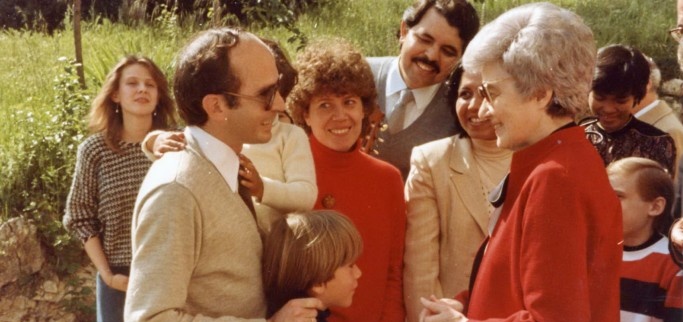
Mar 4, 2017 | Non categorizzato
 (…) Jesus said, “For where two or three are gathered together in my name,” (which means in my love), “there am I in the midst of them” (Mt. 18:30). Becoming the dwelling place of God’s presence is a splendid possibility offered also to families. A family that lives in this way is actively involved in all that happens around it. Simply by being what it is, it can witness, proclaim and therefore heal the social fabric around it, because life in itself speaks and works. I have seen from experience that this kind of family is able to open home and heart to the urgent needs and issues in society and to various forms of loneliness and alienation. They can even practice and organize solidarity in ever-widening circles, to the point of promoting effective actions to influence institutions, block wrongful laws and measures, and guide politicians. Through the presence and activity of its members in the various sectors of society, the family is also able to enter into dialogue with institutions, channelling resources towards real needs, creating awareness and the necessary conditions for improved policies in favour of the family and fostering public opinion based on values. I believe that nothing could be more beautiful than families like this. Because, let’s ask ourselves, what do people really want? They want happiness. Where do they seek happiness? In love, in beauty, and they are willing to do anything to obtain it. In these families, there is the fullness of human love and the beauty of supernatural love. I have seen families like this, and they are truly wonderful. Everyone finds them fascinating. From the outside, they look like any other family, but they have a secret, a secret of love. “Suffering that is loved” unites them to Christ who dwells in their homes. He is attracted by the mutual love that unites them, and through these families, he is transforming the world. I wanted to share these thoughts with you, which come from the depths of my heart and from the experience of many families. I would like to encourage all of us to greater practical engagement in doing everything possible for the true good of the family. In fact, the health of the first cell of society is of the utmost importance for the future of all humanity. The great Catholic writer Igino Giordani wrote: “To save the family means to save society. The state is made up mostly of families. If families break down, society weakens.” He also said, “Married couples become God’s collaborators in giving life and love to humanity… Love extends outwards from the family to professional life, to the city, the nation and humanity. It is like a wave opening in ever-widening circles, onwards to infinity. For two thousand years there has been a restless longing, set in motion by the Gospel, it calls for love.” Chiara Lubich Watch the complete video
(…) Jesus said, “For where two or three are gathered together in my name,” (which means in my love), “there am I in the midst of them” (Mt. 18:30). Becoming the dwelling place of God’s presence is a splendid possibility offered also to families. A family that lives in this way is actively involved in all that happens around it. Simply by being what it is, it can witness, proclaim and therefore heal the social fabric around it, because life in itself speaks and works. I have seen from experience that this kind of family is able to open home and heart to the urgent needs and issues in society and to various forms of loneliness and alienation. They can even practice and organize solidarity in ever-widening circles, to the point of promoting effective actions to influence institutions, block wrongful laws and measures, and guide politicians. Through the presence and activity of its members in the various sectors of society, the family is also able to enter into dialogue with institutions, channelling resources towards real needs, creating awareness and the necessary conditions for improved policies in favour of the family and fostering public opinion based on values. I believe that nothing could be more beautiful than families like this. Because, let’s ask ourselves, what do people really want? They want happiness. Where do they seek happiness? In love, in beauty, and they are willing to do anything to obtain it. In these families, there is the fullness of human love and the beauty of supernatural love. I have seen families like this, and they are truly wonderful. Everyone finds them fascinating. From the outside, they look like any other family, but they have a secret, a secret of love. “Suffering that is loved” unites them to Christ who dwells in their homes. He is attracted by the mutual love that unites them, and through these families, he is transforming the world. I wanted to share these thoughts with you, which come from the depths of my heart and from the experience of many families. I would like to encourage all of us to greater practical engagement in doing everything possible for the true good of the family. In fact, the health of the first cell of society is of the utmost importance for the future of all humanity. The great Catholic writer Igino Giordani wrote: “To save the family means to save society. The state is made up mostly of families. If families break down, society weakens.” He also said, “Married couples become God’s collaborators in giving life and love to humanity… Love extends outwards from the family to professional life, to the city, the nation and humanity. It is like a wave opening in ever-widening circles, onwards to infinity. For two thousand years there has been a restless longing, set in motion by the Gospel, it calls for love.” Chiara Lubich Watch the complete video
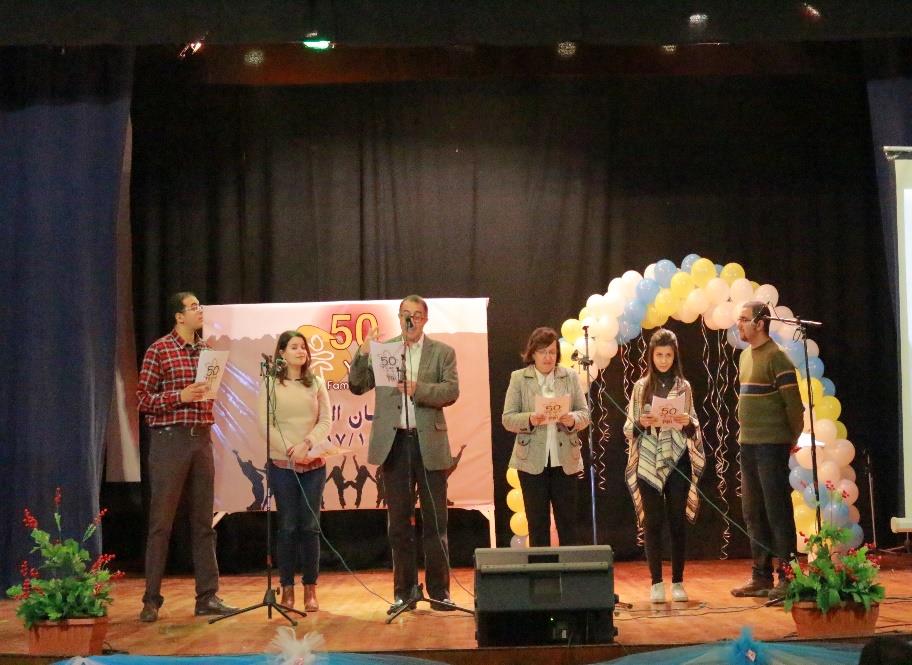
Mar 3, 2017 | Non categorizzato
Seven years have passed since the Arab Spring and the unforgettable Tahrir Square, symbol of all the squares of Egypt, Tunisia, Libya, Yemen, crowded with women, men and many youths forcefully invoking the demise of the autocratic regimes, respect of human rights, transparency, freedom of information and social justice. Seven long years in which Egypt, the historical and cultural reference point for the Arab world, has been marked by an unprecedented political crisis. There is still a strong internal instability, caused by sporadic outbreaks of terrorism, that have resulted in the drop of tourism and foreign investments. And despite the efforts of the government to invest in infrastructures (such as the inauguration of the new Suez canal) and heal its international relationships, the onset of the economic crisis is weighing heavily on the country’s 90 million inhabitants. The great urban areas are concentrated along the banks of the Nile (5% of the territory). Ten million are in the capital city of Cairo (which become 12 during the day), the second most populated African city. 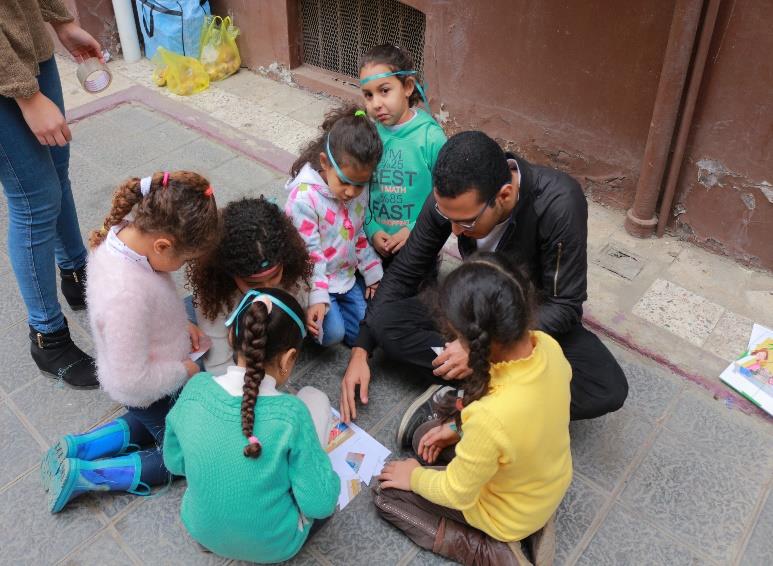 Immersed in this metropolis, the families that live the spirituality of the focolare, come from every social category and belong to various Christian churches. They have the same difficulties as all the others: growing unemployment, the crisis of parental roles in a society that is increasingly moving away from religious and social values and which is dazzling the new generation with the temptations of consumerism. Families that are trying however to go “against the current,” helping one another mutually and working hard to serve the schools, churches and institutions. The convention on the family entitled “Source of hope and joy” was held last 27 January, with the participation of about 300 people. It was a feast, with songs and dance, sharing sessions, moment of reflection on the theme of dialogue between husband and wife, parent-children relationships, suffering, illness, and divisions and difficulties of families. Many were testimonials of tangible love that heals suffering, like that that of Wagih and his wife, who suffered a stroke and is confined to a wheelchair; or that of a couple which, through dialogue, recomposed the pieces of their almost broken family; or that of another couple which understood that children not only need to be loved but above all, need parents who love one another.
Immersed in this metropolis, the families that live the spirituality of the focolare, come from every social category and belong to various Christian churches. They have the same difficulties as all the others: growing unemployment, the crisis of parental roles in a society that is increasingly moving away from religious and social values and which is dazzling the new generation with the temptations of consumerism. Families that are trying however to go “against the current,” helping one another mutually and working hard to serve the schools, churches and institutions. The convention on the family entitled “Source of hope and joy” was held last 27 January, with the participation of about 300 people. It was a feast, with songs and dance, sharing sessions, moment of reflection on the theme of dialogue between husband and wife, parent-children relationships, suffering, illness, and divisions and difficulties of families. Many were testimonials of tangible love that heals suffering, like that that of Wagih and his wife, who suffered a stroke and is confined to a wheelchair; or that of a couple which, through dialogue, recomposed the pieces of their almost broken family; or that of another couple which understood that children not only need to be loved but above all, need parents who love one another.  “The families of the focolare,” the letter from Cairo says, “give a great contribution to families also through the St. Joseph Institute and the Pro Vita, created in March 1994, incarnating the Gospel in family life and in the heart of society. The Institute engages in the preparation of young couples for marriage and as a family counseling service, with branches in various dioceses. They give strength and courage, amid many difficulties to couples also in the Muslim world. In these years the number of marriage annulment cases has dropped to the minimum, despite the great number of couples with problems that go for consultation. The Institute gives its contribution in the various events in the family sector, and represents the Holy See in the international conventions of the Muslim world.» The Koz Kazah Foundation has been active since 2007 in the Shubra community, one of the most populated districts of Cairo, and last 25 February, inaugurated a new office in Fagala. The aim is to work, in cooperation with AMU, on social projects, educational programmes for children at risk, create events to awaken the sense of belonging to one’s own city (cleaning of roads, murals, conferences, shows). In a society which, not only in Egypt, sees no reason for hope and joy, these constructive actions seem to emit the perfume of another spring. AMU: Project CHANCE FOR TOMORROW
“The families of the focolare,” the letter from Cairo says, “give a great contribution to families also through the St. Joseph Institute and the Pro Vita, created in March 1994, incarnating the Gospel in family life and in the heart of society. The Institute engages in the preparation of young couples for marriage and as a family counseling service, with branches in various dioceses. They give strength and courage, amid many difficulties to couples also in the Muslim world. In these years the number of marriage annulment cases has dropped to the minimum, despite the great number of couples with problems that go for consultation. The Institute gives its contribution in the various events in the family sector, and represents the Holy See in the international conventions of the Muslim world.» The Koz Kazah Foundation has been active since 2007 in the Shubra community, one of the most populated districts of Cairo, and last 25 February, inaugurated a new office in Fagala. The aim is to work, in cooperation with AMU, on social projects, educational programmes for children at risk, create events to awaken the sense of belonging to one’s own city (cleaning of roads, murals, conferences, shows). In a society which, not only in Egypt, sees no reason for hope and joy, these constructive actions seem to emit the perfume of another spring. AMU: Project CHANCE FOR TOMORROW
Mar 2, 2017 | Non categorizzato
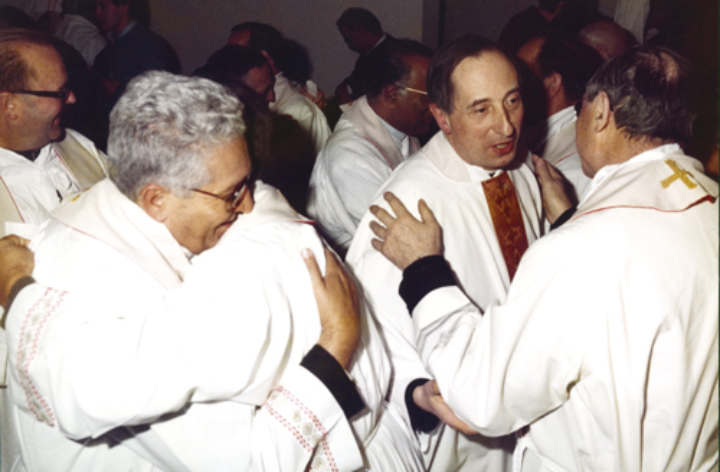
Mar 1, 2017 | Non categorizzato
 Klaus Hemmerle played an essential part alongside Chiara Lubich in introducing the life of communion among the bishops who follow the spirituality of unity. We present some passages taken from his book, Klaus Hemmerle, La luce dentro le cose (The Light Within Things,) published by Città Nuova (Rome, 1998). “Even after the radical conversion of our life that takes place once and for all in Baptism, all of us are unceasingly in need of converting. Even in those cases where the baptized does not separate from God, the claims that life makes on him and the temptations of daily life are likely to chain him to his own ego so much that the unique Word that the baptized has become thanks to the grace of Christ, sails along and is modified and cracks. The wound inflicted on God’s life in us is in constant need of healing” (p 82). “Forgive us our debts as we forgive our debtors.” Jesus is a realist. He knows our weaknesses. He never judges, nor does he ever say: Whatever way you live is the same. He calls us to repentance, to conversion, to constantly begin again. He forgives us and invites us to forgive others. Our friendship with him runs aground if our life is not this constant conversion” (p 73). “For each one of us, today, a cross is waiting that we are to carry along with us.” But it has to be carried this very day! Otherwise it is the cross that carries us, and then we feel totally oppressed, tormented and annihilated, and we never realize that it was the cross that carried us away. But if we ourselves have the courage to take up the cross, then it becomes the most precious thing in the world” (p 89). “When the disciples see the great and powerful God in Jesus, they are not able to find him. They have to bow down to the ground, to look into the dust: Jesus is there, washing the feet of those who are his own. Self-giving, abasement, service, mature awareness of the banality of human needs, becoming little, renouncing, the endurance of total giving, not appearing, hiddenness – all of these qualities that have absolutely nothing to do with the radiant splendour of God, lie at the deepest central core of the cult and worship we offer to God – the Eucharist” (p 101). “Someone like me who continues to fail every time, cannot but live on God’s forgiveness. But this forgiveness proves itself in fraternal pardon. This is the underlying substance of God’s forgiveness, it rebounds onto the community in which we link up to that mercy that makes us ever free and new so that we can be sons of the Father with the Lord, the only Lord – in the midst of them” (p 74).
Klaus Hemmerle played an essential part alongside Chiara Lubich in introducing the life of communion among the bishops who follow the spirituality of unity. We present some passages taken from his book, Klaus Hemmerle, La luce dentro le cose (The Light Within Things,) published by Città Nuova (Rome, 1998). “Even after the radical conversion of our life that takes place once and for all in Baptism, all of us are unceasingly in need of converting. Even in those cases where the baptized does not separate from God, the claims that life makes on him and the temptations of daily life are likely to chain him to his own ego so much that the unique Word that the baptized has become thanks to the grace of Christ, sails along and is modified and cracks. The wound inflicted on God’s life in us is in constant need of healing” (p 82). “Forgive us our debts as we forgive our debtors.” Jesus is a realist. He knows our weaknesses. He never judges, nor does he ever say: Whatever way you live is the same. He calls us to repentance, to conversion, to constantly begin again. He forgives us and invites us to forgive others. Our friendship with him runs aground if our life is not this constant conversion” (p 73). “For each one of us, today, a cross is waiting that we are to carry along with us.” But it has to be carried this very day! Otherwise it is the cross that carries us, and then we feel totally oppressed, tormented and annihilated, and we never realize that it was the cross that carried us away. But if we ourselves have the courage to take up the cross, then it becomes the most precious thing in the world” (p 89). “When the disciples see the great and powerful God in Jesus, they are not able to find him. They have to bow down to the ground, to look into the dust: Jesus is there, washing the feet of those who are his own. Self-giving, abasement, service, mature awareness of the banality of human needs, becoming little, renouncing, the endurance of total giving, not appearing, hiddenness – all of these qualities that have absolutely nothing to do with the radiant splendour of God, lie at the deepest central core of the cult and worship we offer to God – the Eucharist” (p 101). “Someone like me who continues to fail every time, cannot but live on God’s forgiveness. But this forgiveness proves itself in fraternal pardon. This is the underlying substance of God’s forgiveness, it rebounds onto the community in which we link up to that mercy that makes us ever free and new so that we can be sons of the Father with the Lord, the only Lord – in the midst of them” (p 74).

Feb 28, 2017 | Focolare Worldwide
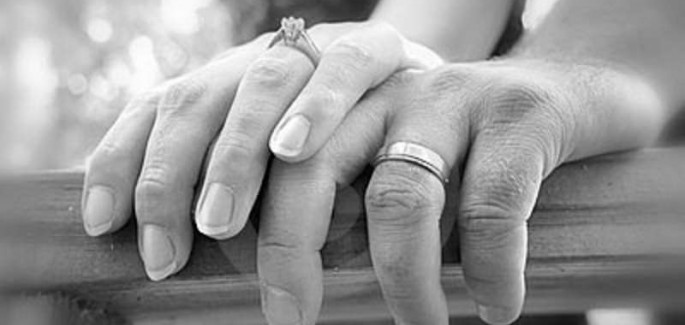 Federico: An Italian and Uruguayan: what are the chances? Yet we happened to meet, seven years ago, at a Latin American center in Rome. I was there to give a hand running things, she to speak her language a bit. Our eyes met and we started to build a home together. Economic constraints, however, pushed us to leave the big city for my parents’ small village, especially because one of our greatest wishes was about to come true: our son was on the way. There was much happiness, but the stress of the birth and the rapid life changes didn’t give us any time to breathe. Laura: As if that were not enough, my mother, who was taking care of my invalid father and my little brother, became seriously ill. I needed to immediately go to Uruguay for at least a couple of months, especially because time was running out for my mother to get to know our little one. In the meantime, Federico and I were living on two different planets: me shut in at home with the child, he always out to escape the tension between us. Whenever our eyes met there was only anger, exhaustion, misunderstanding. As I left I told him, “When I come back, we’re either going to break up or stay together forever.” Federico: Our hearts became as distant as the physical separation. The months flew by, she didn’t return, and I found myself on a different path. To be honest with her, I felt I had to tell her that I didn’t want to get back together and that perhaps she should stay there where she was. Laura: It hurt a lot, even though I expected it. I gathered my strength, put aside my suffering and decided to return to Italy, knowing that I had little chance. In fact, when I got back home, he didn’t want to hear anything about living with me. Federico: One day I confided to my brother what was happening, and he told me about a couple that had a lot of experience who could help us. The idea didn’t seem that convincing at all, but in the end, for the good of the child, I accepted. “Perhaps they can help us separate without touching off a war,” I said to myself. It was an afternoon at the end of May. In the garden where we met, the cherries were ripe, and everything spoke of hope and peace. Yet in our hearts opposing feelings were rebelling. The man’s strong handshake and the delicate face of his wife gave me shivers along my spine. I saw that Laura, too, was moved. We talked with them for a half-hour. That night I left behind everything and returned home. As I entered, tears ran down my face, but my soul seemed to fly. Maybe I could do this!
Federico: An Italian and Uruguayan: what are the chances? Yet we happened to meet, seven years ago, at a Latin American center in Rome. I was there to give a hand running things, she to speak her language a bit. Our eyes met and we started to build a home together. Economic constraints, however, pushed us to leave the big city for my parents’ small village, especially because one of our greatest wishes was about to come true: our son was on the way. There was much happiness, but the stress of the birth and the rapid life changes didn’t give us any time to breathe. Laura: As if that were not enough, my mother, who was taking care of my invalid father and my little brother, became seriously ill. I needed to immediately go to Uruguay for at least a couple of months, especially because time was running out for my mother to get to know our little one. In the meantime, Federico and I were living on two different planets: me shut in at home with the child, he always out to escape the tension between us. Whenever our eyes met there was only anger, exhaustion, misunderstanding. As I left I told him, “When I come back, we’re either going to break up or stay together forever.” Federico: Our hearts became as distant as the physical separation. The months flew by, she didn’t return, and I found myself on a different path. To be honest with her, I felt I had to tell her that I didn’t want to get back together and that perhaps she should stay there where she was. Laura: It hurt a lot, even though I expected it. I gathered my strength, put aside my suffering and decided to return to Italy, knowing that I had little chance. In fact, when I got back home, he didn’t want to hear anything about living with me. Federico: One day I confided to my brother what was happening, and he told me about a couple that had a lot of experience who could help us. The idea didn’t seem that convincing at all, but in the end, for the good of the child, I accepted. “Perhaps they can help us separate without touching off a war,” I said to myself. It was an afternoon at the end of May. In the garden where we met, the cherries were ripe, and everything spoke of hope and peace. Yet in our hearts opposing feelings were rebelling. The man’s strong handshake and the delicate face of his wife gave me shivers along my spine. I saw that Laura, too, was moved. We talked with them for a half-hour. That night I left behind everything and returned home. As I entered, tears ran down my face, but my soul seemed to fly. Maybe I could do this!  Laura: When I saw Federico come back I couldn’t believe it. Our next appointment with that couple was at Loppiano (near Florence), where we met other friends of theirs, couples who were having difficulties like us. But the change in us had already begun. At the course organized by New Families of the Focolare Movement, the first thing they talked to us about – almost like a game – was the Japanese art of kintsugi, where a broken ceramic vase is not thrown away, but glued together with gold. Doing so, it becomes even more valuable. The new atmosphere we were breathing in there was renewing us without us realizing it. We understood that forgiveness was the gold that could put us together again, and we asked it of each other. We found the strength to give of ourselves to each other. Federico: It was a mix of the spirituality of unity, which the course was based on; advice from experts; and the support from the other couples that strengthened our desire to be reborn again as a couple and gave us a fundamental push to change. Ever since, each day we tell each other that we’re ready to start again, without taking anything for granted and making the effort to step in each other’s shoes. Laura: After two years we got to the point where we were able to make an important decision: to get married in Church, so that Love par excellence could watch over our life together and continue flowing forever. Now we are expecting our second child in July. Truly the love of God knew how to write straight on our crooked lines!
Laura: When I saw Federico come back I couldn’t believe it. Our next appointment with that couple was at Loppiano (near Florence), where we met other friends of theirs, couples who were having difficulties like us. But the change in us had already begun. At the course organized by New Families of the Focolare Movement, the first thing they talked to us about – almost like a game – was the Japanese art of kintsugi, where a broken ceramic vase is not thrown away, but glued together with gold. Doing so, it becomes even more valuable. The new atmosphere we were breathing in there was renewing us without us realizing it. We understood that forgiveness was the gold that could put us together again, and we asked it of each other. We found the strength to give of ourselves to each other. Federico: It was a mix of the spirituality of unity, which the course was based on; advice from experts; and the support from the other couples that strengthened our desire to be reborn again as a couple and gave us a fundamental push to change. Ever since, each day we tell each other that we’re ready to start again, without taking anything for granted and making the effort to step in each other’s shoes. Laura: After two years we got to the point where we were able to make an important decision: to get married in Church, so that Love par excellence could watch over our life together and continue flowing forever. Now we are expecting our second child in July. Truly the love of God knew how to write straight on our crooked lines!

Feb 27, 2017 | Non categorizzato

Watercolour © A.M Baumgarten
Feb 27, 2017 | Non categorizzato, Word of
for ages 4-8 | for ages 9-14 | for ages 15-17 | MP3 Audio | Print
We can live like the first Christians and witness in our lives to God’s overwhelming love. If we, his followers, are truly reconciled among ourselves, we can speak convincingly of God’s reconciling love for the world. “Be reconciled to God” (2 Cor 5:20). All over the world, there are blood-soaked wars. They seem endless, and they embroil families, tribes and peoples. Twenty-year-old Gloria told this story: “We got news of a village that’d been burnt down. Lots of people lost everything. With my friends I collected some useful things: mattresses, clothes, food. We set out and after an eight hour journey we met all those people in such terrible need. We listened to them, dried their tears, hugged them and tried to comfort them. One family told us, ‘Our little girl was in the house they burnt down. It felt like we were dying with her. Now, through your love, we have the strength to forgive the men who did this!’” The Apostle Paul also experienced this kind of forgiveness, and it completely changed his life. He, the very one who was persecuting Christians,1 met God’s free-given love. It came in a completely unexpectedly way as he was travelling. God then sent him out in his name 2 as an ambassador of reconciliation. This is how Paul became a passionate and credible witness to the mystery of Jesus who died and rose again. He spoke of Jesus who had reconciled the world to himself so that everyone could know and experience a life of communion with him and one another.3 Through Paul the Gospel message reached and fascinated even pagans, those thought to be furthest from salvation: “Be reconciled to God!” he said. Despite our failings that discourage us or the false certainties that fool us into thinking we have no need, we too can meet God’s mercy. His love is so excessive! We can let it heal our hearts and in the end set us free to share this treasure with others. Like this we will give our contribution to God’s plan of peace for all humanity and the whole of creation. This plan overcomes the contradictions of history, as Chiara Lubich suggests in this passage: “On the cross, in the death of his Son, God gave us the highest proof of his love. Through Christ’s cross, he reconciled us to himself. This fundamental truth of our faith is fully relevant today. “It is the revelation all humankind awaits. Yes, God is close to all people with his love and he loves each person passionately. Our world needs to hear this proclamation, but we can proclaim God’s love if first we proclaim it, again and again, to ourselves — until we feel surrounded by this love, even when everything would make us think the opposite.… All our behaviour should make this truth credible. “Jesus said clearly that before bringing our offering to the altar we should be reconciled with a brother or sister if they have anything against us (see Mt 5:23-24) … So let’s love one another as he loved us, without being closed or prejudiced, but being open to welcome and appreciate the positive in our neighbour, ready to give our lives for one another. This is Jesus’ main command, the mark of Christians, valid today just as it was at the time of Christ’s first followers. Living this word means becoming reconcilers.” Living like this we will enrich our days with acts of friendship and reconciliation: in our own family and among families, in our own Church and among Churches, in every civil and religious community to which we belong. Letizia Magri
- See Acts 22:4 ff.
- See 2 Cor 5:
- See Eph 2:13 f
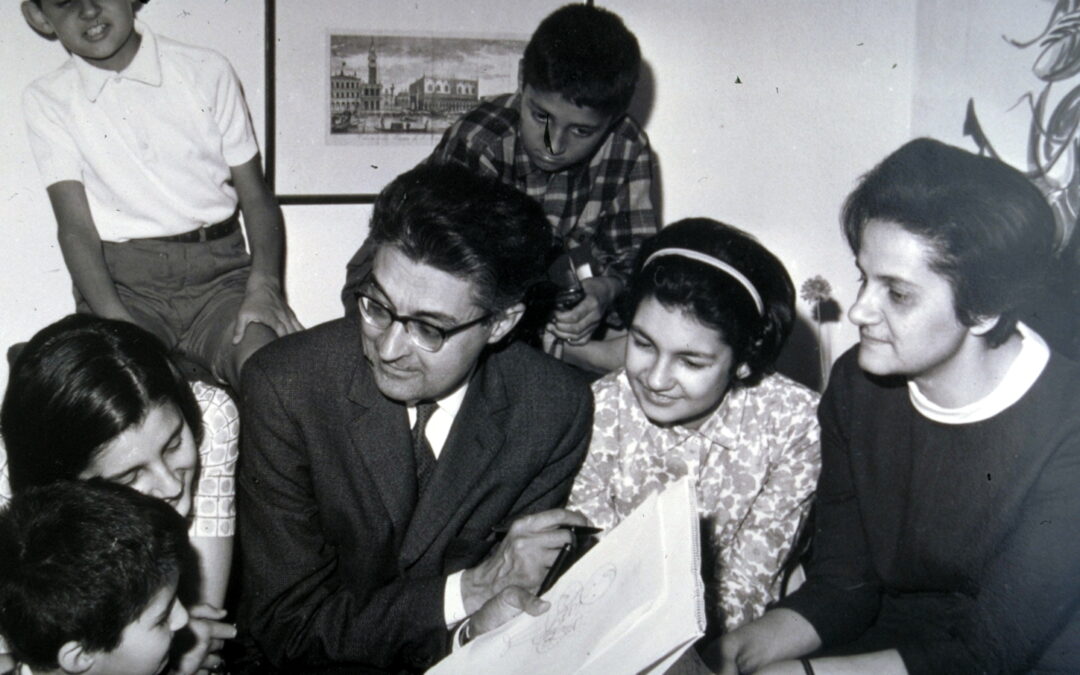
Feb 26, 2017 | Non categorizzato
 How important was it for you to meet Chiara Lubich, what impact did it have on you and your family, and what were the effects of your relationship with her and her spirituality? Danilo: “In the environment where Anna Maria and I were raised, traditional customs were of great importance. The family was present, but it was united more often due to social customs. Upon meeting Chiara we understood that being Christians entailed a choice, above all. That’s why we suffered a lot to free ourselves from the mentality of those times, and the attachment to our roles, circles, and professional titles. I had undertaken the career of an engineer, but to live the Gospel completely, we started to host the poor, and practice the communion of goods. All these things were a scandal, since they broke away from the customs of a bourgeois city. So my parents didn’t understand our decisions and were against them. I remember that once, I had gone to speak in a mountain town since I was also the diocesan president of the Catholic men. I was suffering and torn inside. Right after that I went to Church and found myself before a statue of Jesus Forsaken. I immediately and clearly understood that facing such painful moments is also part of our being Christians.”
How important was it for you to meet Chiara Lubich, what impact did it have on you and your family, and what were the effects of your relationship with her and her spirituality? Danilo: “In the environment where Anna Maria and I were raised, traditional customs were of great importance. The family was present, but it was united more often due to social customs. Upon meeting Chiara we understood that being Christians entailed a choice, above all. That’s why we suffered a lot to free ourselves from the mentality of those times, and the attachment to our roles, circles, and professional titles. I had undertaken the career of an engineer, but to live the Gospel completely, we started to host the poor, and practice the communion of goods. All these things were a scandal, since they broke away from the customs of a bourgeois city. So my parents didn’t understand our decisions and were against them. I remember that once, I had gone to speak in a mountain town since I was also the diocesan president of the Catholic men. I was suffering and torn inside. Right after that I went to Church and found myself before a statue of Jesus Forsaken. I immediately and clearly understood that facing such painful moments is also part of our being Christians.”
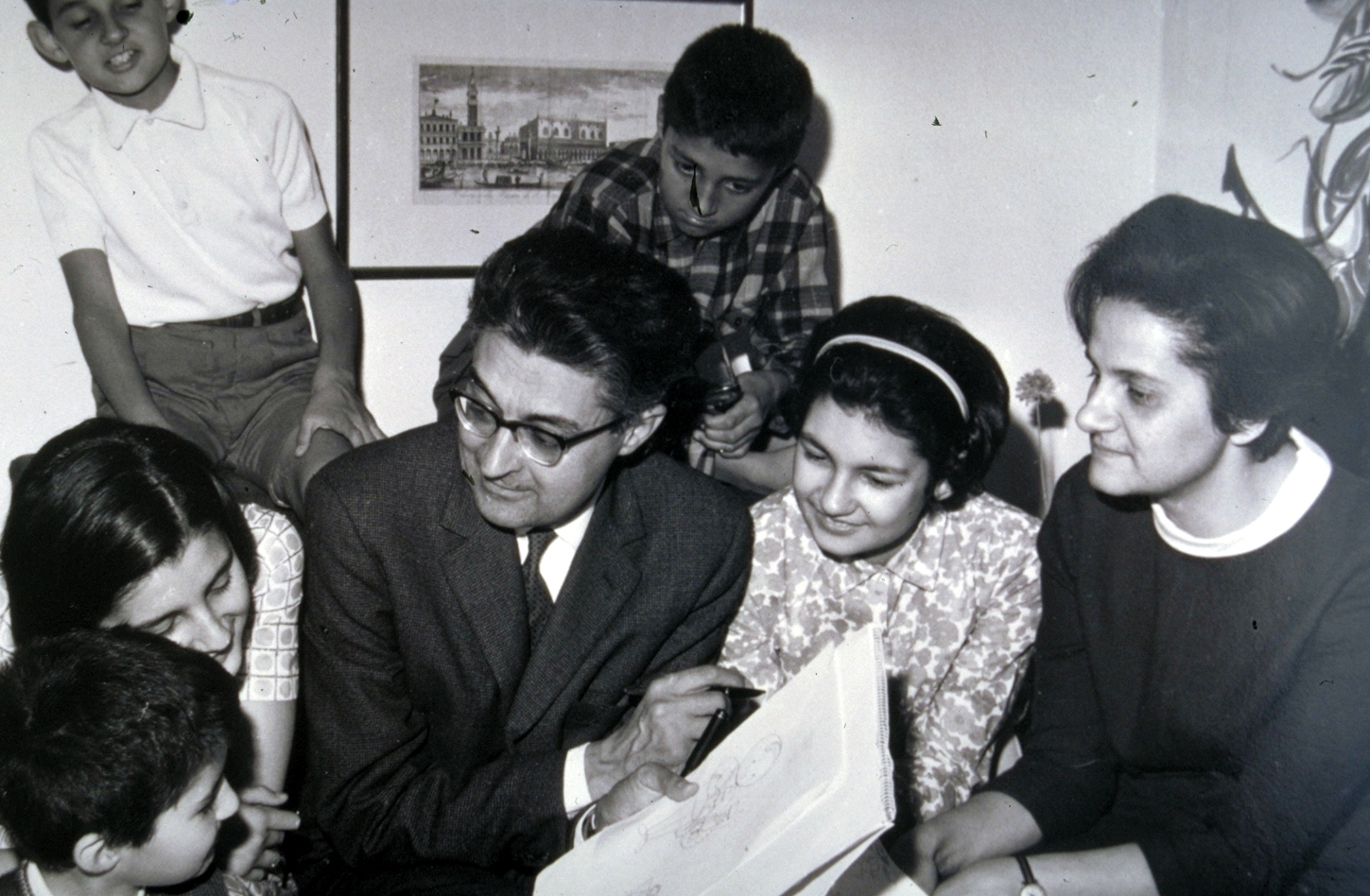
The Zanzucchi family
Giovanna Pieroni
![Interreligious friendships in England]()
Feb 25, 2017 | Non categorizzato
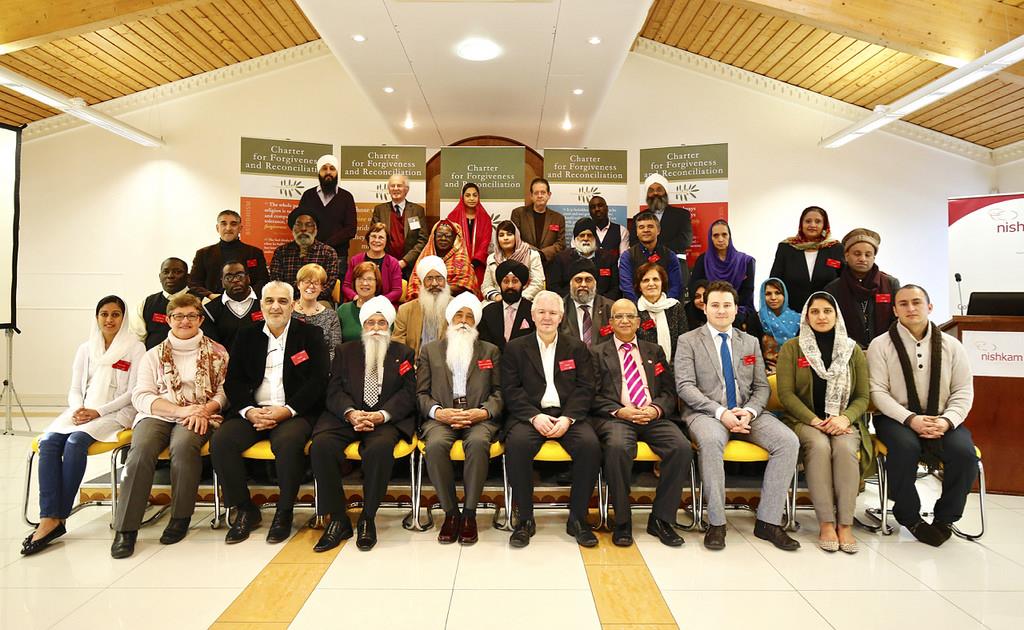 Birmingham is a multi-ethnic city of central England where the presence of different religions and cultures has become a breeding ground for dialogue. The city itself is a laboratory of interreligious relationships based on mutual respect and the discovery of each other’s values. Catholic Archbishop Bernard Longley, along with the council of religious leaders of other faiths in Birmingham, is directly involved in the interreligious field and more than once has expressed the desire that the Charism of Unity might bring a contribution in the Church and in ecumenical and interreligious dialogue. In October 2015, he made a house available to the Focolare in the diocese of Birmingham. Now, members from the community in Welwyn Garden City carry out many initiatives on a bi-monthly basis. They began with the Gen Verde international band’s “Start Now” project and continue carrying out many other initiatives.
Birmingham is a multi-ethnic city of central England where the presence of different religions and cultures has become a breeding ground for dialogue. The city itself is a laboratory of interreligious relationships based on mutual respect and the discovery of each other’s values. Catholic Archbishop Bernard Longley, along with the council of religious leaders of other faiths in Birmingham, is directly involved in the interreligious field and more than once has expressed the desire that the Charism of Unity might bring a contribution in the Church and in ecumenical and interreligious dialogue. In October 2015, he made a house available to the Focolare in the diocese of Birmingham. Now, members from the community in Welwyn Garden City carry out many initiatives on a bi-monthly basis. They began with the Gen Verde international band’s “Start Now” project and continue carrying out many other initiatives. 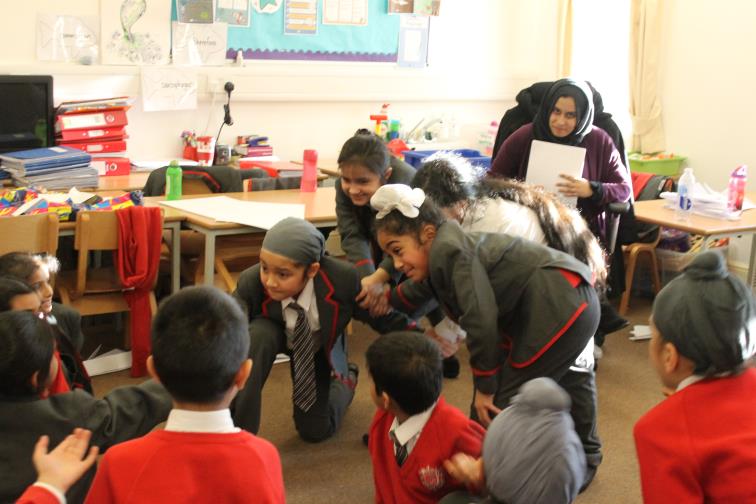 Last January, a Volunteer from the Focolare Movement, who is an expert in the field of education, ran the first of 4 workshops in a Sikh school for 70 children between the ages of 7 and 8. The theme was values. “The Sikhs feel a strong bond with us,” she recounts. “They say that like you, we try to model a society based on the fusion between the human and the divine. They find a harmony in the Movement that helps them to deepen their values and put them into practice.” The project is the culmination of a long friendship. For years the Sikh community guided by Bhi Sahib Bhai Mohinder Singh has been constantly linked to the Focolare community in Birmingham. The friendship and mutual esteem is deepening. “Bhai Sahib Ji often tells us that Chiara Lubich is his inspiration,” a Focolare member writes. “He keeps a photo of her on his desk.”
Last January, a Volunteer from the Focolare Movement, who is an expert in the field of education, ran the first of 4 workshops in a Sikh school for 70 children between the ages of 7 and 8. The theme was values. “The Sikhs feel a strong bond with us,” she recounts. “They say that like you, we try to model a society based on the fusion between the human and the divine. They find a harmony in the Movement that helps them to deepen their values and put them into practice.” The project is the culmination of a long friendship. For years the Sikh community guided by Bhi Sahib Bhai Mohinder Singh has been constantly linked to the Focolare community in Birmingham. The friendship and mutual esteem is deepening. “Bhai Sahib Ji often tells us that Chiara Lubich is his inspiration,” a Focolare member writes. “He keeps a photo of her on his desk.” 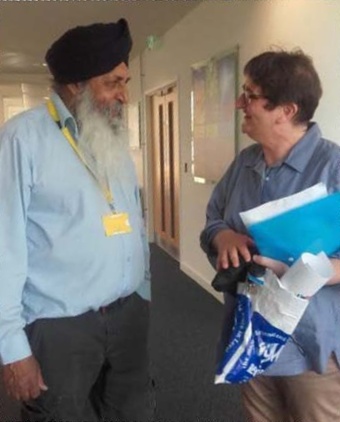 Sikhs and members of the Focolare recently took part together in an interreligious conference. Bhai Sahib Ji presented a project for promoting forgiveness and reconciliation. The event was an opportunity to strengthen friendships between members of different religions and beliefs, who now continue to stay in contact.
Sikhs and members of the Focolare recently took part together in an interreligious conference. Bhai Sahib Ji presented a project for promoting forgiveness and reconciliation. The event was an opportunity to strengthen friendships between members of different religions and beliefs, who now continue to stay in contact. 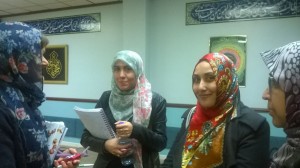 Still in January, Dr Mohammad Shomali, Founding Director of the International Institute for Islamic Studies in Qum, invited several men and women focolarini to speak to a group of thirty Muslims at a mosque in on one of the quarters of Birmingham. His desire was to “put together the people he esteems and loves the most: his community and the Focolare.” The Church’s dialogue with Islam was discussed, and the Spirituality of Unity was proposed, along with the presentation of a few experiences of living the Word. Many Muslims remained enthusiastic and want to stay in contact with the Focolare. “They invited us back on Sunday for the ‘Visit My Mosque’ event,” they report. They conclude: “Over the past weeks in which we have made many new friends of other faiths, we remembered a letter that Chiara wrote on November 23,1980 where she said: ‘…and if there is a mosque, or a synagogue, or some other non-Christian house of worship – know that that is where you belong…’ It’s a project about building the universal family, also among the faithful of other religions.”
Still in January, Dr Mohammad Shomali, Founding Director of the International Institute for Islamic Studies in Qum, invited several men and women focolarini to speak to a group of thirty Muslims at a mosque in on one of the quarters of Birmingham. His desire was to “put together the people he esteems and loves the most: his community and the Focolare.” The Church’s dialogue with Islam was discussed, and the Spirituality of Unity was proposed, along with the presentation of a few experiences of living the Word. Many Muslims remained enthusiastic and want to stay in contact with the Focolare. “They invited us back on Sunday for the ‘Visit My Mosque’ event,” they report. They conclude: “Over the past weeks in which we have made many new friends of other faiths, we remembered a letter that Chiara wrote on November 23,1980 where she said: ‘…and if there is a mosque, or a synagogue, or some other non-Christian house of worship – know that that is where you belong…’ It’s a project about building the universal family, also among the faithful of other religions.”
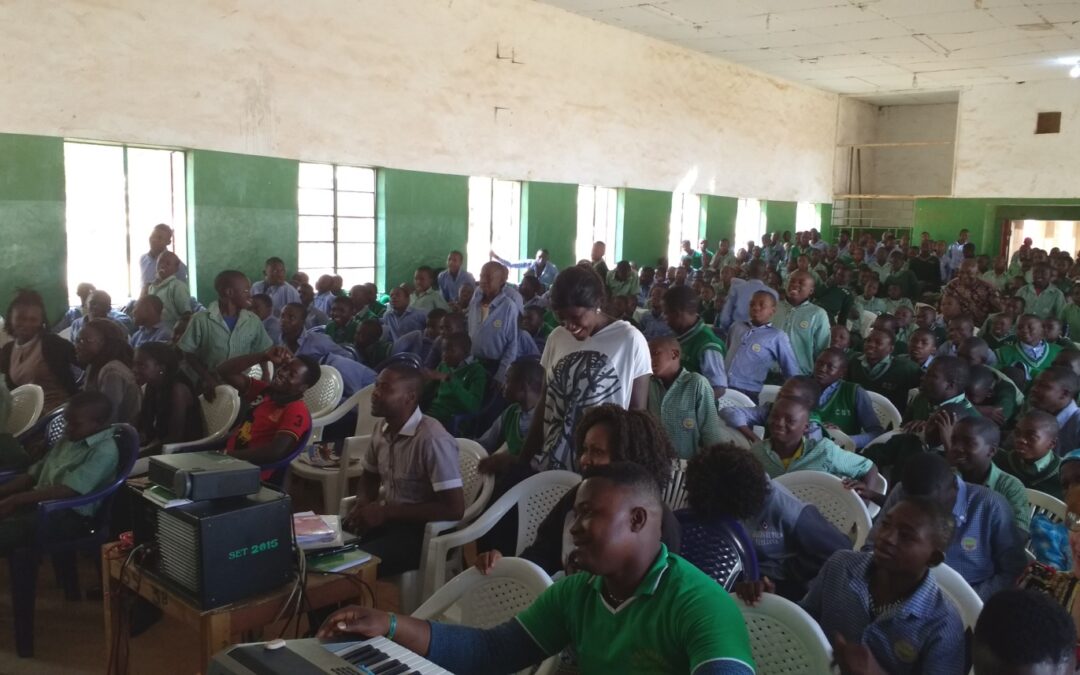
Feb 24, 2017 | Focolare Worldwide
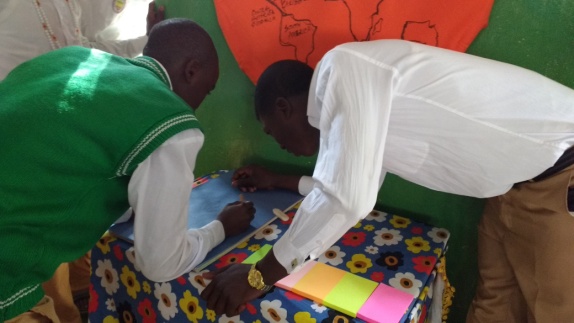 For three days, St Joseph’s College transformed into a fraternity experiment. The young students, ages 9 to 18, lived side by side with their professors, their families, as well as many other young people, adults and elderly from other cities. The Mariapolis was organised by members of the local Jos community, as well as other communities like that of Abuja (4 hours away) and Onitsa (12). There were also some young people of the Focolare from Lagos. In Nigeria, a country of seemingly limitless expanses, long trips bristling with danger often need to be overcome. Yet this did not stop anyone from supporting the Mariapolis at St. Joseph’s. The school opened its gates to welcome the young and not so young, students, teachers, workers. Among the Mariapolites was John Maigari, who had once attended and taught at the school. Now retired, Maigari also previously headed the diocese’s department of education. Many years prior he himself had experienced Mariapolis life, where each person sees each other as family to love and to serve. Now after many years, the professor hoped that the students could experience that same lifestyle. His proposal was welcomed.
For three days, St Joseph’s College transformed into a fraternity experiment. The young students, ages 9 to 18, lived side by side with their professors, their families, as well as many other young people, adults and elderly from other cities. The Mariapolis was organised by members of the local Jos community, as well as other communities like that of Abuja (4 hours away) and Onitsa (12). There were also some young people of the Focolare from Lagos. In Nigeria, a country of seemingly limitless expanses, long trips bristling with danger often need to be overcome. Yet this did not stop anyone from supporting the Mariapolis at St. Joseph’s. The school opened its gates to welcome the young and not so young, students, teachers, workers. Among the Mariapolites was John Maigari, who had once attended and taught at the school. Now retired, Maigari also previously headed the diocese’s department of education. Many years prior he himself had experienced Mariapolis life, where each person sees each other as family to love and to serve. Now after many years, the professor hoped that the students could experience that same lifestyle. His proposal was welcomed. 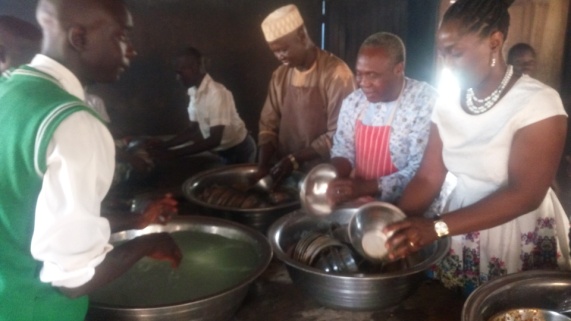 For three days, the school completely changed. Moments of reflection and going in depth were joined with tangible experiences. Divided into groups, students of different ages lived side by side with teachers and those attending, sharing the various moments of the day: cooking, washing dishes, tidying up the meeting hall, cleaning toilets and the school playground. For some it was their first time; they had never done anything like it. Even the school’s principal washed dishes! A large book was prepared for the students to capture their comments. It tells of three days of true living. The retreat changed their lives, they say. “The unity we lived during those days struck us from the very first moment that you set foot in our school.” It was a unity that the words of Chiara Lubich and the witness of the Focolare members had transmitted to them.
For three days, the school completely changed. Moments of reflection and going in depth were joined with tangible experiences. Divided into groups, students of different ages lived side by side with teachers and those attending, sharing the various moments of the day: cooking, washing dishes, tidying up the meeting hall, cleaning toilets and the school playground. For some it was their first time; they had never done anything like it. Even the school’s principal washed dishes! A large book was prepared for the students to capture their comments. It tells of three days of true living. The retreat changed their lives, they say. “The unity we lived during those days struck us from the very first moment that you set foot in our school.” It was a unity that the words of Chiara Lubich and the witness of the Focolare members had transmitted to them. 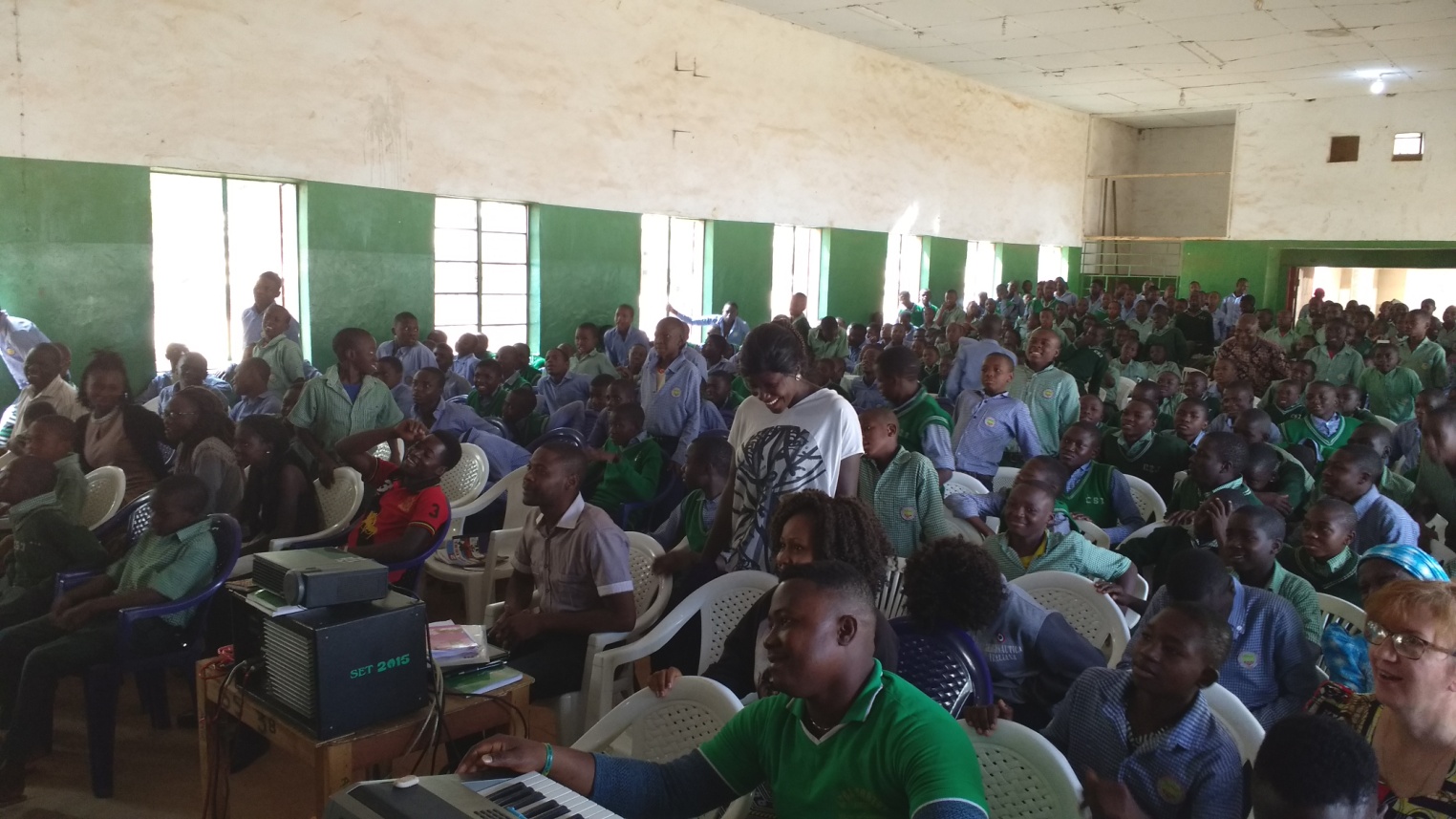 “I feel really happy and enthusiastic,” writes Nipps, “because these days were wonderful. I experienced many things and was particularly struck by the love and unity that the team of people who ran the program had between them.” “Before my life was incomplete,” says Keivin, “because I didn’t feel at all that God truly existed and was alive. Now I truly believe in God.” “This retreat wasn’t like the others,” adds Daong. “You ate with us and slept at our high school.” In this part of Nigeria, for years there have been many episodes of violence between Christians and Muslims, with seeds of hatred sown across the country. These young students also had lived through this. At the Mariapolis at Jos, they were able to experience an alternative: the firepower of God’s love and unity.
“I feel really happy and enthusiastic,” writes Nipps, “because these days were wonderful. I experienced many things and was particularly struck by the love and unity that the team of people who ran the program had between them.” “Before my life was incomplete,” says Keivin, “because I didn’t feel at all that God truly existed and was alive. Now I truly believe in God.” “This retreat wasn’t like the others,” adds Daong. “You ate with us and slept at our high school.” In this part of Nigeria, for years there have been many episodes of violence between Christians and Muslims, with seeds of hatred sown across the country. These young students also had lived through this. At the Mariapolis at Jos, they were able to experience an alternative: the firepower of God’s love and unity.
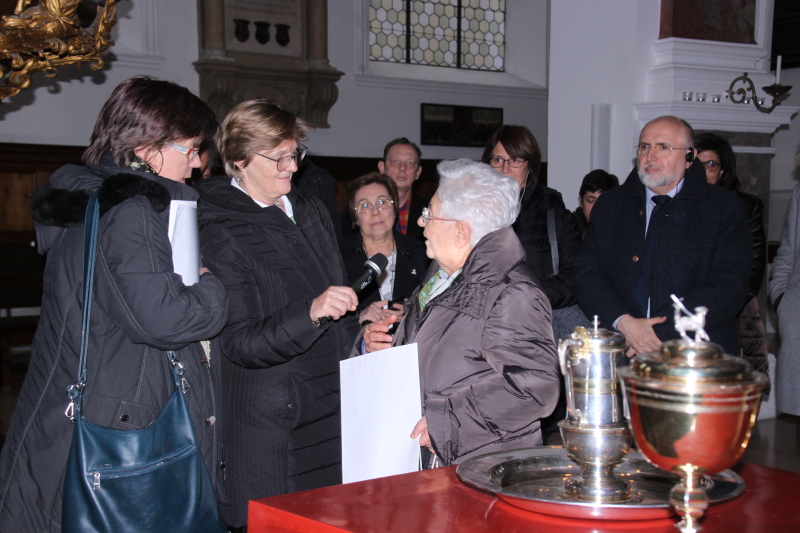
Feb 22, 2017 | Non categorizzato
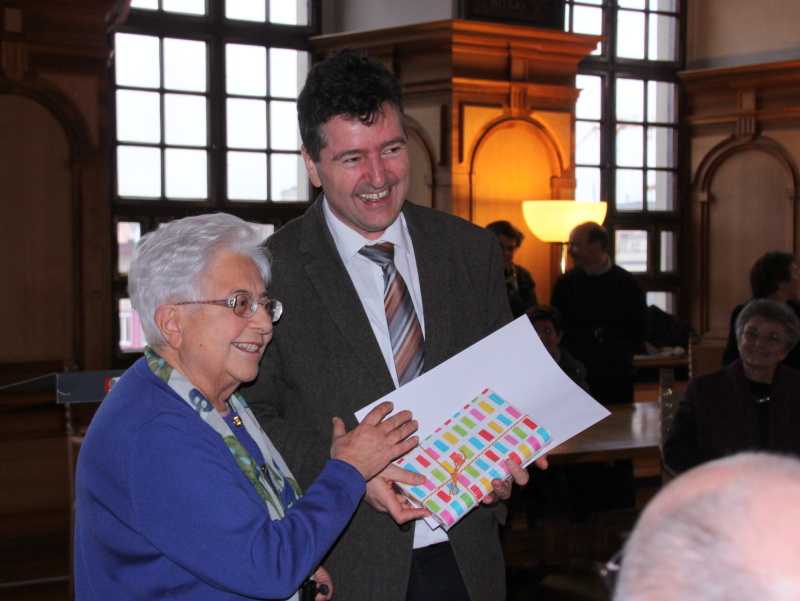
Maria Voce with the Vice-Mayor of Augsburg Dr Stefan Kiefer. Photo Maria Kny – © CSC Audiovisivi

Photo Maria Kny – © CSC Audiovisivi
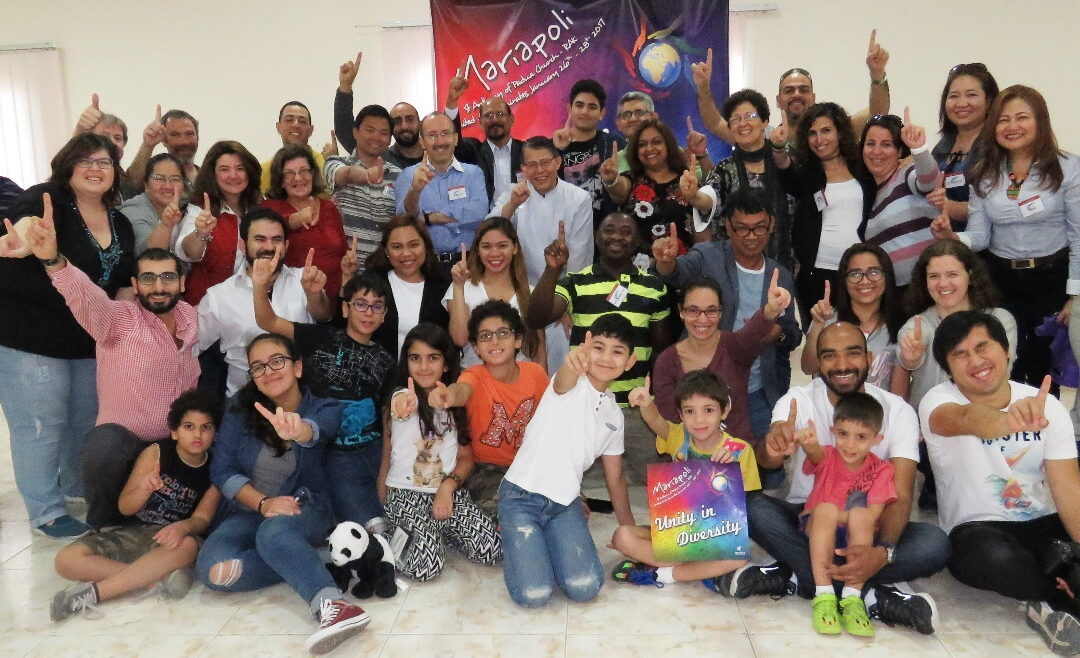
Feb 22, 2017 | Focolare Worldwide
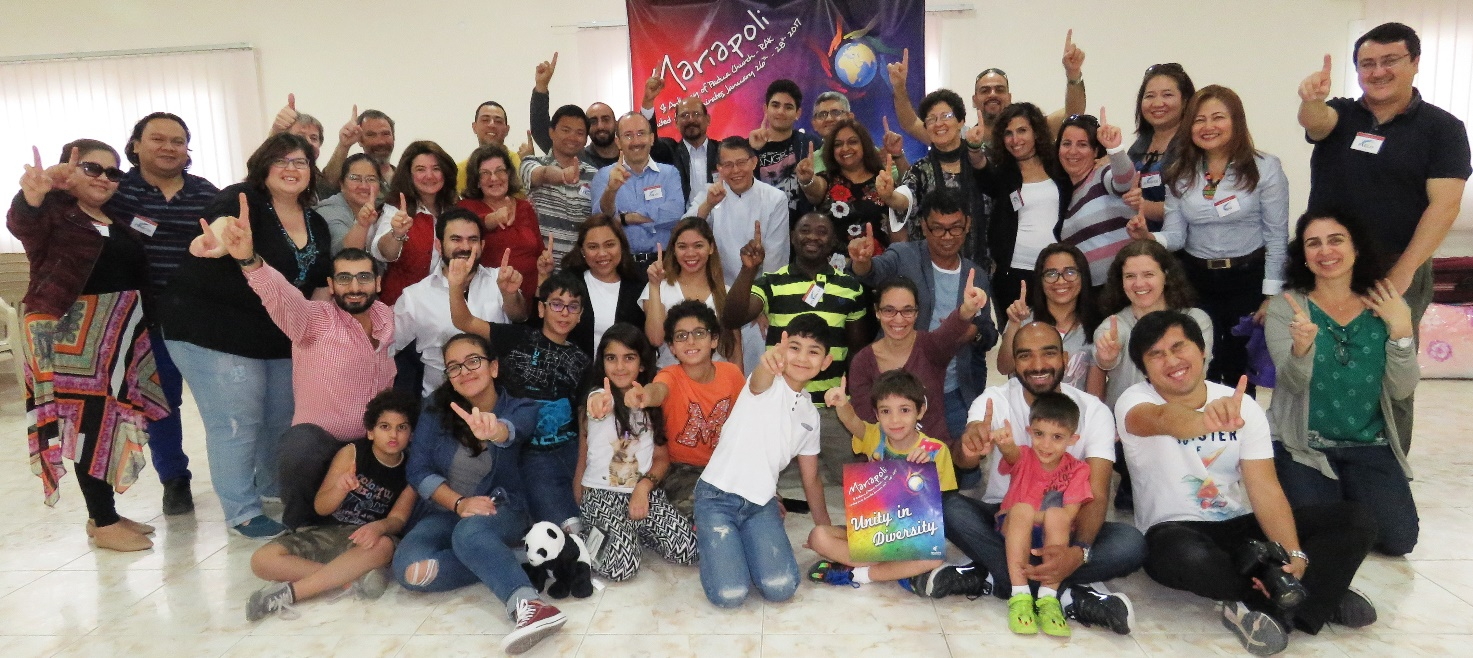 “We find ourselves here in countries of the United Arab Emirates due to work,” Claudia says. “Our workplaces are often strongly competitive, and it is difficult to integrate because there is little time for relationships that are simple and authentic. “The Catholic Church in Dubai is young, lively, joyous and not overly complicated. More than 2,000 faithful participate in and focus on daily mass – mostly from the Philippines, Pakistan and India. “Our local Focolare community is also made up mostly of migrants, and we try to give witness to the Gospel in the circles we move through, bringing love and unity around us. There are many who know about and live the spirituality of unity after first hearing about it in their home countries. We try to propose it to those whom we’re close to as a remedy to the frenetic, individualistic life here. “For us the monthly Word of Life meeting is fundamentally important. We read it together and try to go deeper into its meaning, sharing experiences that emerge from putting it into practice. “Maria Voce and Jesus Moran’s trip to India in January 2016 gave us a new drive to bring the ideal of unity to many, staying closely networked together.” “So we naturally involved all the people we’re in contact with to live the Mariapolis experience, which we took great care in preparing,” explains Amjad. “On January 27–28, 65 people from 12 countries (4 from the Middle East, the rest from Pakistan, the Philippines, Brazil, Japan, Italy and Cameroon) decided to come together at Ras Al Khaimah, an emirate near Dubai, to experience our first Mariapolis in these lands. “Emotions were running high! For some it seemed like a dream come true to finally get together after such a long time. We were welcomed by the parish of Father Willy, who is originally from the Philippines. The theme we chose, ‘Unity in diversity,’ reflected the reality and challenges that we all live through really well.” “What really struck me,” writes a young person from India,” was what we heard from Chiara Lubich about the ‘technique’ of building unity. Now I’d like to practice it.”“To discover how Jesus, in the moment he felt forsaken by the Father, can become a ‘key to unity’ in as much as I try to imitate him, filled me with hope,” said a woman from the Philippines. In a joyous atmosphere, participants were able to tell of their joys and difficulties, both in the hall and smaller groups, which is so important in order to share our lives together. There were moments to play, pray, and an intercultural evening to relax that included songs, video clips, skits and dances that involved everyone. “Special care was given to activities for the children, some of whom did not want to go back home,” says Claudia. “It was like an oasis,” explains Amjad, “where each of us found a family, with a spiritual presence of Jesus that is alive.” “During these past days, the fire of this ideal, which I got to know many years ago, was re-awakened,” confides a man from Brazil. “Now I want to give this fire to others.” Mia and Michel write: “It seemed to us that by the end, everyone returning to their countries or emirates, like Oman, Qatar, Bahrain, brought with them that ‘piece of fraternity’ that they had lived at the Mariapolis. Everyone evidently wanted to continue living this in their own environment, bringing hope to everyone. Now we keep connected through social media in a vibrant network, trying to help us live for each other, open to everyone.”
“We find ourselves here in countries of the United Arab Emirates due to work,” Claudia says. “Our workplaces are often strongly competitive, and it is difficult to integrate because there is little time for relationships that are simple and authentic. “The Catholic Church in Dubai is young, lively, joyous and not overly complicated. More than 2,000 faithful participate in and focus on daily mass – mostly from the Philippines, Pakistan and India. “Our local Focolare community is also made up mostly of migrants, and we try to give witness to the Gospel in the circles we move through, bringing love and unity around us. There are many who know about and live the spirituality of unity after first hearing about it in their home countries. We try to propose it to those whom we’re close to as a remedy to the frenetic, individualistic life here. “For us the monthly Word of Life meeting is fundamentally important. We read it together and try to go deeper into its meaning, sharing experiences that emerge from putting it into practice. “Maria Voce and Jesus Moran’s trip to India in January 2016 gave us a new drive to bring the ideal of unity to many, staying closely networked together.” “So we naturally involved all the people we’re in contact with to live the Mariapolis experience, which we took great care in preparing,” explains Amjad. “On January 27–28, 65 people from 12 countries (4 from the Middle East, the rest from Pakistan, the Philippines, Brazil, Japan, Italy and Cameroon) decided to come together at Ras Al Khaimah, an emirate near Dubai, to experience our first Mariapolis in these lands. “Emotions were running high! For some it seemed like a dream come true to finally get together after such a long time. We were welcomed by the parish of Father Willy, who is originally from the Philippines. The theme we chose, ‘Unity in diversity,’ reflected the reality and challenges that we all live through really well.” “What really struck me,” writes a young person from India,” was what we heard from Chiara Lubich about the ‘technique’ of building unity. Now I’d like to practice it.”“To discover how Jesus, in the moment he felt forsaken by the Father, can become a ‘key to unity’ in as much as I try to imitate him, filled me with hope,” said a woman from the Philippines. In a joyous atmosphere, participants were able to tell of their joys and difficulties, both in the hall and smaller groups, which is so important in order to share our lives together. There were moments to play, pray, and an intercultural evening to relax that included songs, video clips, skits and dances that involved everyone. “Special care was given to activities for the children, some of whom did not want to go back home,” says Claudia. “It was like an oasis,” explains Amjad, “where each of us found a family, with a spiritual presence of Jesus that is alive.” “During these past days, the fire of this ideal, which I got to know many years ago, was re-awakened,” confides a man from Brazil. “Now I want to give this fire to others.” Mia and Michel write: “It seemed to us that by the end, everyone returning to their countries or emirates, like Oman, Qatar, Bahrain, brought with them that ‘piece of fraternity’ that they had lived at the Mariapolis. Everyone evidently wanted to continue living this in their own environment, bringing hope to everyone. Now we keep connected through social media in a vibrant network, trying to help us live for each other, open to everyone.”
Feb 21, 2017 | Non categorizzato
The convention is being promoted by Providence University in collaboration with Dharma Drum Arts, the Sophia University Institute of Italy, Fu Jen Catholic University of Taiwan and other academic institutions in Taiwan and abroad. Among the participants are, the Arts and Sciences Professor of Dharma Drum, and likewise professors of Sophia in Italy, professors and scholars of various universities of the USA, monks and scholars from Thailand, Japan, South Korea and other religious groups. Since 2004, the Foclare Movement has been holding Buddhist-Christian symposiums every two years in various cities. The Symposiums amongst Buddhists (Mahayana and Theravada) and Christians have always been important steps in strengthening mutual trust on the basis of respect for the others, and in preparing to work together on this meeting in Taiwan.
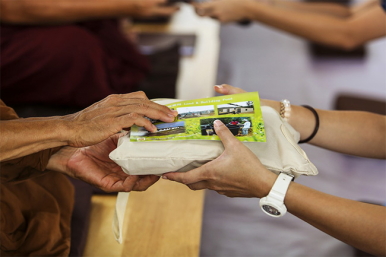
Feb 21, 2017 | Non categorizzato
 A concentration of Medieval towns and villages that are among the most beautiful in the country, ancient traditions, natural treasures, art and traces of an ancient culture that has sown Italy’s history with stories of a hard-working people that is tied to its roots. This is the central Italy that has been hit by an unfortunate series of earthquakes that continue to shake the region. The Italian Province of Fermo includes forty municipalities from the Sibillini Mountains to the sand and pebble beaches along the Adriatic Sea. On a clear night you can see the lights of neighbouring Croatia from the 13th century Dome Cathedral of Fermo. The Archdiocese also has ancient roots: Begun in the late 1500s, but going back to the 3rd century, it is the largest diocese in the region with120 parishes in 58 municipalities of the three Provinces of Ascoli Piceno, Fermo and Macerata. The Focolare’s Diocesan Movement began to take its first steps in the local Church of the region in 1973. As a branch of the Focolare Movement it works at the service of the local Church, offering and spreading the charism of unity in cooperation with other ecclesial groups, in order to make the Church a “Church-Communion”. In the whole territory around Fermo the earthquake caused devastation, evacuation and much fear. Two hundred churches were closed because they became inaccessible. Loredana, from the Diocesan Movement, tells about the experience of being close to the victims: “Along the coast, numerous camps and touristic villages are hosting 25 thousand people. In one camp site at Porto San Elpidio the Civil protection Agency set up an operation centre for this region. The local citizens has hosted more than a thousand people, entire families with children and grandparents, but several thousand moved away from here before being directed to other facilities along the coast. We took up a collection among us animators, to buy basic necessities. We set up a small coffee bar for the volunteers and evacuees. Once this phase was finished, the mayor and the councillor for culture met with representatives from schools to request support in organising workshops and recreational activities. Three of us were there representing the Diocesan Movement, but we had many others behind us that we knew were willing to help. Together with them we organised activities for the children and tutoring for the teenagers, locating teachers for every day and offering desserts prepared by our mothers and grandmothers. Strong friendships were established with teachers, children, teenagers and the elderly. Many evacuees are elderly. In Monte san Giusto, for example, around 120 evacuees were offered hospitality, including 42 from a rest home and 30 in wheelchairs. Two of us offered ourselves – one a social worker and the other a municipal guard – to listen to their needs. There were many personal initiatives. The young people from Porto San Elpidio, for example, made a lot of small Christmas trees that they then gave away to the families at the camp site. In the end, we collected 1,200 eruo for the RImPRESA Project in support of small inland production activities.”
A concentration of Medieval towns and villages that are among the most beautiful in the country, ancient traditions, natural treasures, art and traces of an ancient culture that has sown Italy’s history with stories of a hard-working people that is tied to its roots. This is the central Italy that has been hit by an unfortunate series of earthquakes that continue to shake the region. The Italian Province of Fermo includes forty municipalities from the Sibillini Mountains to the sand and pebble beaches along the Adriatic Sea. On a clear night you can see the lights of neighbouring Croatia from the 13th century Dome Cathedral of Fermo. The Archdiocese also has ancient roots: Begun in the late 1500s, but going back to the 3rd century, it is the largest diocese in the region with120 parishes in 58 municipalities of the three Provinces of Ascoli Piceno, Fermo and Macerata. The Focolare’s Diocesan Movement began to take its first steps in the local Church of the region in 1973. As a branch of the Focolare Movement it works at the service of the local Church, offering and spreading the charism of unity in cooperation with other ecclesial groups, in order to make the Church a “Church-Communion”. In the whole territory around Fermo the earthquake caused devastation, evacuation and much fear. Two hundred churches were closed because they became inaccessible. Loredana, from the Diocesan Movement, tells about the experience of being close to the victims: “Along the coast, numerous camps and touristic villages are hosting 25 thousand people. In one camp site at Porto San Elpidio the Civil protection Agency set up an operation centre for this region. The local citizens has hosted more than a thousand people, entire families with children and grandparents, but several thousand moved away from here before being directed to other facilities along the coast. We took up a collection among us animators, to buy basic necessities. We set up a small coffee bar for the volunteers and evacuees. Once this phase was finished, the mayor and the councillor for culture met with representatives from schools to request support in organising workshops and recreational activities. Three of us were there representing the Diocesan Movement, but we had many others behind us that we knew were willing to help. Together with them we organised activities for the children and tutoring for the teenagers, locating teachers for every day and offering desserts prepared by our mothers and grandmothers. Strong friendships were established with teachers, children, teenagers and the elderly. Many evacuees are elderly. In Monte san Giusto, for example, around 120 evacuees were offered hospitality, including 42 from a rest home and 30 in wheelchairs. Two of us offered ourselves – one a social worker and the other a municipal guard – to listen to their needs. There were many personal initiatives. The young people from Porto San Elpidio, for example, made a lot of small Christmas trees that they then gave away to the families at the camp site. In the end, we collected 1,200 eruo for the RImPRESA Project in support of small inland production activities.”
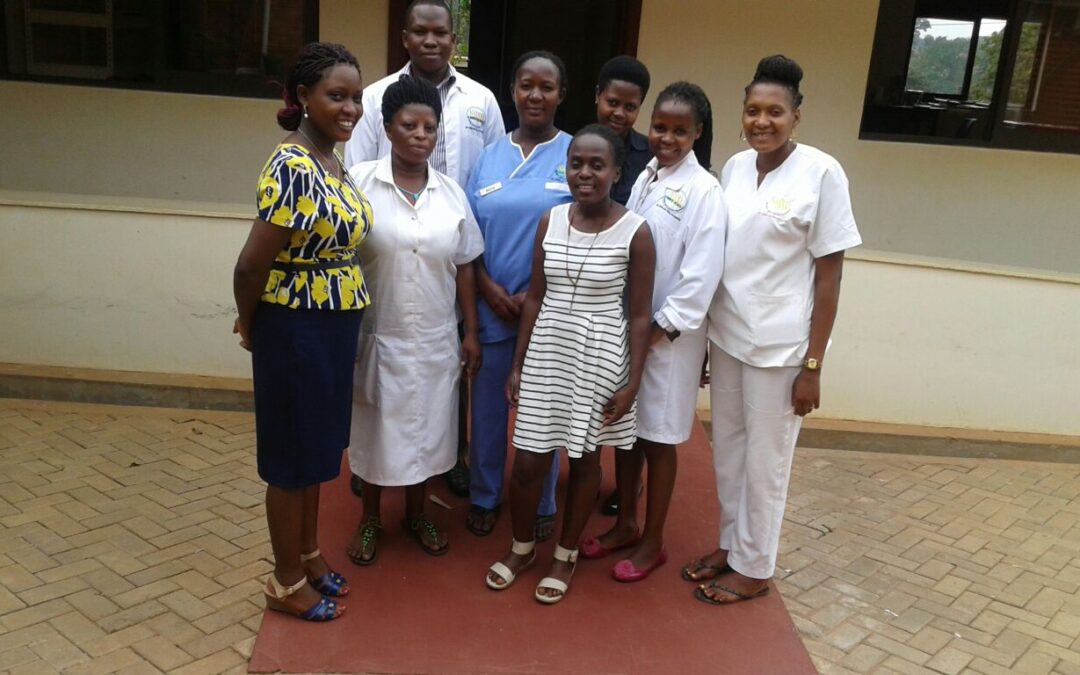
Feb 20, 2017 | Focolare Worldwide
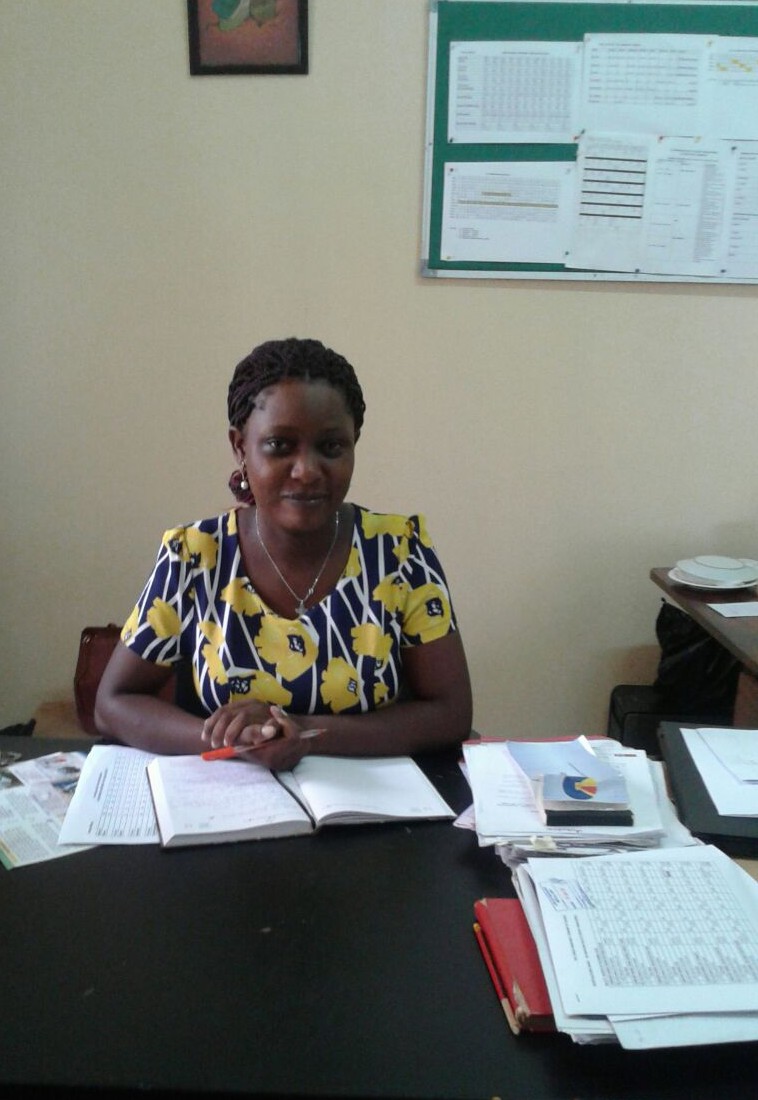 Ugandan business woman Rita Najjingo was among the 1,200 business owners and researchers of economy who were welcomed by Pope Francis on February 4, twenty five years from the start of the Economy of Communion Project (EoC). Seventy three percent of Rita’s country is made up of young people between the ages of 18 and 30, 47% of whom are unemployed. “Many of them try to set up small manufacturing activities,” Rita reports, “but because of a lack of capital and management skills, their businesses fail from start.” The idea of the EoC came to the African continent in recent years and immediately appeared as an answer. In 2015 several Ugandan entrepreneurs and researchers took part in a conference in Nairobi, Kenya, to learn about this economic project that puts the person first. When they went back to Uganda they talked with the local community and the first projects began in Ibanda, the western part of the country with a form of micro-credit that began to support a school for ex-cons; in Lira, the north, a home was built for elderly women, along with the cultivation of garlic, and so on. In Kampala,” Rita recounts, “there was the idea of involving the patients at a neary Focolare-run health centre which had a secure source of income. The idea was to be able to grant loans with their savings that they put in common, with loans for people who did not have enough capital to start up a manufacturing activity. An expert gave a week-long course and a savings and loan association was begun.
Ugandan business woman Rita Najjingo was among the 1,200 business owners and researchers of economy who were welcomed by Pope Francis on February 4, twenty five years from the start of the Economy of Communion Project (EoC). Seventy three percent of Rita’s country is made up of young people between the ages of 18 and 30, 47% of whom are unemployed. “Many of them try to set up small manufacturing activities,” Rita reports, “but because of a lack of capital and management skills, their businesses fail from start.” The idea of the EoC came to the African continent in recent years and immediately appeared as an answer. In 2015 several Ugandan entrepreneurs and researchers took part in a conference in Nairobi, Kenya, to learn about this economic project that puts the person first. When they went back to Uganda they talked with the local community and the first projects began in Ibanda, the western part of the country with a form of micro-credit that began to support a school for ex-cons; in Lira, the north, a home was built for elderly women, along with the cultivation of garlic, and so on. In Kampala,” Rita recounts, “there was the idea of involving the patients at a neary Focolare-run health centre which had a secure source of income. The idea was to be able to grant loans with their savings that they put in common, with loans for people who did not have enough capital to start up a manufacturing activity. An expert gave a week-long course and a savings and loan association was begun. 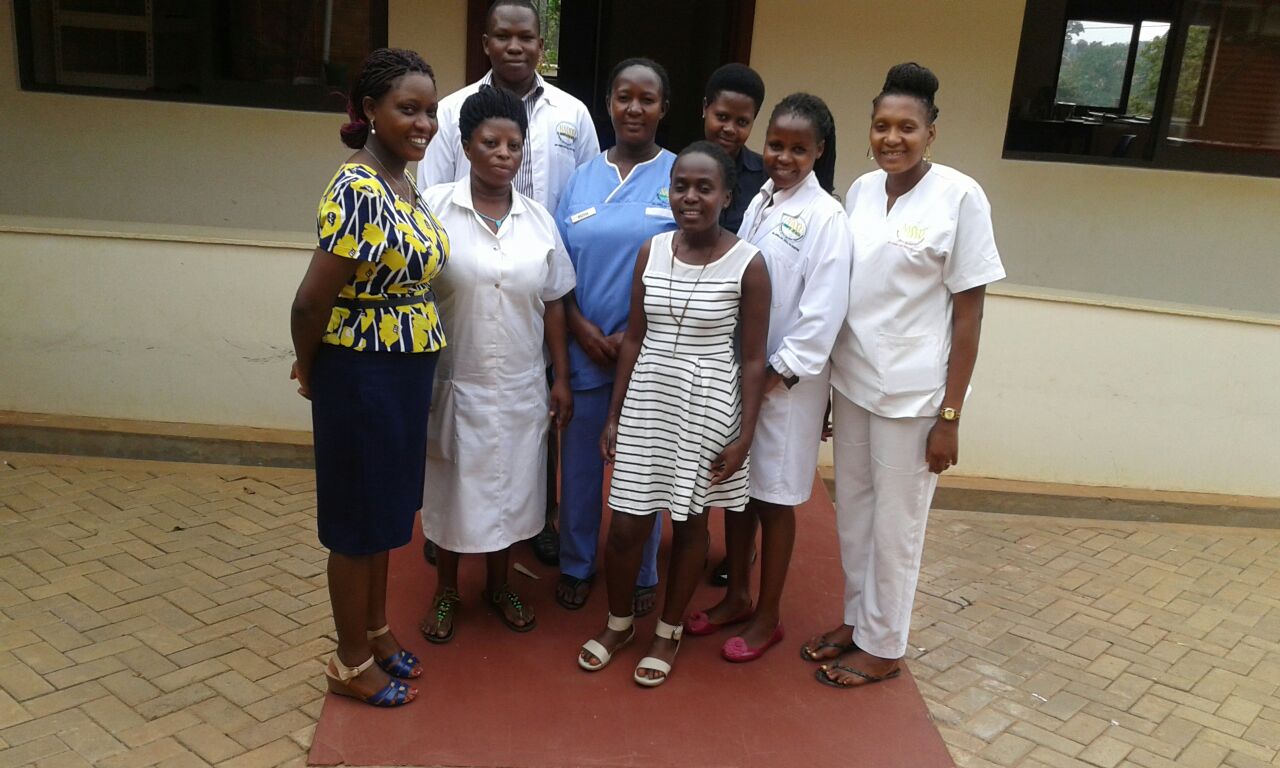 Typically the amount that is given in loan is never more than three times the capital the applican has on hand. The repayment starts after four weeks, leaving a small percentage for the increase of the share capital. Within three months, the debt is fully repaid. In granting a loan the promoter group enquires about the type of business that applicants intend to start, giving advice and accompanying them in their first steps. Over time, a group of experts in management has been formed that can also offer advice on managing, marketing and sustainability. One person asked for the loan to make handcrafted bags, another young person to buy a motorcycle he could rent out and also drive for pay, with a second loan and the sale of the old bike, he bought a more efficient one. He is now in charge of buying and selling used motorbikes, with help of two young men whom he hired. A member of the community has invested the loan in the purchase of sesame plants that are sold for various food uses. He too has been able to hire young people who help in delivery and removal of goods, thus facilitating things for manufacturers. With this loan activity, Rita continued, she was also able to create a fully registered company in charge of stationary and office supplies. After having used up the first loan, I got another to expand the business with online money transfers. Currently, I have four centres that have hired 4 young women, 3 of whom are single mothers.” A motorbike, small house, some garlic and sesame seeds . . . small signs, Pope Francis called them, in his speech to the EoC, seeds of change: “Change in the order of the spirit and therefore of life are not linked to big numbers. The little flock, the lamp, the coin, a ring, a pearl, some salt, leaven: these are the images of the Kingdom that we find in the Gospel. It doesn’t take many people to change our history, our life.” (Vatican City, February 4, 2017)
Typically the amount that is given in loan is never more than three times the capital the applican has on hand. The repayment starts after four weeks, leaving a small percentage for the increase of the share capital. Within three months, the debt is fully repaid. In granting a loan the promoter group enquires about the type of business that applicants intend to start, giving advice and accompanying them in their first steps. Over time, a group of experts in management has been formed that can also offer advice on managing, marketing and sustainability. One person asked for the loan to make handcrafted bags, another young person to buy a motorcycle he could rent out and also drive for pay, with a second loan and the sale of the old bike, he bought a more efficient one. He is now in charge of buying and selling used motorbikes, with help of two young men whom he hired. A member of the community has invested the loan in the purchase of sesame plants that are sold for various food uses. He too has been able to hire young people who help in delivery and removal of goods, thus facilitating things for manufacturers. With this loan activity, Rita continued, she was also able to create a fully registered company in charge of stationary and office supplies. After having used up the first loan, I got another to expand the business with online money transfers. Currently, I have four centres that have hired 4 young women, 3 of whom are single mothers.” A motorbike, small house, some garlic and sesame seeds . . . small signs, Pope Francis called them, in his speech to the EoC, seeds of change: “Change in the order of the spirit and therefore of life are not linked to big numbers. The little flock, the lamp, the coin, a ring, a pearl, some salt, leaven: these are the images of the Kingdom that we find in the Gospel. It doesn’t take many people to change our history, our life.” (Vatican City, February 4, 2017)
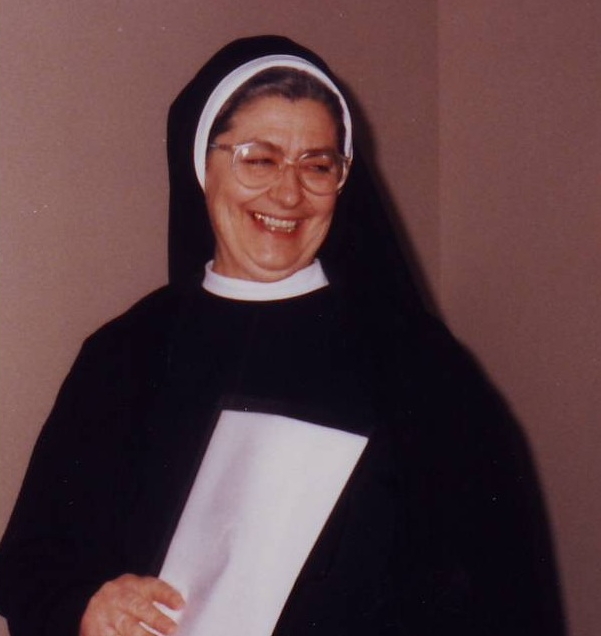
Feb 19, 2017 | Non categorizzato
 Born in a prestigious family in Rome, the institute chosen for her education was the Holy Spirit Institute run by the Daughters of the Immaculate Conception. In the institute she personally knew the foundress, now Blessed, and soon she felt the desire to give herself totally to God. Her family did not accept her choice, and after she escaped to go to the novitiate twice, she was forced to return home. Then due to her firm decision, she managed to convince her parents and make her dream come true. At the conclusion of her training in Northern Italy, she returned to Rome to teach in the school she had attended as a child and adolescent. Jovial and playful, Sr. Leopolda was able to conquer her students and with her smart remarks managed to downplay even the most complicated situations. In the 1970s she came across the spirituality of the Focolare and in it, discovered a sign of the times for the Church. Fascinated by the vision of Chiara Lubich who considered every charism a gift of love for the others, she felt the urge to create a current of communion among consecrated women of various religious families. Due to her moral and spiritual gifts, vast culture, and the great capacity to enhance the importance of people, in 1983 she was asked to guide the Congregation for 12 years. She personally met the founder of the Focolare, who in 1989 asked her to lead the Movement of the Religious at international levels, and promote communion among the Mother Generals who appreciated the spirituality of unity. Mother Leopolda accepted Chiara’s invitation with joy and responsibility, and wove a tight network of religious bound by the spirit of communion. She programmed and prepared annual meetings for consecrated women and mother generals. When her mandate to guide her congregation ended, she again took up her commitment in the educational field. The parents of her students considered her, “the most gentle and nicest Director of all the schools in the world.” When she fell ill, she was ready to say her “yes” to the God she had followed since her youth. She let Him guide her by the hand, offering all for the Church, her congregation, and the consecrated women she had met in life. In the more difficult moments she took comfort in the spiritual writings of Chiara, surrounded by her co-religious and the focolarine who were by her side up to the end. The doctors and staff of the hospital were struck by her testimony of serenity and total abandonment to God. Sr. Leopolda passed away on 1 January 2017, at the age of 87. The Focolare Movement remembers her with immense gratitude for her life spent entirely to diffuse among the religious, the spirit of communion that arises from the Charism of Unity.
Born in a prestigious family in Rome, the institute chosen for her education was the Holy Spirit Institute run by the Daughters of the Immaculate Conception. In the institute she personally knew the foundress, now Blessed, and soon she felt the desire to give herself totally to God. Her family did not accept her choice, and after she escaped to go to the novitiate twice, she was forced to return home. Then due to her firm decision, she managed to convince her parents and make her dream come true. At the conclusion of her training in Northern Italy, she returned to Rome to teach in the school she had attended as a child and adolescent. Jovial and playful, Sr. Leopolda was able to conquer her students and with her smart remarks managed to downplay even the most complicated situations. In the 1970s she came across the spirituality of the Focolare and in it, discovered a sign of the times for the Church. Fascinated by the vision of Chiara Lubich who considered every charism a gift of love for the others, she felt the urge to create a current of communion among consecrated women of various religious families. Due to her moral and spiritual gifts, vast culture, and the great capacity to enhance the importance of people, in 1983 she was asked to guide the Congregation for 12 years. She personally met the founder of the Focolare, who in 1989 asked her to lead the Movement of the Religious at international levels, and promote communion among the Mother Generals who appreciated the spirituality of unity. Mother Leopolda accepted Chiara’s invitation with joy and responsibility, and wove a tight network of religious bound by the spirit of communion. She programmed and prepared annual meetings for consecrated women and mother generals. When her mandate to guide her congregation ended, she again took up her commitment in the educational field. The parents of her students considered her, “the most gentle and nicest Director of all the schools in the world.” When she fell ill, she was ready to say her “yes” to the God she had followed since her youth. She let Him guide her by the hand, offering all for the Church, her congregation, and the consecrated women she had met in life. In the more difficult moments she took comfort in the spiritual writings of Chiara, surrounded by her co-religious and the focolarine who were by her side up to the end. The doctors and staff of the hospital were struck by her testimony of serenity and total abandonment to God. Sr. Leopolda passed away on 1 January 2017, at the age of 87. The Focolare Movement remembers her with immense gratitude for her life spent entirely to diffuse among the religious, the spirit of communion that arises from the Charism of Unity.
Feb 18, 2017 | Non categorizzato
https://vimeo.com/204141968
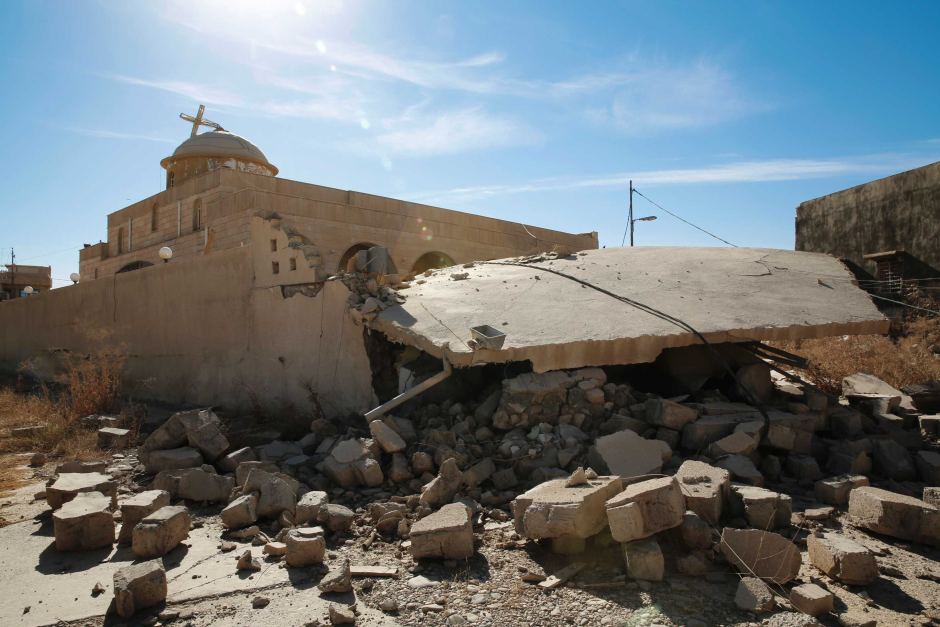
Feb 17, 2017 | Non categorizzato
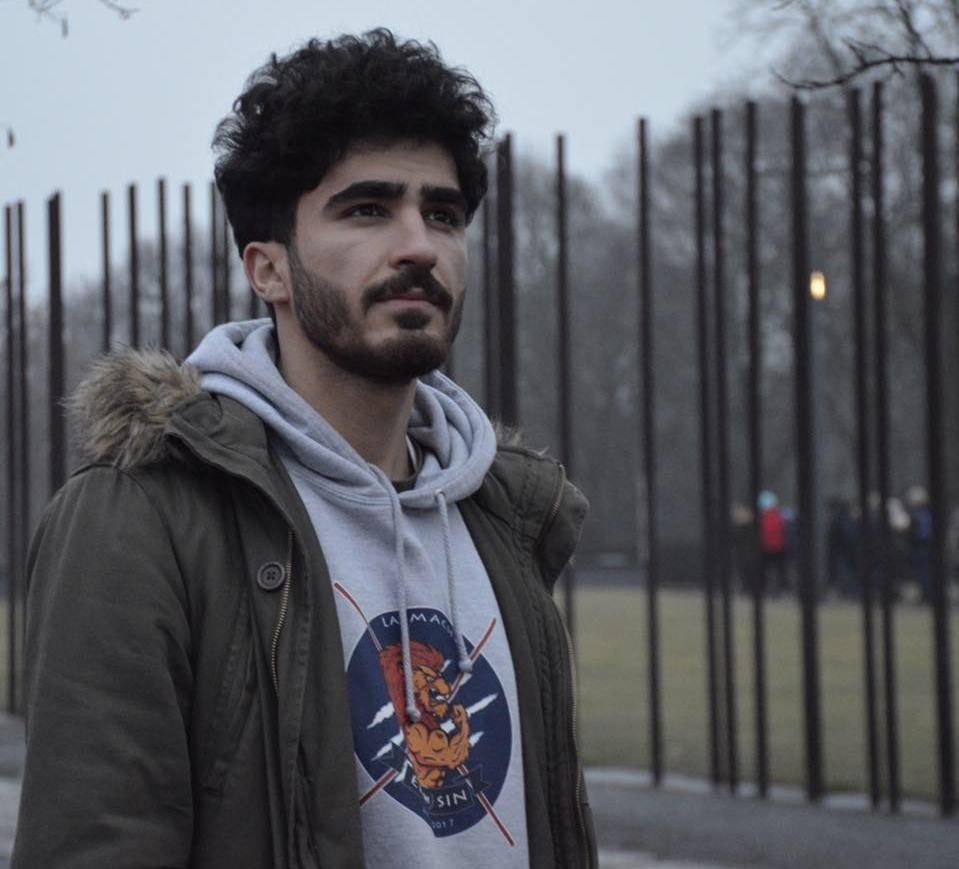 Up until the age of 18 I lived a normal life between house, school, sport, parish and my dreams. But one day, after the withdrawal of the Kurdish army, the resistance didn’t last long and my city of Qaraqosh fell. The so-called Islamic State (ISIS) took over and everything fell apart. Occupied for two years by the black flags of ISIS my birthplace was named the capital of ISIS for the Nineveh Plains. Qaraqosh had been the most important Christian city in Iraq with more than sixty thousand inhabitants. And even though it was liberated in October 2016, it was now a ghost town. But let’s go back a bit. On August 6, 2014 we had to leave our home without even packing our bags, only with the clothes on our back. We had been put in front of a choice: become Muslim, pay a bribe or have our heads cut off. We were fortunate to stay alive! From then on it was a hard adventure for us. And inside me there were mixed feelings of anger, resignation and exasperation, to the point that I even wondered how God could allow us to live such a hard trial. But it was an important life lesson that led me, not without effort, to then make a great discovery.
Up until the age of 18 I lived a normal life between house, school, sport, parish and my dreams. But one day, after the withdrawal of the Kurdish army, the resistance didn’t last long and my city of Qaraqosh fell. The so-called Islamic State (ISIS) took over and everything fell apart. Occupied for two years by the black flags of ISIS my birthplace was named the capital of ISIS for the Nineveh Plains. Qaraqosh had been the most important Christian city in Iraq with more than sixty thousand inhabitants. And even though it was liberated in October 2016, it was now a ghost town. But let’s go back a bit. On August 6, 2014 we had to leave our home without even packing our bags, only with the clothes on our back. We had been put in front of a choice: become Muslim, pay a bribe or have our heads cut off. We were fortunate to stay alive! From then on it was a hard adventure for us. And inside me there were mixed feelings of anger, resignation and exasperation, to the point that I even wondered how God could allow us to live such a hard trial. But it was an important life lesson that led me, not without effort, to then make a great discovery.  We started out in the direction of Iraqi Kurdistan together with a crowd of refugees who were moving on foot.. I can still see their tears, the soldiers, people sleeping along the road . . . a road to Erbil that usually takes a half hour, now, due to the road blocks and in spite of the fact that we were lucky enough to have a vehicle, took us 12 hours. We went towards Dohuk where we spent about 2 months. It was a painful period that we lived through in the hope of returning home. In those difficult moments, I realized that if I stayed close in my own suffering, nothing would change and I wouldn’t move on. So I decided to live the present moment, deciding to try to bring a smile to the face of the neighbour beside me, to try to bring some change in that way in spite of everything. Near me were people of the Yazidi religion who were more needy than us. Their people had been slaughtered by ISIS, because they didn’t have the means to escape: men killed, women raped and sold. The ones who did manage to escape were in a pitiful state. I lived along with them and tried to forget my own wounds to console them. After the years of exile, my parents had decided to go to France, because that country had extended its hand. It was a hard decision: to stay in our own land with an uncertain future, or accept our exile and begin our life again in a new country that had a different culture. We were well aware of the problems that were awaiting us beginning with the language. We arrived in France on October 26, 2014. At first it wasn’t easy, but we never felt abandoned. Someone took care of us and cleared our path. His unseen hand dried our tears and lightened our pain. Yes, it was Jesus who died for each one of us! How could we respond to His love? Now that this painful adventure has led me to discover that God is Love, that it is He who gives meaning to my life. Now, I want to build peace starting from the little things.
We started out in the direction of Iraqi Kurdistan together with a crowd of refugees who were moving on foot.. I can still see their tears, the soldiers, people sleeping along the road . . . a road to Erbil that usually takes a half hour, now, due to the road blocks and in spite of the fact that we were lucky enough to have a vehicle, took us 12 hours. We went towards Dohuk where we spent about 2 months. It was a painful period that we lived through in the hope of returning home. In those difficult moments, I realized that if I stayed close in my own suffering, nothing would change and I wouldn’t move on. So I decided to live the present moment, deciding to try to bring a smile to the face of the neighbour beside me, to try to bring some change in that way in spite of everything. Near me were people of the Yazidi religion who were more needy than us. Their people had been slaughtered by ISIS, because they didn’t have the means to escape: men killed, women raped and sold. The ones who did manage to escape were in a pitiful state. I lived along with them and tried to forget my own wounds to console them. After the years of exile, my parents had decided to go to France, because that country had extended its hand. It was a hard decision: to stay in our own land with an uncertain future, or accept our exile and begin our life again in a new country that had a different culture. We were well aware of the problems that were awaiting us beginning with the language. We arrived in France on October 26, 2014. At first it wasn’t easy, but we never felt abandoned. Someone took care of us and cleared our path. His unseen hand dried our tears and lightened our pain. Yes, it was Jesus who died for each one of us! How could we respond to His love? Now that this painful adventure has led me to discover that God is Love, that it is He who gives meaning to my life. Now, I want to build peace starting from the little things.
Feb 16, 2017 | Non categorizzato
https://vimeo.com/204142200
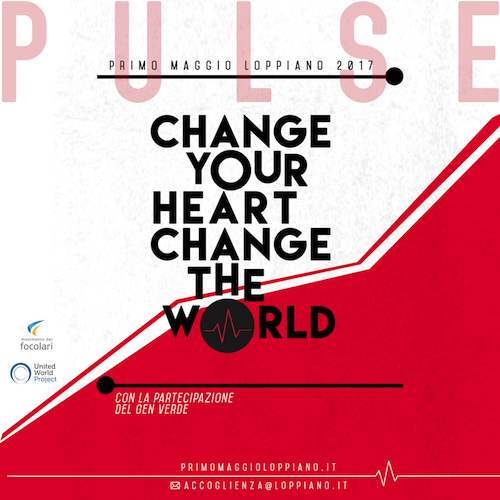
Feb 15, 2017 | Non categorizzato
 The worldwide appointment which inaugurates this year’s edition of United World Week is an event whereby young people from over 40 nations come together in unity in order to have the finger on the pulse on humanitarian issues. The program includes choreographic expressions, life experiences and spaces for dialogue on politics, economy, art, religion, culture, social commitment for peace. 1st MAY EVENT PROGRAM 10.00 am -3.15 pm – Welcome and start of program
The worldwide appointment which inaugurates this year’s edition of United World Week is an event whereby young people from over 40 nations come together in unity in order to have the finger on the pulse on humanitarian issues. The program includes choreographic expressions, life experiences and spaces for dialogue on politics, economy, art, religion, culture, social commitment for peace. 1st MAY EVENT PROGRAM 10.00 am -3.15 pm – Welcome and start of program
Workshop: Peace and … Religion – Economy – Politics – Art – Education – Nature
3.30 – 4.30 pm – Many pulses in the one world: stories of peace 4.45 pm – Explosion of peace: music4peace Information and bookings: www.primomaggioloppiano.it FB primomaggioloppiano https://www.facebook.com/primomaggioloppiano/videos/1391995820874604/
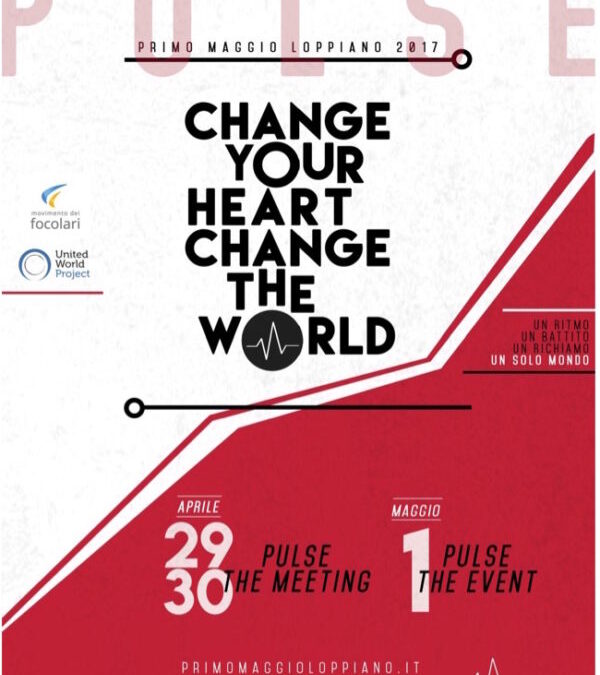
Feb 15, 2017 | Non categorizzato
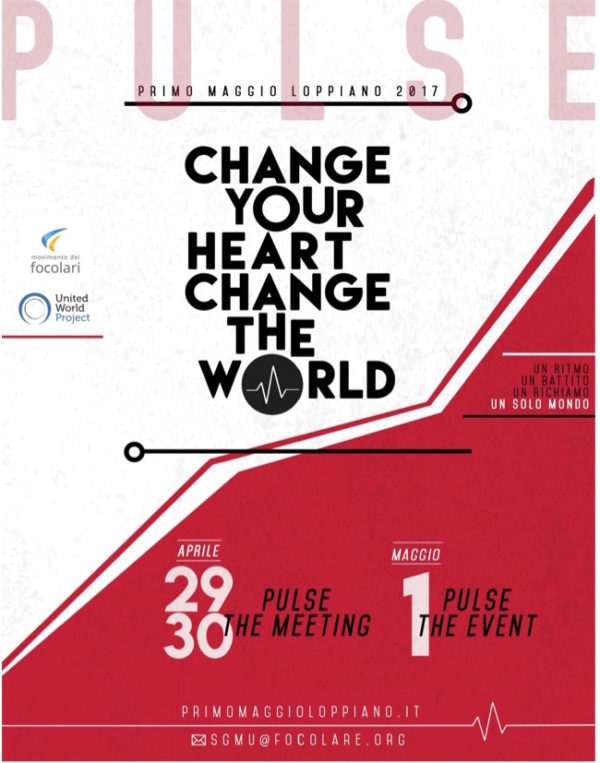 For over 20 years, United World Week has been an event which gathers young people from all over the world who, through a variety actions, public meetings, conferences and cultural debates, commit themselves to having an influence on public opinion in the host country, and in together giving witness that a united world is possible, they leave a tangible sign of this unity in the cities and institutions which took part. This year the 1st May event will be launched from Loppiano and it will be preceded by the international meeting for Youth for a United World. Program of Youth for a United World Meeting (29 – 30 April) 2 days dedicated to meetings, reflections, learning, assimilating, envisaging a new world where peace is the universal law 800 young people from around the world who are part of Youth for a United World; 3 workshops dedicated to welcoming and integration, social commitment, peace expressed through art; 4 forums focussed on: Peace and religious traditions; Economics and Politics; Education to Peace; Peace and Nature. 1st May Program 10.00 am – 3.15 pm – Welcome and start of program Workshop: Peace and … Religion – Economy – Politics – Art – Education – Nature 3.30 – 4.30 pm – Many pulse beats in the one world: Stories of Peace 4.45 pm – Explosion of peace: music4peace Information and bookings: www.primomaggioloppiano.it FB primomaggioloppiano
For over 20 years, United World Week has been an event which gathers young people from all over the world who, through a variety actions, public meetings, conferences and cultural debates, commit themselves to having an influence on public opinion in the host country, and in together giving witness that a united world is possible, they leave a tangible sign of this unity in the cities and institutions which took part. This year the 1st May event will be launched from Loppiano and it will be preceded by the international meeting for Youth for a United World. Program of Youth for a United World Meeting (29 – 30 April) 2 days dedicated to meetings, reflections, learning, assimilating, envisaging a new world where peace is the universal law 800 young people from around the world who are part of Youth for a United World; 3 workshops dedicated to welcoming and integration, social commitment, peace expressed through art; 4 forums focussed on: Peace and religious traditions; Economics and Politics; Education to Peace; Peace and Nature. 1st May Program 10.00 am – 3.15 pm – Welcome and start of program Workshop: Peace and … Religion – Economy – Politics – Art – Education – Nature 3.30 – 4.30 pm – Many pulse beats in the one world: Stories of Peace 4.45 pm – Explosion of peace: music4peace Information and bookings: www.primomaggioloppiano.it FB primomaggioloppiano

Feb 15, 2017 | Non categorizzato
 The meeting aims to be a voyage of discovery whereby ideas are explored for changing the course of history. In their quest to be a node in the worldwide network, Youth for a United World are committed to working alongside other associations and groups. The actions of YFUW, referred to as “fragments of fraternity”, are collected up in the United World Project, which since 2012 has been connecting up people from all latitudes who have chosen universal brotherhood as a way of life. The program of the meeting which precedes United World Week (1-10 May 2017) which will kickstart with the 1st May event 2 days dedicated to meetings, reflections, learning, assimilating, envisaging a new world where peace is the universal law 800 young people from around the world who are part of Youth for a United World; 3 workshops dedicated to welcoming and integration, social commitment, peace expressed through art; 4 forums focussed on: Peace and religious traditions; Economics and Politics; Education to Peace; Peace and Nature. 29 April 3.00 pm – Welcome: Peace in the world 5.00 – Peace in our cities and nations 6.45 – Group meetings 9.15 – Evening program 30 April 9.15 am – Peace within us 10.45 – Dialogue 12.30 – Prayer 3.00 pm – Workshop and forum 6.45 – Group meetings 9.15 – Evening program Partner organisations: Sophia University Institute, “Non Dalla Guerra”, “Nuovi Orizzonti”, “Rondine”, Action for a United World, “Italia che cambia”, Economy of Communion, Living Peace, EcoOne, DanceLab, La Pira Centre (Florence), Moslem Youth, Assisi Group, “Barbiana”. More information: www.primomaggioloppiano.it – FB primomaggioloppiano Video clip: https://www.facebook.com/primomaggioloppiano/videos/1347355652005288/
The meeting aims to be a voyage of discovery whereby ideas are explored for changing the course of history. In their quest to be a node in the worldwide network, Youth for a United World are committed to working alongside other associations and groups. The actions of YFUW, referred to as “fragments of fraternity”, are collected up in the United World Project, which since 2012 has been connecting up people from all latitudes who have chosen universal brotherhood as a way of life. The program of the meeting which precedes United World Week (1-10 May 2017) which will kickstart with the 1st May event 2 days dedicated to meetings, reflections, learning, assimilating, envisaging a new world where peace is the universal law 800 young people from around the world who are part of Youth for a United World; 3 workshops dedicated to welcoming and integration, social commitment, peace expressed through art; 4 forums focussed on: Peace and religious traditions; Economics and Politics; Education to Peace; Peace and Nature. 29 April 3.00 pm – Welcome: Peace in the world 5.00 – Peace in our cities and nations 6.45 – Group meetings 9.15 – Evening program 30 April 9.15 am – Peace within us 10.45 – Dialogue 12.30 – Prayer 3.00 pm – Workshop and forum 6.45 – Group meetings 9.15 – Evening program Partner organisations: Sophia University Institute, “Non Dalla Guerra”, “Nuovi Orizzonti”, “Rondine”, Action for a United World, “Italia che cambia”, Economy of Communion, Living Peace, EcoOne, DanceLab, La Pira Centre (Florence), Moslem Youth, Assisi Group, “Barbiana”. More information: www.primomaggioloppiano.it – FB primomaggioloppiano Video clip: https://www.facebook.com/primomaggioloppiano/videos/1347355652005288/
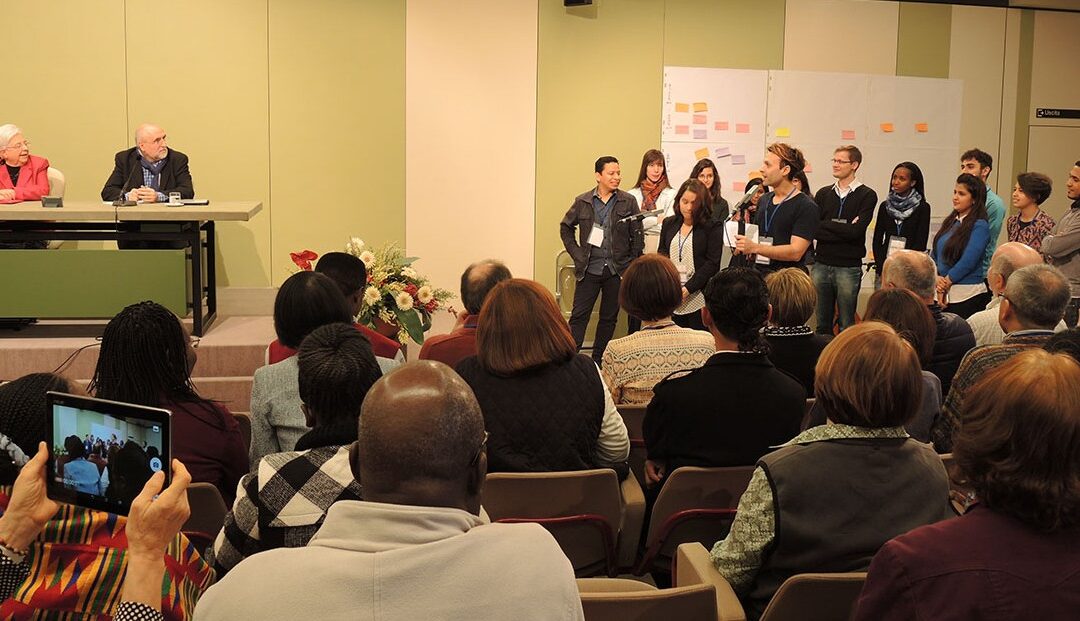
Feb 15, 2017 | Non categorizzato
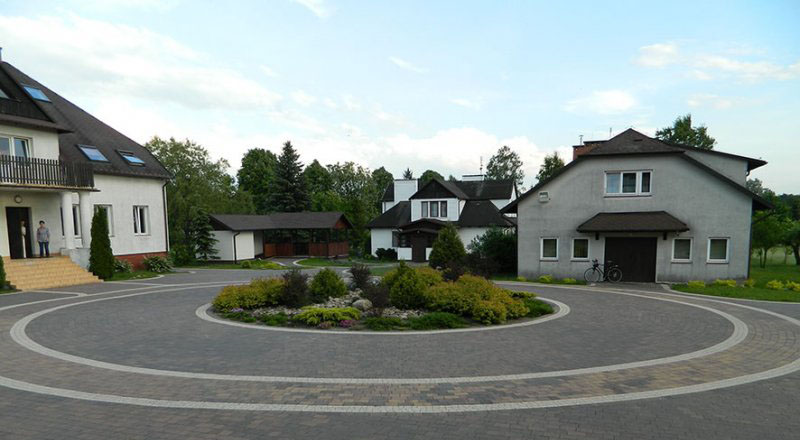 Cittadelle, literally “citadels”, but translated here as “Little Towns,” are small-scale models of society, with sharing among generations, schools, offices, businesses and centers of art. But the first rule of these communities is mutual love among their members. They are cities on a hill, cities of the future, ideal cities – only that they’re real. When you visit them you see concrete and tangible examples of a society healed of rivalry, competition, war, lawlessness and hatred. They are living incarnations of the ideal of a united world, “luminous examples suspended in time” of human communities that look towards a future of peace. Utopian? It wouldn’t seem so, walking the corridors of the Focolare’s international center in Castel Gandolfo, Italy, where a hundred young people and adults from little cities around the world got together over the week of February 12th. It was the first international gathering of these model cities.
Cittadelle, literally “citadels”, but translated here as “Little Towns,” are small-scale models of society, with sharing among generations, schools, offices, businesses and centers of art. But the first rule of these communities is mutual love among their members. They are cities on a hill, cities of the future, ideal cities – only that they’re real. When you visit them you see concrete and tangible examples of a society healed of rivalry, competition, war, lawlessness and hatred. They are living incarnations of the ideal of a united world, “luminous examples suspended in time” of human communities that look towards a future of peace. Utopian? It wouldn’t seem so, walking the corridors of the Focolare’s international center in Castel Gandolfo, Italy, where a hundred young people and adults from little cities around the world got together over the week of February 12th. It was the first international gathering of these model cities. 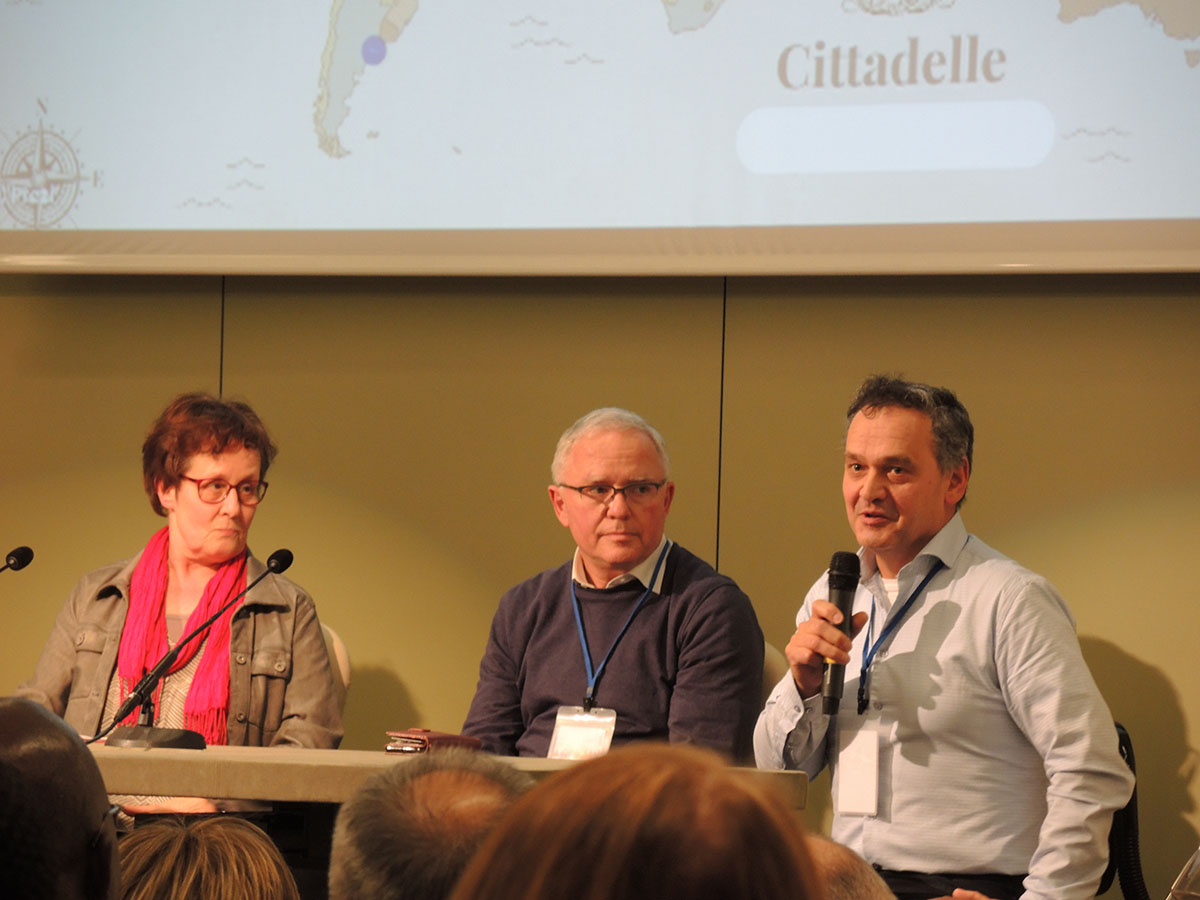 Each has its own story, its own personality that was shaped by the culture and social context in which it grew, with its own number of members, challenges and developments. For example, the Focolare Moviment‘s little town in Thailand is called “Golden Rule” because of a law that is found in every culture and religious tradition: Do unto others as you would have them do unto you. But they all share in common the same inspirational spark, the same strand of DNA that makes them all places of witness, in which it is possible to experience what the world would be like if everyone lived the Gospel, places where God’s invisible presence seems to become visible to human eyes. The presentations were like a trip around the world: from “El Diamante” in Mexico to Tagytay in the Philippines; from Fontem in Cameroon to Curryhills in Ireland; from Ottmaring in Germany to “Faro“ in Croatia; from Hyde Park in the United States to Loppiano in Italy. Together they form a network across the map. Participants from around the world discussed common issues such as governance, organization, economic sustainability, relationship with the local environment and future plans. One emerging feature is the growing connection with the local environment, both on the professional level (such as the Preset-Participation Project, the Resilience and Employability through Sustainablity Project, and the Entrepreneurship and Training Project at the permanent Mariapolis in Argentina) and on the human and spiritual level through ecumenical and interreligious dialogue. Young people make important contributions, such as in the innovative management system at Marienkron, Holland
Each has its own story, its own personality that was shaped by the culture and social context in which it grew, with its own number of members, challenges and developments. For example, the Focolare Moviment‘s little town in Thailand is called “Golden Rule” because of a law that is found in every culture and religious tradition: Do unto others as you would have them do unto you. But they all share in common the same inspirational spark, the same strand of DNA that makes them all places of witness, in which it is possible to experience what the world would be like if everyone lived the Gospel, places where God’s invisible presence seems to become visible to human eyes. The presentations were like a trip around the world: from “El Diamante” in Mexico to Tagytay in the Philippines; from Fontem in Cameroon to Curryhills in Ireland; from Ottmaring in Germany to “Faro“ in Croatia; from Hyde Park in the United States to Loppiano in Italy. Together they form a network across the map. Participants from around the world discussed common issues such as governance, organization, economic sustainability, relationship with the local environment and future plans. One emerging feature is the growing connection with the local environment, both on the professional level (such as the Preset-Participation Project, the Resilience and Employability through Sustainablity Project, and the Entrepreneurship and Training Project at the permanent Mariapolis in Argentina) and on the human and spiritual level through ecumenical and interreligious dialogue. Young people make important contributions, such as in the innovative management system at Marienkron, Holland 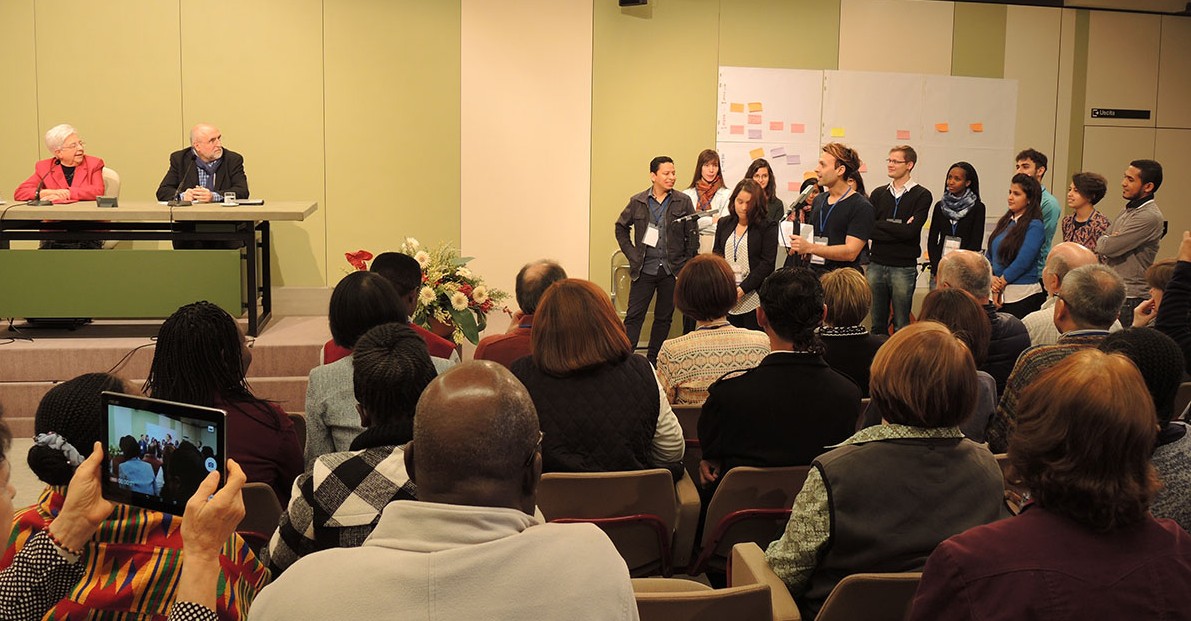 Clara Zonlini and Vit Valtr, who coordinate the Focolare’s permanent Mariapolises around the world, underscored at the close of the week: “A key element for bringing these little cities ahead is an extended form of responsibility. . . . There aren’t any cliques: Each one is complete in itself, with its own identity. And even if some of them don’t have certain elements like schools or businesses, what really matters is the presence of Jesus among the members.” What are the future prospects after such and intense and fruitful week together? Clara and Vit: “To return to the original identity of the Mariapolis (city of Mary), to give that specific witness, which is the witness to the whole Work of Mary,” taking part in ecumenical dialogue, interreligious dialogue, and dialogue with every person of goodwill within each local context. “There was also unanimity in the desire to be connected: each little city in sync with the respective Focolare region. These days together have shown the importance of reciprocity and how the experience of one can be of help to the other, often giving important insights into solutions to a possible problem.” So, it’s not a utopia; the place exists. Indeed, at least twenty-five places exist.
Clara Zonlini and Vit Valtr, who coordinate the Focolare’s permanent Mariapolises around the world, underscored at the close of the week: “A key element for bringing these little cities ahead is an extended form of responsibility. . . . There aren’t any cliques: Each one is complete in itself, with its own identity. And even if some of them don’t have certain elements like schools or businesses, what really matters is the presence of Jesus among the members.” What are the future prospects after such and intense and fruitful week together? Clara and Vit: “To return to the original identity of the Mariapolis (city of Mary), to give that specific witness, which is the witness to the whole Work of Mary,” taking part in ecumenical dialogue, interreligious dialogue, and dialogue with every person of goodwill within each local context. “There was also unanimity in the desire to be connected: each little city in sync with the respective Focolare region. These days together have shown the importance of reciprocity and how the experience of one can be of help to the other, often giving important insights into solutions to a possible problem.” So, it’s not a utopia; the place exists. Indeed, at least twenty-five places exist.
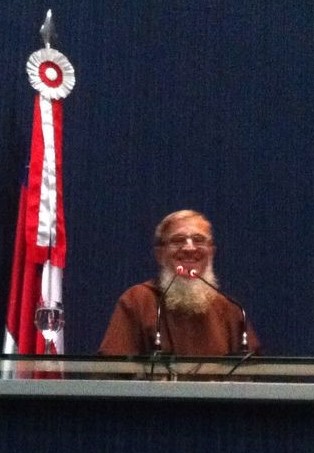
Feb 14, 2017 | Non categorizzato

On 10 February 2017 in the Amazonas Legislative Assembly Hall in Manaus, Brother Gino Alberati received the title of Amazonas citizen, a merited award for the 47 years of the mission spent for the people in Amazonas, Brazil. An untiring and authentic Capuchin, he lived all these years in the spirit of unity which characterises the Focolare Movement. Deputy José Ricardo Wending, a member of the group of politicians who promote the Political Movement for Unity (MPPU), inspired precisely by this movement had mainly conceived this important award. The award ceremony was simple and fraternal. The protocol rituals were set aside, overcome by the atmosphere of fraternity created amongst all those present. In his simple and unofficial speech, Brother Gino underlined his calling to fraternity, typical of his being a son of St. Francis of Assisi. He also transmitted the simplicity and depth of the charism of unity of Chiara Lubich, whom he had met when he was a young friar about to leave for Brazil. 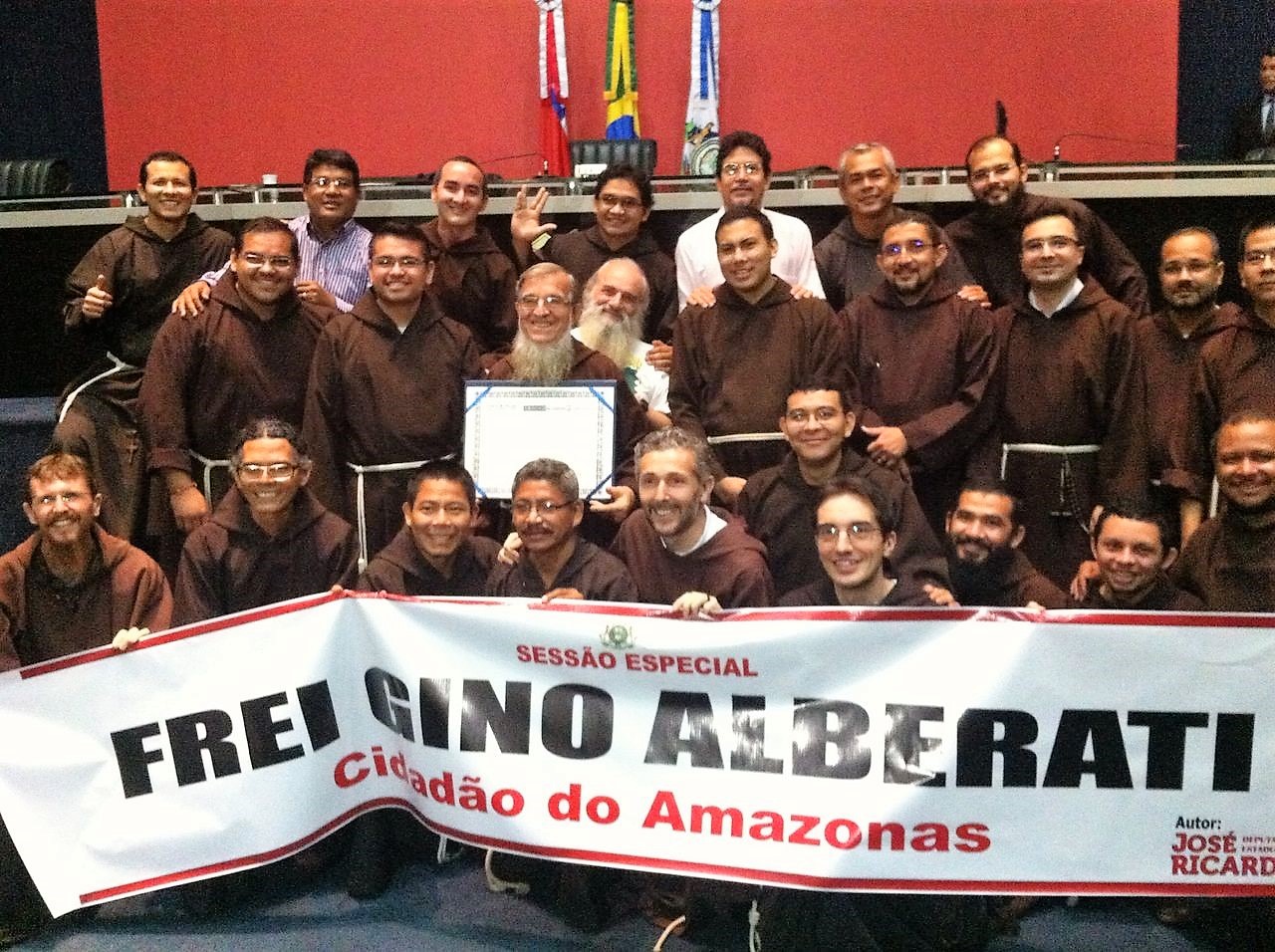 These 47 years passed in Brazil have confirmed what he said. His tenor voice, which never failed to resound in the midst of the Amazon forest, also echoed in this Assembly Hall, because he sang the Hail Mary, which moved all those present. Besides the civil and religious authorities, also a group of Capuchin brothers and some members of the Work of Mary attended the event. The various speeches that followed underlined the precious service that the missionaries rendered to the Church, not only in evangelisation but especially in human promotion and concrete love for others, especially in the fields of education and health, which are so fragile and jeopardized in these lands Source: Blog CROM
These 47 years passed in Brazil have confirmed what he said. His tenor voice, which never failed to resound in the midst of the Amazon forest, also echoed in this Assembly Hall, because he sang the Hail Mary, which moved all those present. Besides the civil and religious authorities, also a group of Capuchin brothers and some members of the Work of Mary attended the event. The various speeches that followed underlined the precious service that the missionaries rendered to the Church, not only in evangelisation but especially in human promotion and concrete love for others, especially in the fields of education and health, which are so fragile and jeopardized in these lands Source: Blog CROM

Feb 14, 2017 | Non categorizzato
 In the first months of marriage, happy and very much in love, everything seemed to go smoothly. But soon the tensions between me and my husband became more and more frequent and made me increasingly sad. I certainly made a lot of mistakes, but tried just the same to keep up the relationship, convinced that love would not end. We went on amid ups and downs. After five years we had a baby girl and then a boy. Our daughter was born with a congenital disease, and this meant many hospitalizations, even far from home. Also our son had weak health and was often also hospitalized. A delicate operation, however, resolved my daughter’s condition, but those had been very taxing years. My husband felt crushed by this situation and said he could no longer cope with all these problems. When I realised that he had fallen in love with my best friend, it was already too late to make him reverse his decisions. And so, after 13 years of marriage, I was left alone with two children of eight and five. I was so upset I no longer wished to live. I wasn’t afraid of death and with a powerful dose of drugs tried to commit suicide. But my plan failed and after 10 days in the hospital I was discharged. It was at this point that through the spirituality of the Focolare, I discovered God who is love. The Gospel had started to penetrate into my life, and I began to experience the joy of those who try to live it. The children suffered a lot due to our separation and I had quite a hard time also with them. But God never stopped guiding my life and placed along my way, people who helped me overcome the many problems I encountered, such as the burning desire to have someone by my side and the love of a man, or the desire to enjoy myself or simply just to cater to myself alone. And always, the light returned to illuminate my life, even when I had to face the most tragic experience for a parent: seeing my beloved daughter die in an accident at the age of 21. In that moment I was desperate with pain, but I asked God for the strength to repeat my “yes” to Him. And He did not leave me in desperation. I immediately felt his presence beside me. Ever since she had left us, I have received many signs of God’s love, and even if I cannot see her or hug her, I am at peace. Since she had wanted to become a teacher and was about to graduate, thanks to the generosity of many, a literacy project was created in the Ivory Coast, and adopted for some years also by the parish. Now the idea is that of building a school and the commitment is being brought ahead. God’s love manifests itself also when friends of my daughter share with me their experiences: inviting me to their graduation, coming to visit me, bringing me out to have a pizza together, asking me for advice and calling me “Second mom.” Currently my son still lives with me and I am happy to open my heart to the needs of others. When I find out about people from other cities who are hospitalised in the cancer hospital nearby, I do my best to stay by them, trying to be a small ray of that love God has for me. One day I found the strength to forgive my husband, and was able not to judge him. Since then I have felt free and liberated from the great weight oppressing me, and though it still has not completely disappeared, not even divorce will make me say that he is no longer my husband. I always remember what my daughter used to say: «Mom, your renunciation of marrying again will be dad’s salvation» and I am sure that these words will come true.
In the first months of marriage, happy and very much in love, everything seemed to go smoothly. But soon the tensions between me and my husband became more and more frequent and made me increasingly sad. I certainly made a lot of mistakes, but tried just the same to keep up the relationship, convinced that love would not end. We went on amid ups and downs. After five years we had a baby girl and then a boy. Our daughter was born with a congenital disease, and this meant many hospitalizations, even far from home. Also our son had weak health and was often also hospitalized. A delicate operation, however, resolved my daughter’s condition, but those had been very taxing years. My husband felt crushed by this situation and said he could no longer cope with all these problems. When I realised that he had fallen in love with my best friend, it was already too late to make him reverse his decisions. And so, after 13 years of marriage, I was left alone with two children of eight and five. I was so upset I no longer wished to live. I wasn’t afraid of death and with a powerful dose of drugs tried to commit suicide. But my plan failed and after 10 days in the hospital I was discharged. It was at this point that through the spirituality of the Focolare, I discovered God who is love. The Gospel had started to penetrate into my life, and I began to experience the joy of those who try to live it. The children suffered a lot due to our separation and I had quite a hard time also with them. But God never stopped guiding my life and placed along my way, people who helped me overcome the many problems I encountered, such as the burning desire to have someone by my side and the love of a man, or the desire to enjoy myself or simply just to cater to myself alone. And always, the light returned to illuminate my life, even when I had to face the most tragic experience for a parent: seeing my beloved daughter die in an accident at the age of 21. In that moment I was desperate with pain, but I asked God for the strength to repeat my “yes” to Him. And He did not leave me in desperation. I immediately felt his presence beside me. Ever since she had left us, I have received many signs of God’s love, and even if I cannot see her or hug her, I am at peace. Since she had wanted to become a teacher and was about to graduate, thanks to the generosity of many, a literacy project was created in the Ivory Coast, and adopted for some years also by the parish. Now the idea is that of building a school and the commitment is being brought ahead. God’s love manifests itself also when friends of my daughter share with me their experiences: inviting me to their graduation, coming to visit me, bringing me out to have a pizza together, asking me for advice and calling me “Second mom.” Currently my son still lives with me and I am happy to open my heart to the needs of others. When I find out about people from other cities who are hospitalised in the cancer hospital nearby, I do my best to stay by them, trying to be a small ray of that love God has for me. One day I found the strength to forgive my husband, and was able not to judge him. Since then I have felt free and liberated from the great weight oppressing me, and though it still has not completely disappeared, not even divorce will make me say that he is no longer my husband. I always remember what my daughter used to say: «Mom, your renunciation of marrying again will be dad’s salvation» and I am sure that these words will come true.
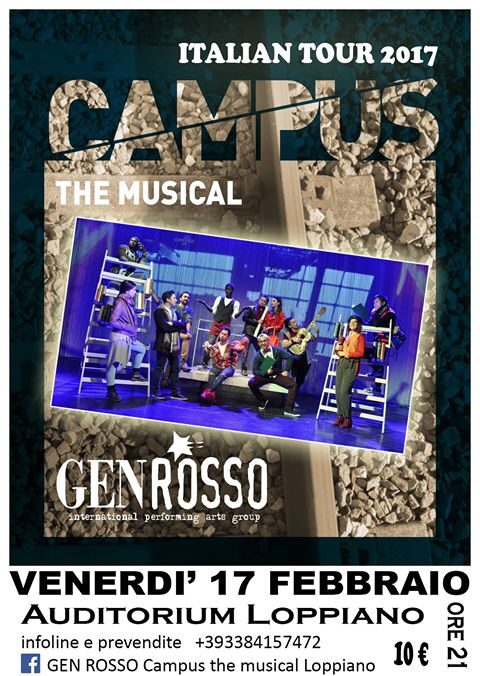
Feb 13, 2017 | Non categorizzato
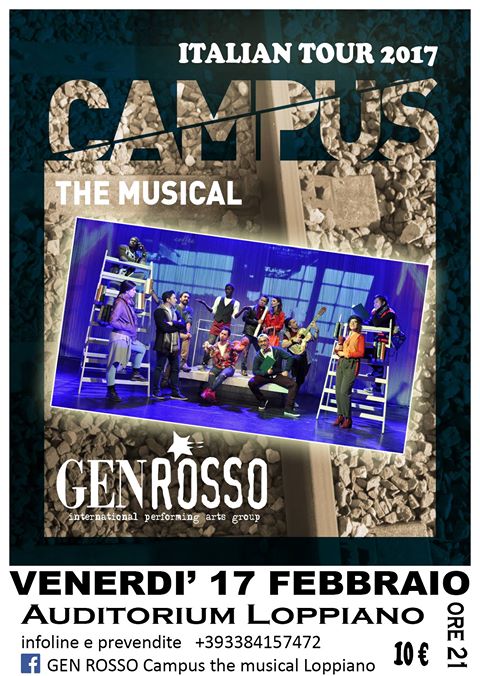 Campus. What does it mean to choose violence as a means for social change? What is happening in the mind of a young person who decides to join a terrorist cell? These are questions that could describe the story of the young people of Campus, who are gripped by the choices and dramas of today’s world: terrorism, hatred, social inequality and the distribution of wealth. The musical will go on stage at the Loppiano Centre Auditorium, February 17, 2017. Inspired by an original idea of Chiara Lubich, the musical is based on real events, and comes to the stage after 10 years of artistic planning. “It was 2004, just after the terrorist attacks in Madrid,” says Gen Rosso’s manager, Valerio Gentile. “The opening scene is of a railroad track like any railroad track in the world. It’s a story of searching, suffering, questioning and finding redemption, and it places the audience in front of the deep wounds of our times.” The musical is composed of 23 songs and choreographies that interact with film sequences and theatrical action. “The project is the result of collaboration by a team of international professionals,” musical curator Benedikt Enderle explains. “The sounds are full and strong, with engaging harmonical twists, with lyrics that range from the lightness of a Latin atmosphere to the pathos of African rhythm, in a striking synthesis of sounds that is very captivating.” The visuals are cutting-edge. “I’ve worked in many international productions,” says Jean Paul Carradori, set designer. “Campus was an unexpected challenge for me because of its dramatic structure and strong theatrical elements. It was necessary to create an atmosphere that would enhance the content and, at the same time, allow the viewers to immerse themselves in the story.” Directing was by Sarah Finch from Great Britain, development and scenery by Valerio Cipri from Italy, music by Benedikt Enderle from Switzerland and Jose Manuel Garcia from Spain, choreography by Raymond Estrada from Philippines, technical team by Emanuele Gervasoni from Italy, video design, lights by Jean Paul Carradori from Italy, Beligum, arrangements by Emanuele Chirco from Italy, and sound and final production by Max Zenoni. The “ITALIA per” Project. Every stop on the tour is connected to a cultural event promoted by SUI. Linked with a network of local institutions and associations, the project offers local level reflection and action on global challenges, seeking to remove the causes of hatred among ethnic groups, religions and cultures in our society. Press Office: sif@loppiano.it Reservations: accoglienza@loppiano.it Info: www.genrosso.com www.iu-sophia.org www.loppiano.it FB genrosso INSTAGRAM @genrosso
Campus. What does it mean to choose violence as a means for social change? What is happening in the mind of a young person who decides to join a terrorist cell? These are questions that could describe the story of the young people of Campus, who are gripped by the choices and dramas of today’s world: terrorism, hatred, social inequality and the distribution of wealth. The musical will go on stage at the Loppiano Centre Auditorium, February 17, 2017. Inspired by an original idea of Chiara Lubich, the musical is based on real events, and comes to the stage after 10 years of artistic planning. “It was 2004, just after the terrorist attacks in Madrid,” says Gen Rosso’s manager, Valerio Gentile. “The opening scene is of a railroad track like any railroad track in the world. It’s a story of searching, suffering, questioning and finding redemption, and it places the audience in front of the deep wounds of our times.” The musical is composed of 23 songs and choreographies that interact with film sequences and theatrical action. “The project is the result of collaboration by a team of international professionals,” musical curator Benedikt Enderle explains. “The sounds are full and strong, with engaging harmonical twists, with lyrics that range from the lightness of a Latin atmosphere to the pathos of African rhythm, in a striking synthesis of sounds that is very captivating.” The visuals are cutting-edge. “I’ve worked in many international productions,” says Jean Paul Carradori, set designer. “Campus was an unexpected challenge for me because of its dramatic structure and strong theatrical elements. It was necessary to create an atmosphere that would enhance the content and, at the same time, allow the viewers to immerse themselves in the story.” Directing was by Sarah Finch from Great Britain, development and scenery by Valerio Cipri from Italy, music by Benedikt Enderle from Switzerland and Jose Manuel Garcia from Spain, choreography by Raymond Estrada from Philippines, technical team by Emanuele Gervasoni from Italy, video design, lights by Jean Paul Carradori from Italy, Beligum, arrangements by Emanuele Chirco from Italy, and sound and final production by Max Zenoni. The “ITALIA per” Project. Every stop on the tour is connected to a cultural event promoted by SUI. Linked with a network of local institutions and associations, the project offers local level reflection and action on global challenges, seeking to remove the causes of hatred among ethnic groups, religions and cultures in our society. Press Office: sif@loppiano.it Reservations: accoglienza@loppiano.it Info: www.genrosso.com www.iu-sophia.org www.loppiano.it FB genrosso INSTAGRAM @genrosso
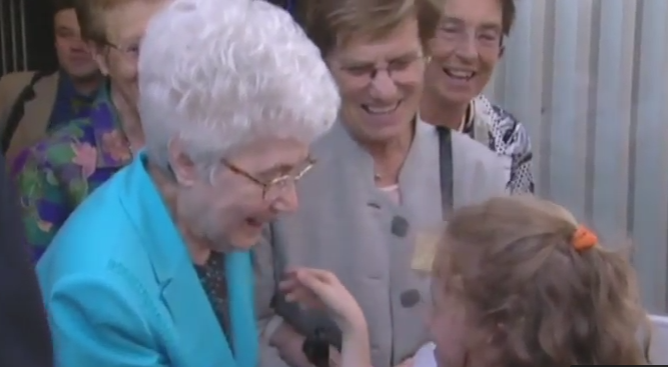
Feb 12, 2017 | Non categorizzato
 …Today the bond of a stable marriage appears almost to be in contradiction to personal freedom. Rather than stressing “relational” values, emphasis is placed on conflicts and differences. On a political level, institutions and governments draft these “matters of fact” into laws that are contrary to the overall wellbeing of the person. As a result, divorce, abortion, euthanasia and biogenetic experiments enter into people’s consciousness as things that are possible and therefore legitimate. The decline in the birth rate, living together before marriage and sexual anarchy become normal and even fashionable. How many separated and frustrated couples are there? How many children deprived of one or the other parent? How many children with addiction problems? How many people are caught up in the spiral of delinquency and prostitution? How many spouses and children are traumatized by wars? How many elderly people are abandoned? How many babies die of hunger every day? …We could create a graphic representation of the contemporary family by way of an image: a wounded and desolate mother who clutches the sufferings of humanity to her breast while crying out “Why?” to the heavens. …Yet, if we believe that behind the events of our lives, there is God with his love. If we are strengthened by this faith and recognize, in our own or others big and small daily sufferings, a shadow of the pain suffered by the crucified and forsaken Christ and our sharing in the suffering that redeemed the world, we can find meaning in the most absurd situations and put them in perspective. In the face of whatever suffering may come our way, big or small, and in the face of contradictions and problems that have no solutions, let’s try to enter within ourselves and look head on at the absurdity, injustice, innocent suffering, humiliation, alienation or desperation before us. It is there that we will recognize one of the many countenances of the “Man of Sorrows.” It is our meeting with him, the “divine person” who became an individual without relationships. He is the God of contemporary humanity, who transforms nothingness into being, suffering into love. Our “yes” to him and our readiness to love him and welcome him into our lives will enable us to go beyond our individualistic attitudes and turn us into new men and women who can heal and give new life in the most desperate situations through love. …These are not dreams. They are the everyday experiences of many families who, helped by the forsakenness of the God-Man, have transformed their tide of pain into new life. Sometimes, indeed often – the divisions are resolved and families reunited. At times, they are not: externally the situations may stay as they were, but the pain is illuminated, the anguish eased and the fracture overcome. At times, the physical or spiritual suffering lingers on but it acquires meaning when we unite our “passion” to the passion of Christ who continues to redeem and save the family and all of humanity. The burden becomes lighter. Therefore, the family can attempt to reacquire its original beauty according to its creator’s design by drawing from the source of love that Christ brought on earth. I believe that from that wellspring married couples and families can quench their thirst for authenticity, for continuous and limitless communion, and for values that are transcendent, lasting and always new. God himself can be present in their homes and share his life with them. Jesus said, “Where two or three are gathered in my name (= in my love), I am there among them” (Mt18:20). Families are being offered an incredible opportunity: to be the setting for God’s presence”. (Taken from Chiara Lubich’s talk “The family is the future” given in Lucerne, Switzerland on 16th May 1999). See the video
…Today the bond of a stable marriage appears almost to be in contradiction to personal freedom. Rather than stressing “relational” values, emphasis is placed on conflicts and differences. On a political level, institutions and governments draft these “matters of fact” into laws that are contrary to the overall wellbeing of the person. As a result, divorce, abortion, euthanasia and biogenetic experiments enter into people’s consciousness as things that are possible and therefore legitimate. The decline in the birth rate, living together before marriage and sexual anarchy become normal and even fashionable. How many separated and frustrated couples are there? How many children deprived of one or the other parent? How many children with addiction problems? How many people are caught up in the spiral of delinquency and prostitution? How many spouses and children are traumatized by wars? How many elderly people are abandoned? How many babies die of hunger every day? …We could create a graphic representation of the contemporary family by way of an image: a wounded and desolate mother who clutches the sufferings of humanity to her breast while crying out “Why?” to the heavens. …Yet, if we believe that behind the events of our lives, there is God with his love. If we are strengthened by this faith and recognize, in our own or others big and small daily sufferings, a shadow of the pain suffered by the crucified and forsaken Christ and our sharing in the suffering that redeemed the world, we can find meaning in the most absurd situations and put them in perspective. In the face of whatever suffering may come our way, big or small, and in the face of contradictions and problems that have no solutions, let’s try to enter within ourselves and look head on at the absurdity, injustice, innocent suffering, humiliation, alienation or desperation before us. It is there that we will recognize one of the many countenances of the “Man of Sorrows.” It is our meeting with him, the “divine person” who became an individual without relationships. He is the God of contemporary humanity, who transforms nothingness into being, suffering into love. Our “yes” to him and our readiness to love him and welcome him into our lives will enable us to go beyond our individualistic attitudes and turn us into new men and women who can heal and give new life in the most desperate situations through love. …These are not dreams. They are the everyday experiences of many families who, helped by the forsakenness of the God-Man, have transformed their tide of pain into new life. Sometimes, indeed often – the divisions are resolved and families reunited. At times, they are not: externally the situations may stay as they were, but the pain is illuminated, the anguish eased and the fracture overcome. At times, the physical or spiritual suffering lingers on but it acquires meaning when we unite our “passion” to the passion of Christ who continues to redeem and save the family and all of humanity. The burden becomes lighter. Therefore, the family can attempt to reacquire its original beauty according to its creator’s design by drawing from the source of love that Christ brought on earth. I believe that from that wellspring married couples and families can quench their thirst for authenticity, for continuous and limitless communion, and for values that are transcendent, lasting and always new. God himself can be present in their homes and share his life with them. Jesus said, “Where two or three are gathered in my name (= in my love), I am there among them” (Mt18:20). Families are being offered an incredible opportunity: to be the setting for God’s presence”. (Taken from Chiara Lubich’s talk “The family is the future” given in Lucerne, Switzerland on 16th May 1999). See the video
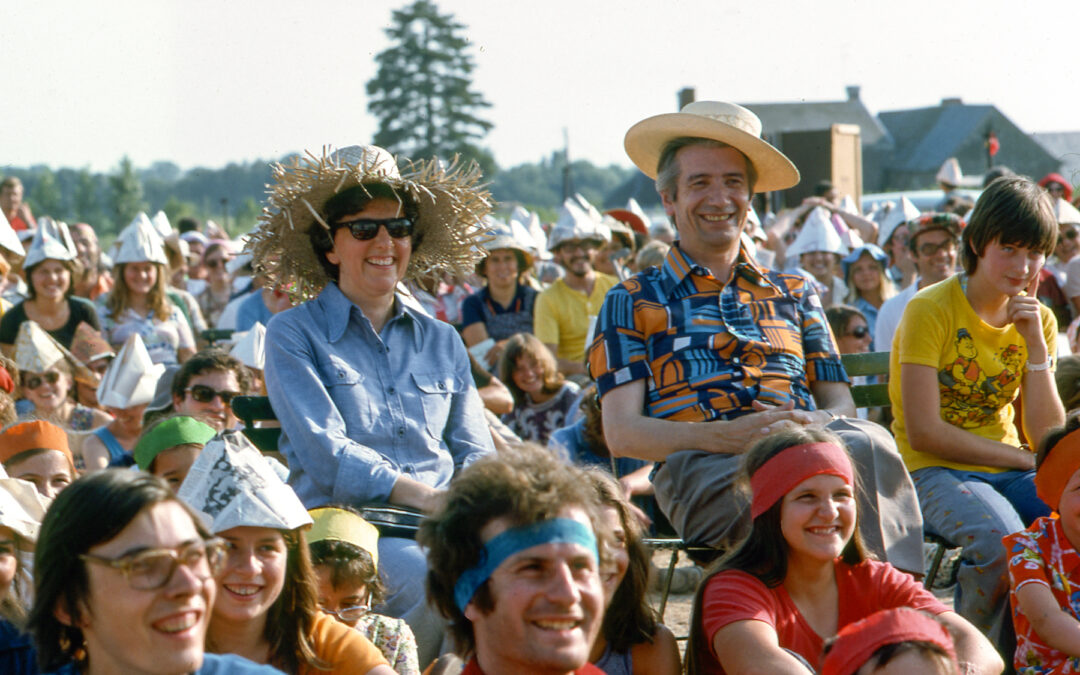
Feb 11, 2017 | Non categorizzato
 “I was born at a thousand metres in a small village of the Piedmont Prealps.” This is how Aldo Baima always began his story, grateful to the land that saw his birth and life in the company of his parents on the high mountain pastures where he grew. After elementary school, the teacher managed to convince his parents to allow Aldo to continue his studies, first in a college, and then as a commuter travelling on wagons meant for livestock. It was wartime. A priest invited him to attend a Youth Catholic Action Group: “Ten years of discoveries and apostolic endeavours,” Aldo would recall, which he threw himself into with great passion. He would return to his home pastures for the summer. A tourist who saw him holding a book on theology asked him if he intended to join the seminary. “No, not for anything!” answered Aldo. And when the girl replied: “Wouldn’t you rather be reading a love story?” Aldo declared: “But this is a very beautiful love story!” When he finished the Teaching Institute he began to work as a teacher. He enrolled at the University of Turin where he studied Pedagogy and Philosophy. He met an old friend from school there, who spoke to him about a unique experience begun in Trent by some girls who “are putting the Gospel in practice.” The conversation with his friend thickened, touching on deep questions, to the point that Aldo decided to base his own life on the practice of the Gospel. He was especially struck by one sentence that he had read and meditated on many times before, but now seemed to come alive: “Insofar as you did it to one of the least of these brothers of mine, you did it to me” (Mt 25:40). With decision he began to help the needy, discovering a brother in every poor person he met, and trying to involve his friends at the parish. In the summer of 1952 he spent a week at the focolare in Trent. Then he went to the mountains of Tondadico where the Mariapolis was taking place. “There, I had the intuition,” he confided, “that only by belonging to that family would that light and that life that I couldn’t do without really be mine.” He left his fiance and entered the focolare.
“I was born at a thousand metres in a small village of the Piedmont Prealps.” This is how Aldo Baima always began his story, grateful to the land that saw his birth and life in the company of his parents on the high mountain pastures where he grew. After elementary school, the teacher managed to convince his parents to allow Aldo to continue his studies, first in a college, and then as a commuter travelling on wagons meant for livestock. It was wartime. A priest invited him to attend a Youth Catholic Action Group: “Ten years of discoveries and apostolic endeavours,” Aldo would recall, which he threw himself into with great passion. He would return to his home pastures for the summer. A tourist who saw him holding a book on theology asked him if he intended to join the seminary. “No, not for anything!” answered Aldo. And when the girl replied: “Wouldn’t you rather be reading a love story?” Aldo declared: “But this is a very beautiful love story!” When he finished the Teaching Institute he began to work as a teacher. He enrolled at the University of Turin where he studied Pedagogy and Philosophy. He met an old friend from school there, who spoke to him about a unique experience begun in Trent by some girls who “are putting the Gospel in practice.” The conversation with his friend thickened, touching on deep questions, to the point that Aldo decided to base his own life on the practice of the Gospel. He was especially struck by one sentence that he had read and meditated on many times before, but now seemed to come alive: “Insofar as you did it to one of the least of these brothers of mine, you did it to me” (Mt 25:40). With decision he began to help the needy, discovering a brother in every poor person he met, and trying to involve his friends at the parish. In the summer of 1952 he spent a week at the focolare in Trent. Then he went to the mountains of Tondadico where the Mariapolis was taking place. “There, I had the intuition,” he confided, “that only by belonging to that family would that light and that life that I couldn’t do without really be mine.” He left his fiance and entered the focolare.  Years of generous giving followed: in Turin, Sassari, Rome, and from 1961 France. Because of his spiritual and moral integrity, young and old found in Aldo a trusted guide for their journey to God. In the face of difficult problems, his attitude was always one of deep listening. His limpid nature and openness to French culture won over many hearts and established relationships of true friendship. In 1975 he was ordained to the priesthood. In 1984 he was at the headquarters of the Movement to assist in the formation of the focolarini. Following that, he stayed in Istanbul before being transferred to the permanent Mariapolis in Montet, Switzerland. From 2001 he was once again at the Movement’s headquarters, at the service of focolarini around the world. This is where he his health began to be progressively more fragile which, in his own words: “the Father wants to finally place me in the conditions to enter into the mystery of the Abandonment and of the Resurrection that follows.” In 2005 he writes: “My certainty has been reborn that this year dedicated to Jesus Forsaken can also be the moment for me to respond to this new call. Time of salvation that comes from Him, time of grace that draws into his wound, to make us live in the bosom of the Father.” It was a grace that accompanied him through his years of nearly total immobility, in which he identified with Jesus Forsaken whom he had chosen in his youth. He died peacefully on January 12, 2017 at the age of ninety.
Years of generous giving followed: in Turin, Sassari, Rome, and from 1961 France. Because of his spiritual and moral integrity, young and old found in Aldo a trusted guide for their journey to God. In the face of difficult problems, his attitude was always one of deep listening. His limpid nature and openness to French culture won over many hearts and established relationships of true friendship. In 1975 he was ordained to the priesthood. In 1984 he was at the headquarters of the Movement to assist in the formation of the focolarini. Following that, he stayed in Istanbul before being transferred to the permanent Mariapolis in Montet, Switzerland. From 2001 he was once again at the Movement’s headquarters, at the service of focolarini around the world. This is where he his health began to be progressively more fragile which, in his own words: “the Father wants to finally place me in the conditions to enter into the mystery of the Abandonment and of the Resurrection that follows.” In 2005 he writes: “My certainty has been reborn that this year dedicated to Jesus Forsaken can also be the moment for me to respond to this new call. Time of salvation that comes from Him, time of grace that draws into his wound, to make us live in the bosom of the Father.” It was a grace that accompanied him through his years of nearly total immobility, in which he identified with Jesus Forsaken whom he had chosen in his youth. He died peacefully on January 12, 2017 at the age of ninety.
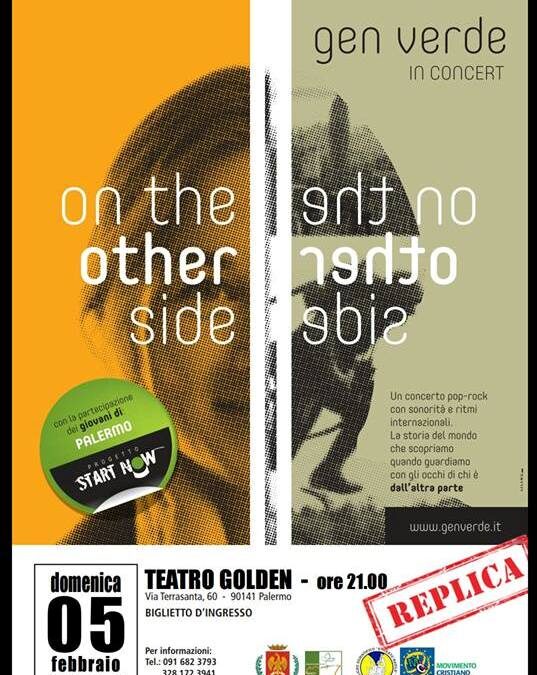
Feb 10, 2017 | Non categorizzato
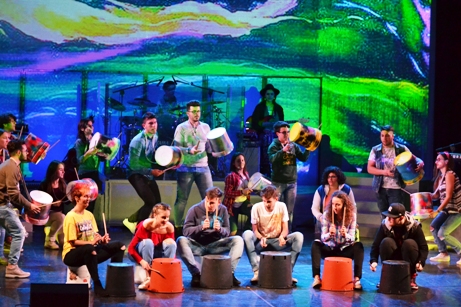 “Fulfilling, happiness, courage, family, unique experience, listening, diversity…” These were some of the keywords left behind in their comments by the teenagers from Liceo Basile school. They were also the main actors in three shows and workshops that kept them involved from January 31st – February 5th in Palermo, Italy. “Now, it’s as if I’ve become one of them, someone with a great ideal, believing that love really can overcome everything and that our hearts don’t have borders,” Irene writes. Ernesto Basile Scientific High School is considered an institutional outpost in Brancaccio, which is the quarter where Father Pino Puglisi had worked. He was murdered by the mafia in 1993 and is now a Blessed. There are social problems in the region and the problem of education is always an open question: the school drop-out rates are far from the national average. For this reason the many projects that are carried out by the school often represent the only way out. They focus on cultivating an awareness in the younger generations that they belong to a community. They also intend to give witness to a better lifestyle that goes against the norm, and to provide the opportunity to reflect on personal choices that can lead in a wrong direction.
“Fulfilling, happiness, courage, family, unique experience, listening, diversity…” These were some of the keywords left behind in their comments by the teenagers from Liceo Basile school. They were also the main actors in three shows and workshops that kept them involved from January 31st – February 5th in Palermo, Italy. “Now, it’s as if I’ve become one of them, someone with a great ideal, believing that love really can overcome everything and that our hearts don’t have borders,” Irene writes. Ernesto Basile Scientific High School is considered an institutional outpost in Brancaccio, which is the quarter where Father Pino Puglisi had worked. He was murdered by the mafia in 1993 and is now a Blessed. There are social problems in the region and the problem of education is always an open question: the school drop-out rates are far from the national average. For this reason the many projects that are carried out by the school often represent the only way out. They focus on cultivating an awareness in the younger generations that they belong to a community. They also intend to give witness to a better lifestyle that goes against the norm, and to provide the opportunity to reflect on personal choices that can lead in a wrong direction. 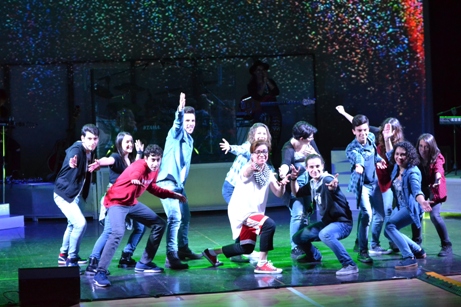 The almost accidental encounter with Gen Verde last May ignited a desire in the young people to make the Start Now project happen in their own school, just as it had in several European and Asian cities. “Tons of enthusiasm” for this event. The workshops that involved hundreds of young people were places to experience their own creativity and discover their own talents. They did side by side with the band members as actors, sharing in the different artistic experiences with mutual listening and respect. PalaOreto, February 3. The young people stepped on stage with Gen Verde in front of a crowd of thousands of teenagers from the schools in the neighborhood. It happened again on the following Sunday at the Golden Theatre.
The almost accidental encounter with Gen Verde last May ignited a desire in the young people to make the Start Now project happen in their own school, just as it had in several European and Asian cities. “Tons of enthusiasm” for this event. The workshops that involved hundreds of young people were places to experience their own creativity and discover their own talents. They did side by side with the band members as actors, sharing in the different artistic experiences with mutual listening and respect. PalaOreto, February 3. The young people stepped on stage with Gen Verde in front of a crowd of thousands of teenagers from the schools in the neighborhood. It happened again on the following Sunday at the Golden Theatre. 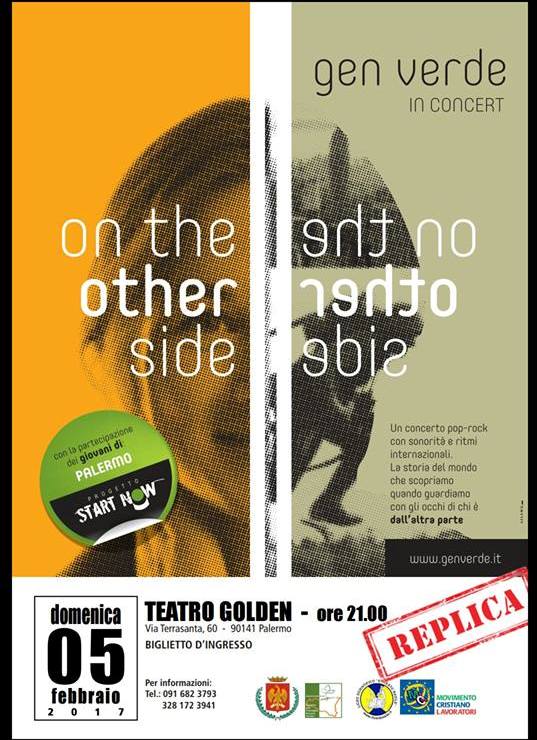 Excited but secure in their performance, they gave the best of themselves in the choreographies, songs, dances and theatre in a way that drew in the audience. Above all, they lived an experience that was unique unto itself, an experience that doesn’t conceive of “walls” and that lifted up the differences and diversity, showing how marginalization can be overcome. “The day after had a sense of nostalgia, but now it was different: It had the sense of a challenge! Good Start to all off us, small warriors on the outskirts!” wrote a teacher on her Facebook page, who helped promote the event. That’s the dream of those who interact with these young people every day, standing against marginalization and uneasiness with creativity and positive stimulation, helping others to not remain closed in their own everyday environments, promoting an inclusive environment at school that embraces all the sides of a person.
Excited but secure in their performance, they gave the best of themselves in the choreographies, songs, dances and theatre in a way that drew in the audience. Above all, they lived an experience that was unique unto itself, an experience that doesn’t conceive of “walls” and that lifted up the differences and diversity, showing how marginalization can be overcome. “The day after had a sense of nostalgia, but now it was different: It had the sense of a challenge! Good Start to all off us, small warriors on the outskirts!” wrote a teacher on her Facebook page, who helped promote the event. That’s the dream of those who interact with these young people every day, standing against marginalization and uneasiness with creativity and positive stimulation, helping others to not remain closed in their own everyday environments, promoting an inclusive environment at school that embraces all the sides of a person.
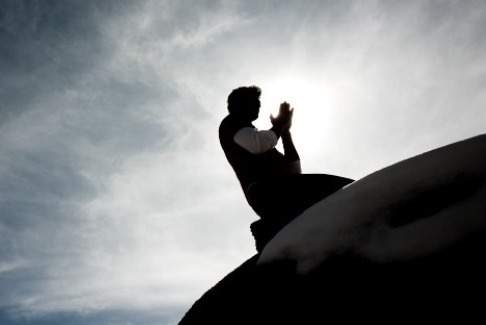
Feb 9, 2017 | Focolare Worldwide
 I was about to finish high school. I have been fascinated by Africa ever since I was a child, and especially when I would listen to the tales of my uncle, a missionary in Congo. I didn’t like the bourgeoisie lifestyle of Belgian society, and the poverty and social injustices diffused in the world. I was interested in the philosophy of Julius Nyerere (whose beatification process is now underway), the first President of Tanzania. His concept of Ujamaa (in Swahili meaning ‘being a family’) was at the base of the socioeconomic development policies which in Tanzania had brought about the construction of a pacific coexistence between tribes and ethnic groups, after Great Britain had granted independence. His thoughts were based on African traditions and examples of the first Christian communities described in the Acts of the Apostles. I applied to enter the White Fathers congregation, not so much due to a vocational choice, but because they worked in Tanzania. We agreed to do a year of acquaintance. Once I got to their mother house at the Lovanio University (Belgium), without their knowing it I had started to take part in an extremely leftist Maoist group. We would organize initiatives in favour of the third-world countries and for the independence of Angola and Mozambique. During a demonstration, the police found my name on one of the fliers and came to interrogate me. I thought that it would be better to change my path completely. Furthermore I was disappointed in my friends, since only I was paying the price of our actions. Instead, the spiritual director invited me to stay and meet a group of students that held monthly meetings in the convent. I had seen them fleetingly, and they seemed to have their minds in the clouds; they spoke of Jesus and the Gospel. But I accepted the invitation. The first time I participated in one of their meetings, I listened in silence. They recounted of how they tried to put the Gospel into practice. In the end they asked me what I thought. «The Gospel has existed for two thousand years, and the world is still full of injustice, exploitation and oppression.» One of them answered: «If you want to change the world, start from yourself.» I didn’t know how to reply. I asked, «From where?» He put the “Word of Life” of that month in my hand: «Do not judge and you will not be judged.» The next day, as much as I tried, I found myself always judging the others. This was not my piece of bread. I went back to meet them, to say that it was impossible not to judge. They exhorted me not to get discouraged and to try again after every failure. I returned home, and prayed to Jesus in the Eucharist: «If You want me to live in this way, help me, since I can’t do anything alone.» When the school year passed, I was sure that the Fathers would ask me to leave. Instead they told me that they had noticed a change in me, and if I wanted, I could start in the novitiate. Through frequent contact with those youths, the gen who lived the communion of good among themselves, and with the help of the Focolare director in Belgium, I found my path and became a missionary. Living for the others gave immense joy and this was how I discovered the great ideal of unity of Chiara Lubich and the Movement. Before leaving for Africa in 1982 I was ordained a priest. The biggest challenge was that of seeking deep dialogue with the local people and practising the art of “making yourself one.” I studied their language and the local culture, to make the people’s customs my very own. I experienced that in the light of the Gospel, all that is beautiful, good and true is raised to a higher level, and the rest slowly disappears.
I was about to finish high school. I have been fascinated by Africa ever since I was a child, and especially when I would listen to the tales of my uncle, a missionary in Congo. I didn’t like the bourgeoisie lifestyle of Belgian society, and the poverty and social injustices diffused in the world. I was interested in the philosophy of Julius Nyerere (whose beatification process is now underway), the first President of Tanzania. His concept of Ujamaa (in Swahili meaning ‘being a family’) was at the base of the socioeconomic development policies which in Tanzania had brought about the construction of a pacific coexistence between tribes and ethnic groups, after Great Britain had granted independence. His thoughts were based on African traditions and examples of the first Christian communities described in the Acts of the Apostles. I applied to enter the White Fathers congregation, not so much due to a vocational choice, but because they worked in Tanzania. We agreed to do a year of acquaintance. Once I got to their mother house at the Lovanio University (Belgium), without their knowing it I had started to take part in an extremely leftist Maoist group. We would organize initiatives in favour of the third-world countries and for the independence of Angola and Mozambique. During a demonstration, the police found my name on one of the fliers and came to interrogate me. I thought that it would be better to change my path completely. Furthermore I was disappointed in my friends, since only I was paying the price of our actions. Instead, the spiritual director invited me to stay and meet a group of students that held monthly meetings in the convent. I had seen them fleetingly, and they seemed to have their minds in the clouds; they spoke of Jesus and the Gospel. But I accepted the invitation. The first time I participated in one of their meetings, I listened in silence. They recounted of how they tried to put the Gospel into practice. In the end they asked me what I thought. «The Gospel has existed for two thousand years, and the world is still full of injustice, exploitation and oppression.» One of them answered: «If you want to change the world, start from yourself.» I didn’t know how to reply. I asked, «From where?» He put the “Word of Life” of that month in my hand: «Do not judge and you will not be judged.» The next day, as much as I tried, I found myself always judging the others. This was not my piece of bread. I went back to meet them, to say that it was impossible not to judge. They exhorted me not to get discouraged and to try again after every failure. I returned home, and prayed to Jesus in the Eucharist: «If You want me to live in this way, help me, since I can’t do anything alone.» When the school year passed, I was sure that the Fathers would ask me to leave. Instead they told me that they had noticed a change in me, and if I wanted, I could start in the novitiate. Through frequent contact with those youths, the gen who lived the communion of good among themselves, and with the help of the Focolare director in Belgium, I found my path and became a missionary. Living for the others gave immense joy and this was how I discovered the great ideal of unity of Chiara Lubich and the Movement. Before leaving for Africa in 1982 I was ordained a priest. The biggest challenge was that of seeking deep dialogue with the local people and practising the art of “making yourself one.” I studied their language and the local culture, to make the people’s customs my very own. I experienced that in the light of the Gospel, all that is beautiful, good and true is raised to a higher level, and the rest slowly disappears.
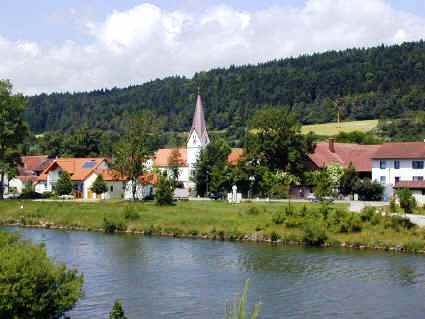
Feb 8, 2017 | Focolare Worldwide
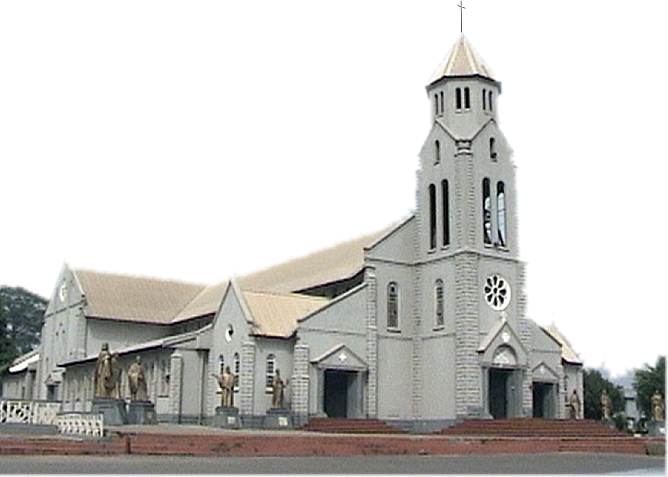 From Onitsha, Nigeria, a report about a prayer service that was held in the churchyard of the Basilica of the Most Blessed Holy Trinity, on January 23 with over a hundred Evanglicals, Pentecostals, Catholics and members of autonomous churches, along with two bishops and several priests of different churches in Nigeria. The event was promoted by the Focolare and included representatives from the CCN (non-denominational churches), OAIC (churches and organisations begun in Africa), PFN (Pentecostal churches), CSN (Catholic Church) and ECWA/TEKAN (Evangelical Churches from the west of Africa and Ghana). Some gathered with the music groups, others prepared the programme booklet and others decorated the churchyard. The teaching was given by an Anglican Pastor who like a “clarion call that would wake up the Christians of Nigeria from their sleep” invited us all to “live as the followers of Christ and to work of unity in diversity.” “We prayed with one soul and one mind,” one girl commented. “I felt the warmth of the Spirit in our midst.” A young man: “Watching people from different churches praying together for unity and peace gave me the certainty that unity will happen, because Jesus himself had asked the Father that all would be one.”
From Onitsha, Nigeria, a report about a prayer service that was held in the churchyard of the Basilica of the Most Blessed Holy Trinity, on January 23 with over a hundred Evanglicals, Pentecostals, Catholics and members of autonomous churches, along with two bishops and several priests of different churches in Nigeria. The event was promoted by the Focolare and included representatives from the CCN (non-denominational churches), OAIC (churches and organisations begun in Africa), PFN (Pentecostal churches), CSN (Catholic Church) and ECWA/TEKAN (Evangelical Churches from the west of Africa and Ghana). Some gathered with the music groups, others prepared the programme booklet and others decorated the churchyard. The teaching was given by an Anglican Pastor who like a “clarion call that would wake up the Christians of Nigeria from their sleep” invited us all to “live as the followers of Christ and to work of unity in diversity.” “We prayed with one soul and one mind,” one girl commented. “I felt the warmth of the Spirit in our midst.” A young man: “Watching people from different churches praying together for unity and peace gave me the certainty that unity will happen, because Jesus himself had asked the Father that all would be one.”  From the Focolare’s ecumenical town in Ottmaring, Germany, on the Week of Prayer for Christian Unity, a gathering was held that included 7 Swedish Lutheran pastors, 4 Anglicans, one English Reformed pastor and 7 Catholic priests. The theme was presented by Lutheran bishop Ake di Skara from Sweden, who highlighted how today Jesus is still drawn to the wounds and darkness of humanity, in order to bring it light. With this in mind everyone moved to the nearby Nazi concentration camp of Dachau, which is an emblematic symbol of the mystery of Jesus Forsaken. There were also several visits to significant sites for the Lutheran faithful in Augsburg, concluding with a break at the Catholic church dedicated to St. Moritz, with its striking image of Christ the Saviour who illuminates the world’s darkness. In an atmosphere of such deep sharing, the liturgical celebrations throughout the week took on an altogether unique sacredness. In the end there was a unanimous desire to: “return to the world where Jesus Forsaken is waiting for me.” “The Church has to be where the wounds of the people are to be found.” “When I get home the first thing I’ll do will be to visit the Lutheran pastor next door.” In Matera, Italy, we met up with Cinzia who, since she embraced the spirituality of unity, has been promoting an ecumenical process in her parish in collaboration with a Lutheran pastor: “They’re beautiful evenings and filled with much joy,” she recounts, “in which what comes to light is not what divides us, but what unites us. An ecumenical choir was born from the 1997 Week of Prayer for Christian Unity, which accompanies the different cultural and humanitarian projects we do together. This year, in collaboration with the associations and movements in the city, we held a march for peace and unity with 300 people from different Christian denominations and from other religions. It was another opportunity to experience the ecumenism of life and to express that deep desire for brotherhood that goes beyond the distinctions.” The parish of Santa Maria in Pesaro, Italy, shares an ecumenical friendship with the Orthodox Cathedral of Resita, Romania, thanks to the parish priests and several lay people who live the spirituality of unity. “This year,” one Romanian Orthodox teenager recounts, “we wanted to take a further step. The young people wanted to be involved in the formation of the children, so we began a course in Pesaro for Catholic and Orthodox animators together where we experience our unity in diversity.” In Cochabamba, Bolivia, the Week of Prayer for Christian Unity was also celebrated by the different movements, including the Focolare. Members of the Anglican, Methodist and Catholic Churches took part in an ecumenical prayer service, with the emeritus bishop who remembered the 500th anniversary of the Reformation and invited everyone to embrace mercy and a renewed commitment to work for unity. See also: Ecumenismo: Settimana dell’unità Settimana dell’unità a L’Avana
From the Focolare’s ecumenical town in Ottmaring, Germany, on the Week of Prayer for Christian Unity, a gathering was held that included 7 Swedish Lutheran pastors, 4 Anglicans, one English Reformed pastor and 7 Catholic priests. The theme was presented by Lutheran bishop Ake di Skara from Sweden, who highlighted how today Jesus is still drawn to the wounds and darkness of humanity, in order to bring it light. With this in mind everyone moved to the nearby Nazi concentration camp of Dachau, which is an emblematic symbol of the mystery of Jesus Forsaken. There were also several visits to significant sites for the Lutheran faithful in Augsburg, concluding with a break at the Catholic church dedicated to St. Moritz, with its striking image of Christ the Saviour who illuminates the world’s darkness. In an atmosphere of such deep sharing, the liturgical celebrations throughout the week took on an altogether unique sacredness. In the end there was a unanimous desire to: “return to the world where Jesus Forsaken is waiting for me.” “The Church has to be where the wounds of the people are to be found.” “When I get home the first thing I’ll do will be to visit the Lutheran pastor next door.” In Matera, Italy, we met up with Cinzia who, since she embraced the spirituality of unity, has been promoting an ecumenical process in her parish in collaboration with a Lutheran pastor: “They’re beautiful evenings and filled with much joy,” she recounts, “in which what comes to light is not what divides us, but what unites us. An ecumenical choir was born from the 1997 Week of Prayer for Christian Unity, which accompanies the different cultural and humanitarian projects we do together. This year, in collaboration with the associations and movements in the city, we held a march for peace and unity with 300 people from different Christian denominations and from other religions. It was another opportunity to experience the ecumenism of life and to express that deep desire for brotherhood that goes beyond the distinctions.” The parish of Santa Maria in Pesaro, Italy, shares an ecumenical friendship with the Orthodox Cathedral of Resita, Romania, thanks to the parish priests and several lay people who live the spirituality of unity. “This year,” one Romanian Orthodox teenager recounts, “we wanted to take a further step. The young people wanted to be involved in the formation of the children, so we began a course in Pesaro for Catholic and Orthodox animators together where we experience our unity in diversity.” In Cochabamba, Bolivia, the Week of Prayer for Christian Unity was also celebrated by the different movements, including the Focolare. Members of the Anglican, Methodist and Catholic Churches took part in an ecumenical prayer service, with the emeritus bishop who remembered the 500th anniversary of the Reformation and invited everyone to embrace mercy and a renewed commitment to work for unity. See also: Ecumenismo: Settimana dell’unità Settimana dell’unità a L’Avana
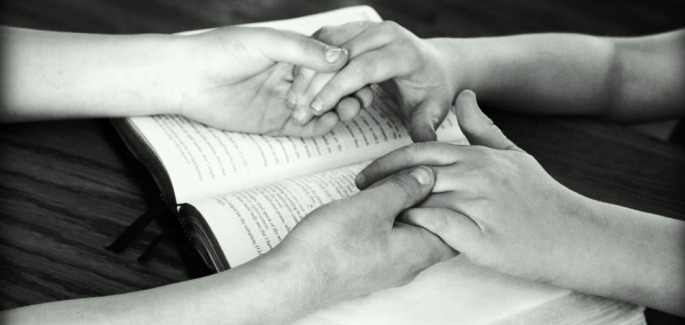
Feb 7, 2017 | Non categorizzato
 Head of the Class Ever since I heard such new things about God-Love I can’t be disturbing at school, doodling at my desk. The teacher even noticed the change in me and appointed me head of the class. Now it’s difficult for me to point out my classmates bad conduct, because I try to see Jesus in them and feel bad when they are punished. One day, since I didn’t, another student went to report three of us. To avoid their punishment, I convinced the teacher to let them clean the classroom, and after class I went to help them. Since then, little by little, the atmosphere in class is beginning to improve. (Victoria – Uganda) Fundraising When I learned that the father of a large poor family needed emergency surgery and didn’t have the money for the operation, some friends and I began a fundraiser with our colleagues at work. When we had the money, I accompanied the father to hospital and paid for the medical treatment. The operation went well. I don’t know who was happier, the family or us! I think that small gestures such as these also help contribute to peace. ( N. Y.- Jordan) In the airport At the baggage control there was a passenger in front of me who was quite upset because he had to leave behind a jar of jam. “Well, at least don’t throw it out, because it’s special!” When I got through baggage control that same person told me that the jam had been made by his mother for her grandchildren. “All her love is in those bottles,” he added. After a silent pause: “Why does the world have to be goverened by fear? Yes, I understand, with all that’s going on . . . but even the social infrastructure itself instills fear and mistrust. Where has the beauty gone in life?” I didn’t have answers, only the same questions. Meanwhile, a little girl was smiling as she passed in front of us in a wheelchair. We looked at her and that happy little face completely silenced us. All you need is a smile and even an aiport gets lit up. (C. M. – Austria) Praying together I was in the oncology department for examinations and treatment. It was an opportunity to love others with small concrete gestures and sharing in their suffering. That day my roomate – a stocky farmer of rude appearance – was about to undergo chemo. Just then he received news from the doctor and nurse that his son had died and the man’s therapy was postponed so that he could return home. I watched as his body bent beneath the tremendous shock. When we were alone and he was preparing his bag and weeping, I gathered my courage and with gentleness and respect asked him if he ever prayed. When he said yes, I invited him to pray the Our Father together for his son. It struck me as I watched that 73 year-old man join his hands and pray. And I thanked God that I dared to ask him to pray together. (Pablo – Philippines)
Head of the Class Ever since I heard such new things about God-Love I can’t be disturbing at school, doodling at my desk. The teacher even noticed the change in me and appointed me head of the class. Now it’s difficult for me to point out my classmates bad conduct, because I try to see Jesus in them and feel bad when they are punished. One day, since I didn’t, another student went to report three of us. To avoid their punishment, I convinced the teacher to let them clean the classroom, and after class I went to help them. Since then, little by little, the atmosphere in class is beginning to improve. (Victoria – Uganda) Fundraising When I learned that the father of a large poor family needed emergency surgery and didn’t have the money for the operation, some friends and I began a fundraiser with our colleagues at work. When we had the money, I accompanied the father to hospital and paid for the medical treatment. The operation went well. I don’t know who was happier, the family or us! I think that small gestures such as these also help contribute to peace. ( N. Y.- Jordan) In the airport At the baggage control there was a passenger in front of me who was quite upset because he had to leave behind a jar of jam. “Well, at least don’t throw it out, because it’s special!” When I got through baggage control that same person told me that the jam had been made by his mother for her grandchildren. “All her love is in those bottles,” he added. After a silent pause: “Why does the world have to be goverened by fear? Yes, I understand, with all that’s going on . . . but even the social infrastructure itself instills fear and mistrust. Where has the beauty gone in life?” I didn’t have answers, only the same questions. Meanwhile, a little girl was smiling as she passed in front of us in a wheelchair. We looked at her and that happy little face completely silenced us. All you need is a smile and even an aiport gets lit up. (C. M. – Austria) Praying together I was in the oncology department for examinations and treatment. It was an opportunity to love others with small concrete gestures and sharing in their suffering. That day my roomate – a stocky farmer of rude appearance – was about to undergo chemo. Just then he received news from the doctor and nurse that his son had died and the man’s therapy was postponed so that he could return home. I watched as his body bent beneath the tremendous shock. When we were alone and he was preparing his bag and weeping, I gathered my courage and with gentleness and respect asked him if he ever prayed. When he said yes, I invited him to pray the Our Father together for his son. It struck me as I watched that 73 year-old man join his hands and pray. And I thanked God that I dared to ask him to pray together. (Pablo – Philippines)
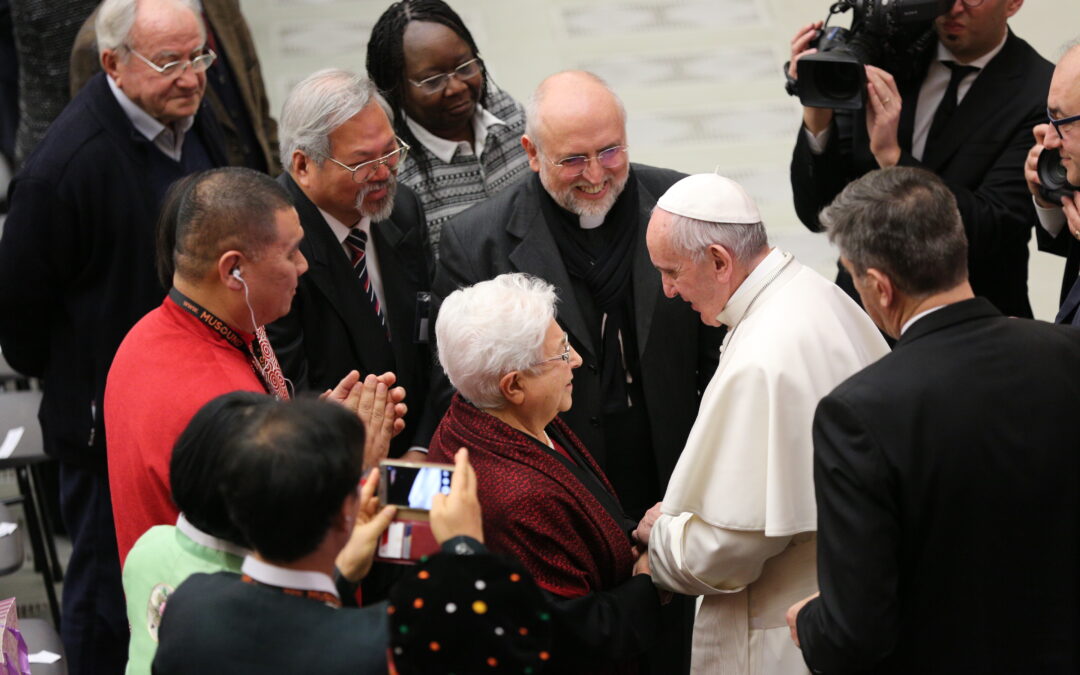
Feb 4, 2017 | Non categorizzato
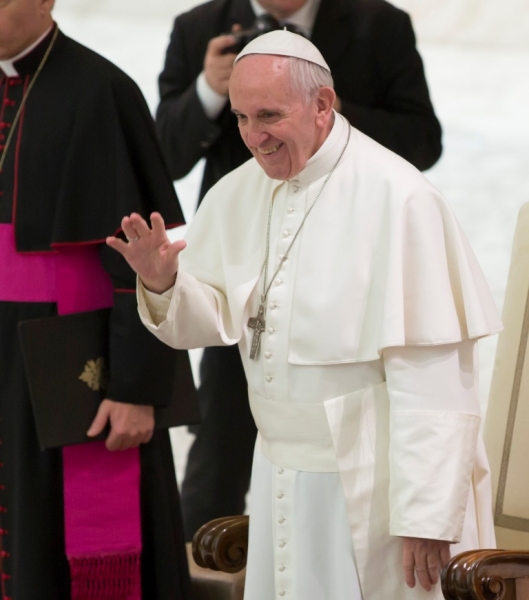 “Economy and communion. These are two words that contemporary culture keeps separate and often considers opposites. Two words that you have instead joined, accepting the invitation that Chiara Lubich offered you 25 years ago in Brazil, when, in the face of the scandal of inequality in the city of Sao Paulo, she asked entrepreneurs to become agents of communion”. Pope Francis said these words in his welcoming speech to 1200 entrepreneurs, young people and scholars who came together to celebrate the 25 years of life of the Economy of Communion. In the opening sentence of his address he said that he was pleased to welcome representatives of a project “in which I have been genuinely interested for some time”. “With your life you demonstrate that economy and communion become more beautiful when they are beside each other. Certainly the economy becomes more beautiful, but communion is also more beautiful, because the spiritual commnuion of hearts is even fuller when it becomes communion of goods, of talents, of profits”.
“Economy and communion. These are two words that contemporary culture keeps separate and often considers opposites. Two words that you have instead joined, accepting the invitation that Chiara Lubich offered you 25 years ago in Brazil, when, in the face of the scandal of inequality in the city of Sao Paulo, she asked entrepreneurs to become agents of communion”. Pope Francis said these words in his welcoming speech to 1200 entrepreneurs, young people and scholars who came together to celebrate the 25 years of life of the Economy of Communion. In the opening sentence of his address he said that he was pleased to welcome representatives of a project “in which I have been genuinely interested for some time”. “With your life you demonstrate that economy and communion become more beautiful when they are beside each other. Certainly the economy becomes more beautiful, but communion is also more beautiful, because the spiritual commnuion of hearts is even fuller when it becomes communion of goods, of talents, of profits”. 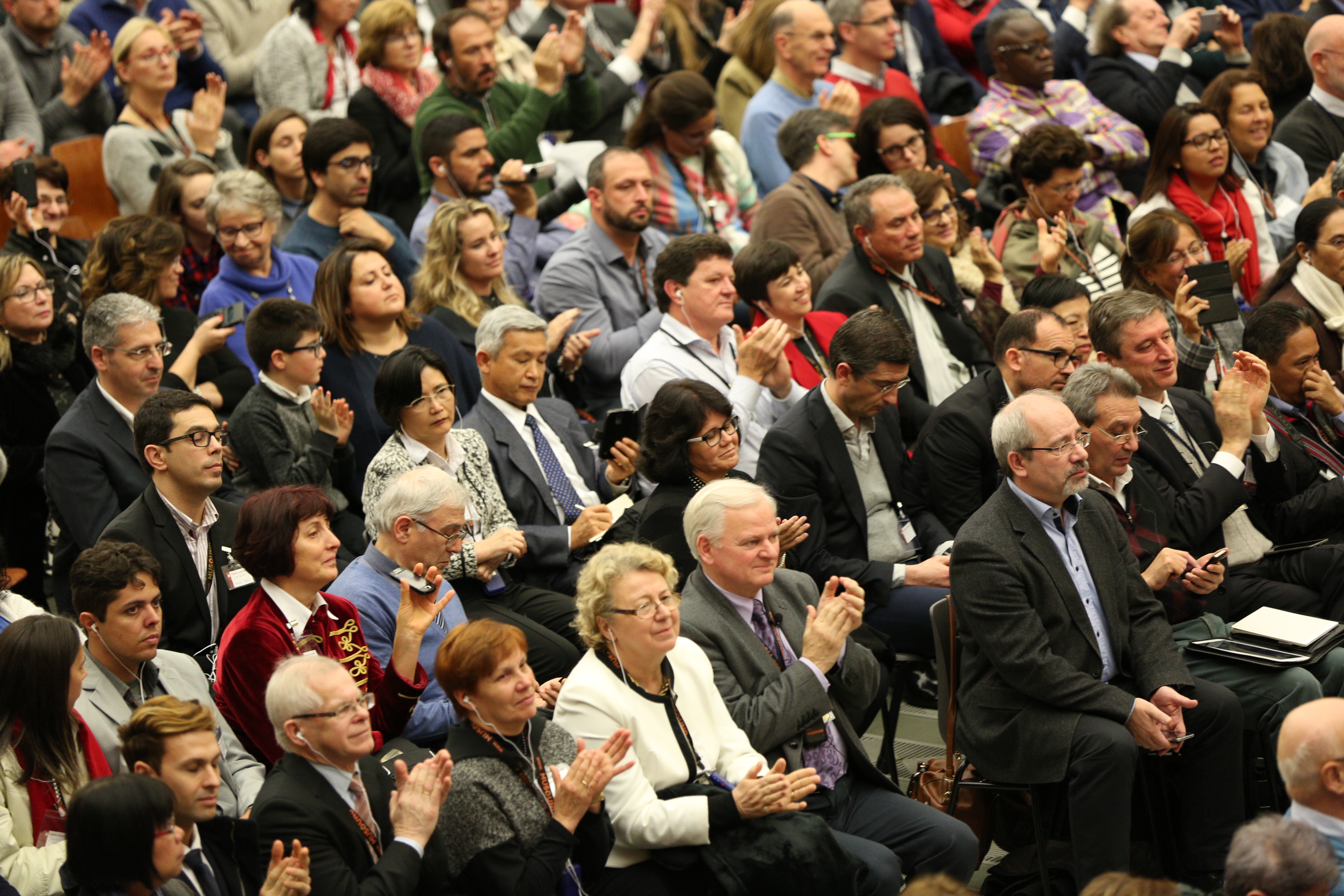 In his message to the extremely attentive gathering, Pope Francis expressed hope and recommendations on three main points. The first concerns money. “It is very important that at the centre of the economy of communion there be the communion of your profits. The Economy of Communion is also the communion of profits, an expression of the communion of life”. “Money”, he said “becomes an idol when it becomes the aim (…). It was Jesus who defined money as a ‘master’: ‘No man can serve two masters”. And he continued: “Thus, one understands the ethical and spiritual value of your choice to pool profits. The best and most practical way to avoid making an idol of money is to share it with others, above all with the poor (…). When you share and donate your profits, you are performing an act of lofty spirituality, saying to money through your deeds: you are not God, you are not lord, you are not master!” The second concerns poverty. “The principal ethical dilemma of this capitalism is the creation of discarded people, then trying to hide them or make sure they are no longer seen (…). Aircraft pollute the atmosphere, but, with a small part of the cost of the ticket, they will plant trees to compensate for the damage created. Gambling companies finance campaigns to care for the pathological gamblers that they create. And the day that the weapons industry finances hospitals to care for the children mutilated by their bombs, the system will have reached its pinnacle. This is hypocrisy!”. Faced with this abominable situation “the Economy of Communion, if it wants to be faithful to its charism, must not only care for victims, but build a system where there are ever fewer victims, where, possibly, there may no longer be any. As long as the economy still produces one victim and there is still a single discarded person, communion has not yet been realized; the celebration of universal fraternity is not full”.
In his message to the extremely attentive gathering, Pope Francis expressed hope and recommendations on three main points. The first concerns money. “It is very important that at the centre of the economy of communion there be the communion of your profits. The Economy of Communion is also the communion of profits, an expression of the communion of life”. “Money”, he said “becomes an idol when it becomes the aim (…). It was Jesus who defined money as a ‘master’: ‘No man can serve two masters”. And he continued: “Thus, one understands the ethical and spiritual value of your choice to pool profits. The best and most practical way to avoid making an idol of money is to share it with others, above all with the poor (…). When you share and donate your profits, you are performing an act of lofty spirituality, saying to money through your deeds: you are not God, you are not lord, you are not master!” The second concerns poverty. “The principal ethical dilemma of this capitalism is the creation of discarded people, then trying to hide them or make sure they are no longer seen (…). Aircraft pollute the atmosphere, but, with a small part of the cost of the ticket, they will plant trees to compensate for the damage created. Gambling companies finance campaigns to care for the pathological gamblers that they create. And the day that the weapons industry finances hospitals to care for the children mutilated by their bombs, the system will have reached its pinnacle. This is hypocrisy!”. Faced with this abominable situation “the Economy of Communion, if it wants to be faithful to its charism, must not only care for victims, but build a system where there are ever fewer victims, where, possibly, there may no longer be any. As long as the economy still produces one victim and there is still a single discarded person, communion has not yet been realized; the celebration of universal fraternity is not full”. 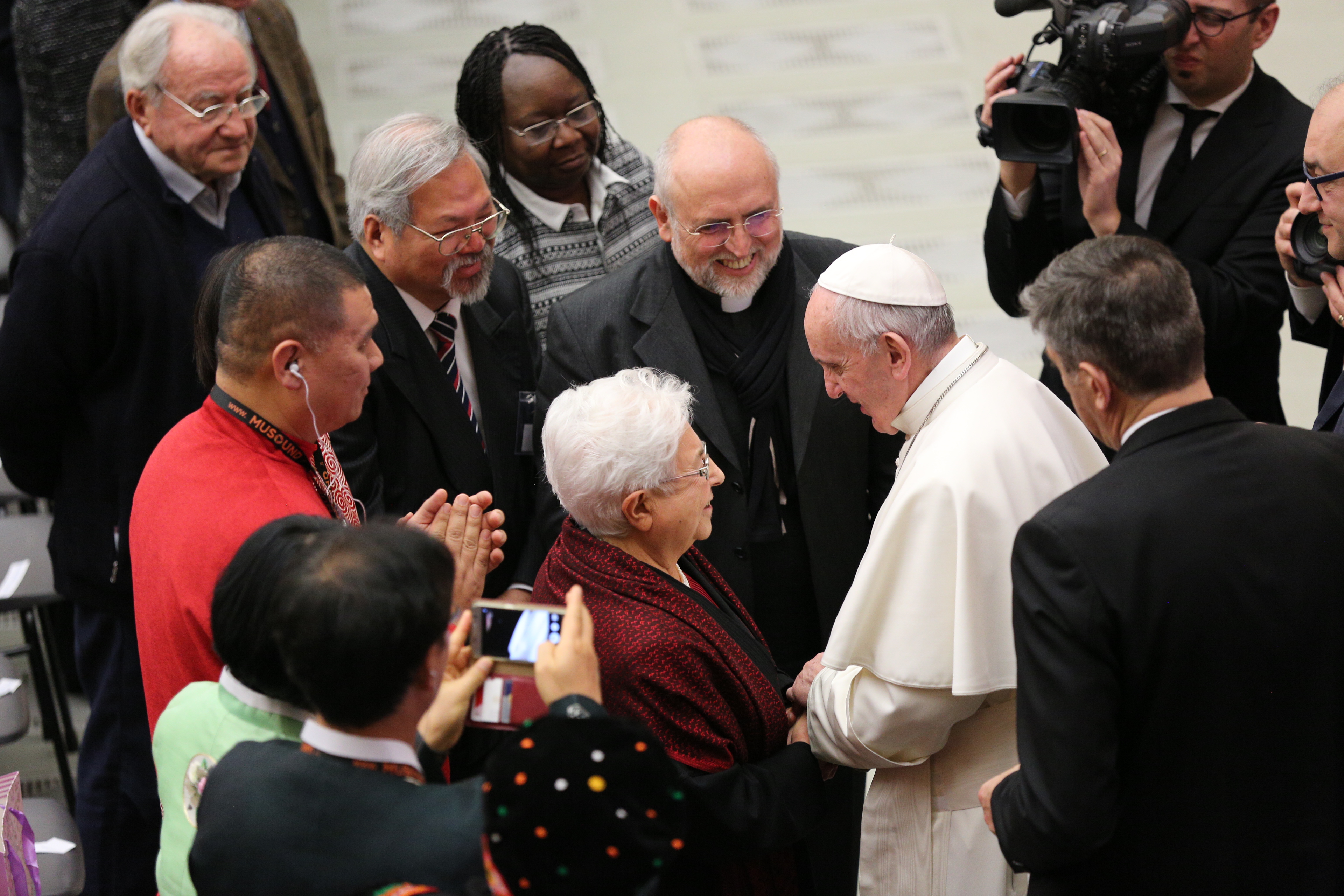 The third point concerns the future. «These 25 years of your history say that communion and business can exist and grow together” , an experience limited to a small number of businesses when compared to the world’s great capital, “but the changes in the order of the spirit and therefore of life are not linked to big numbers. The small flock, the lamp, a coin, a lamb, a pearl, salt, leaven: these are the images of the Kingdom we encounter in the Gospels (…). It is not necessary to be in a large group to change our life: suffice it that the sale and the leaven do not deteriorate (…). Salt does not do its job by increasing in quantity – instead too much salt makes the meal salty – but by saving its ‘spirit’, its quality”. While recalling the time when there were no refrigerators and the mother dough was shared to make bread, the Pope encouraged the Economy of Communion entrepreneurs “not to lose the active ingredient, the ‘enzyme’ of communion”, by living “reciprocity”. “Communion is not only the sharing but also the multiplying goods, the creation of new bread, of new goods, of new Good with a capital ‘G’”. He invited those present to: “Give it to everyone, firstly to the poor and the young (…). Capitalism knows philanthropy, not communion”. At the end of his speech Pope Francis said: “You already do these things. But you can share more profits in order to combat idolatry, change structures in order to prevent the creation of victims ‘ and discarded people; give more of your leaven so as to leaven the bread of many. May the ‘no’ to an economy that kills, become a ‘yes’ to an economy that lets live, because it shares, includes the poor, uses profits to create communion». «I hope you continue on your path, with courage, humilty, and joy…, continue to be the seed, salt and leaven of another economy: the economy of the Kingdom, where the rich know how to share their wealth, and the poor are called “blessed”. This new awareness makes one look ahead with joy and a renewed commitment. Press Releases
The third point concerns the future. «These 25 years of your history say that communion and business can exist and grow together” , an experience limited to a small number of businesses when compared to the world’s great capital, “but the changes in the order of the spirit and therefore of life are not linked to big numbers. The small flock, the lamp, a coin, a lamb, a pearl, salt, leaven: these are the images of the Kingdom we encounter in the Gospels (…). It is not necessary to be in a large group to change our life: suffice it that the sale and the leaven do not deteriorate (…). Salt does not do its job by increasing in quantity – instead too much salt makes the meal salty – but by saving its ‘spirit’, its quality”. While recalling the time when there were no refrigerators and the mother dough was shared to make bread, the Pope encouraged the Economy of Communion entrepreneurs “not to lose the active ingredient, the ‘enzyme’ of communion”, by living “reciprocity”. “Communion is not only the sharing but also the multiplying goods, the creation of new bread, of new goods, of new Good with a capital ‘G’”. He invited those present to: “Give it to everyone, firstly to the poor and the young (…). Capitalism knows philanthropy, not communion”. At the end of his speech Pope Francis said: “You already do these things. But you can share more profits in order to combat idolatry, change structures in order to prevent the creation of victims ‘ and discarded people; give more of your leaven so as to leaven the bread of many. May the ‘no’ to an economy that kills, become a ‘yes’ to an economy that lets live, because it shares, includes the poor, uses profits to create communion». «I hope you continue on your path, with courage, humilty, and joy…, continue to be the seed, salt and leaven of another economy: the economy of the Kingdom, where the rich know how to share their wealth, and the poor are called “blessed”. This new awareness makes one look ahead with joy and a renewed commitment. Press Releases
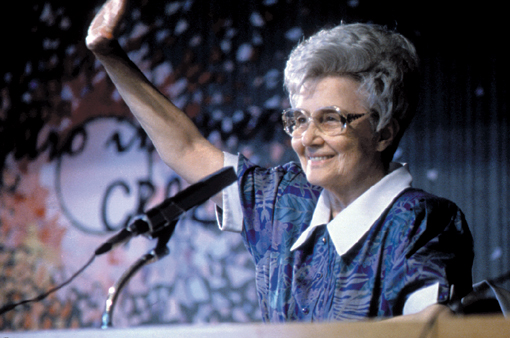
Feb 4, 2017 | Non categorizzato
 “You know that the idea of the Economy of Communion has awakened latent energies in many of us (from the youngest to the oldest). It has prompted important and demanding decisions and shown ways of making what seemed unbelievable dreams come true. You also know it has triggered the mechanism of “giving” so that almost everyone, we can say, is committed in offering services, prayers, energy and money; in offering to move, to give land, homes and jewellery. You know too that seeds of promising business enterprises, aimed at sharing part of their profits with those in need, are already blossoming like a new springtime everywhere. You know that places in which “new people” will be trained are rising up as if by magic and that the little towns are multiplying. Now, in order for everything to grow and mature, we must strengthen this virtue of “giving”, so that it becomes a habit for us. The enthusiasm with which the Economy of Communion began has to remain alive within us and grow. We must not disappoint the great hopes and expectations of the needy, as well as the explicit and often enlightened words of encouragement from religious leaders, economists, business people and other experts. We must keep the Economy of Communion alive in all its aspects, until there is no longer anyone in need among us. Then, there will be a surprising reality that is both human and divine: a whole “body of people” will proclaim God to the world and reveal his presence in history to many, as someone said referring to our project. … So “giving”. … Let’s give always, giving a smile, understanding, forgiveness or a listening ear; let’s give our intelligence, our will and availability; let’s give our time, talents and ideas (every idea is a responsibility); let’s give our actions, experiences and skills; let’s give our goods which we review periodically so that nothing accumulates and everything circulates. Giving: let this be the Word that allows us no respite. We want to live it for the glory of God and to bring back the spirit and practice of the early Christians, who “were of one heart and soul … there was not a needy person among them”. (Acts 4:32-34)” Chiara Lubich (Taken from a telephone conference call with the focolare communities in different parts of the world, 23rd April 1992).
“You know that the idea of the Economy of Communion has awakened latent energies in many of us (from the youngest to the oldest). It has prompted important and demanding decisions and shown ways of making what seemed unbelievable dreams come true. You also know it has triggered the mechanism of “giving” so that almost everyone, we can say, is committed in offering services, prayers, energy and money; in offering to move, to give land, homes and jewellery. You know too that seeds of promising business enterprises, aimed at sharing part of their profits with those in need, are already blossoming like a new springtime everywhere. You know that places in which “new people” will be trained are rising up as if by magic and that the little towns are multiplying. Now, in order for everything to grow and mature, we must strengthen this virtue of “giving”, so that it becomes a habit for us. The enthusiasm with which the Economy of Communion began has to remain alive within us and grow. We must not disappoint the great hopes and expectations of the needy, as well as the explicit and often enlightened words of encouragement from religious leaders, economists, business people and other experts. We must keep the Economy of Communion alive in all its aspects, until there is no longer anyone in need among us. Then, there will be a surprising reality that is both human and divine: a whole “body of people” will proclaim God to the world and reveal his presence in history to many, as someone said referring to our project. … So “giving”. … Let’s give always, giving a smile, understanding, forgiveness or a listening ear; let’s give our intelligence, our will and availability; let’s give our time, talents and ideas (every idea is a responsibility); let’s give our actions, experiences and skills; let’s give our goods which we review periodically so that nothing accumulates and everything circulates. Giving: let this be the Word that allows us no respite. We want to live it for the glory of God and to bring back the spirit and practice of the early Christians, who “were of one heart and soul … there was not a needy person among them”. (Acts 4:32-34)” Chiara Lubich (Taken from a telephone conference call with the focolare communities in different parts of the world, 23rd April 1992).

Feb 3, 2017 | Focolare Worldwide, Senza categoria
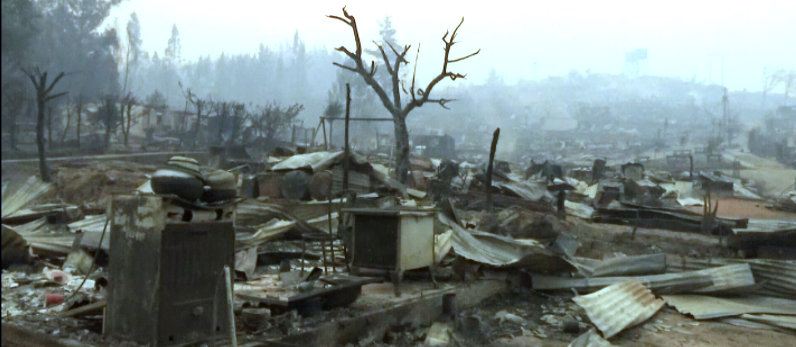 It has been a month since central south Chile has been gripped by wildfires that have swept away half a million of hectares of forest land. Eleven have died and 1,100 have been displaced. Thousands of homes have been burned, mostly in Santa Olga 500 km south of Santiago, a region of 5000 inhabitants that was completely destroyed. The causes of the catastrophe vary: a heat wave with historic temperatures, the dry weather, the intense drought and the winds that have fed the hundreds of fires that broke out in the Andes, backbone of the Americas. It happened within the mountain chain between the Pacific and the Andes that makes the geography of this land very difficult to travel. Some forty air tankers and helicopters and more than 4,500 fire fighters were not able to control so many fronts. Two fully equipped air giants are also at work against the fire: a Boeing 747 Supertanker capable of spreading about 70,000 litres of different liquids, and an Ilyushin-76 that was made available by the Russian government and is capable of launching 30 tons of water. Fire crews have been sent from Argentina, Colombia, Brazil, Peru, Spain, Portugal, France and Venezuela. The number of natural disasters between 2010 until now has been striking, beginning with the 8.8 earthquake followed by a tsunami that caused 535 deaths and millions of Euros in damage. At least three large volcanic eruptions followed all that. In 2015 a new earthquake registered 8.4 on the Richter scale . . . In 2014 and this year wildfires struck the areas around Valparaiso, a port city 115 km from the capital. There were many victims and damages into the 4 millions. It seemed impossible, but in 2015 there was the flooding of the Atacama Desert, the most arid place on earth. The mire carried away entire villages, roads, bridges and 28 people. And now there are more wildfires fanned by the drought… There will be time for investigations into the cause and, in some places, fraud has not been ruled out. But now is time for action. The flames have not been able to devour the solidarity that has been set in motion in so many ways: collections of basic goods, the Hogar de Cristo organization that has launched a 1.8 million dollar fundraiser for rebuilding, and others who have taken on the cost of the Supertanker. One mother who coordinates a collection among families said: “They’re our brothers and sisters, we have to help.” Only a few houses have been left standing in Santa Olga, but a Chilean flag appears over the smouldering rubble, an unfailing sign in the midst of the destruction. It stands for rebuilding and turning to nature again for a place to live, work and fulfil dreams. These souls will work hard with that age old patience of those who create their own history with sweat and tears, enveloped in a natural environment that has nothing to offer them. Alberto Barlocci Latest news from Focolare communities in regions that were hit by the wildfires Marilyn and Juan report: “It’s already been 19 days since, with the help of countries from around the world, we have been fighting against wildfires in south central Chile where many Focolare communities are located. Now, after a superhuman effort, because of the strong winds more than 80 wildfires that are still burning are reigniting fires that had already been put out. Several villages where many F
It has been a month since central south Chile has been gripped by wildfires that have swept away half a million of hectares of forest land. Eleven have died and 1,100 have been displaced. Thousands of homes have been burned, mostly in Santa Olga 500 km south of Santiago, a region of 5000 inhabitants that was completely destroyed. The causes of the catastrophe vary: a heat wave with historic temperatures, the dry weather, the intense drought and the winds that have fed the hundreds of fires that broke out in the Andes, backbone of the Americas. It happened within the mountain chain between the Pacific and the Andes that makes the geography of this land very difficult to travel. Some forty air tankers and helicopters and more than 4,500 fire fighters were not able to control so many fronts. Two fully equipped air giants are also at work against the fire: a Boeing 747 Supertanker capable of spreading about 70,000 litres of different liquids, and an Ilyushin-76 that was made available by the Russian government and is capable of launching 30 tons of water. Fire crews have been sent from Argentina, Colombia, Brazil, Peru, Spain, Portugal, France and Venezuela. The number of natural disasters between 2010 until now has been striking, beginning with the 8.8 earthquake followed by a tsunami that caused 535 deaths and millions of Euros in damage. At least three large volcanic eruptions followed all that. In 2015 a new earthquake registered 8.4 on the Richter scale . . . In 2014 and this year wildfires struck the areas around Valparaiso, a port city 115 km from the capital. There were many victims and damages into the 4 millions. It seemed impossible, but in 2015 there was the flooding of the Atacama Desert, the most arid place on earth. The mire carried away entire villages, roads, bridges and 28 people. And now there are more wildfires fanned by the drought… There will be time for investigations into the cause and, in some places, fraud has not been ruled out. But now is time for action. The flames have not been able to devour the solidarity that has been set in motion in so many ways: collections of basic goods, the Hogar de Cristo organization that has launched a 1.8 million dollar fundraiser for rebuilding, and others who have taken on the cost of the Supertanker. One mother who coordinates a collection among families said: “They’re our brothers and sisters, we have to help.” Only a few houses have been left standing in Santa Olga, but a Chilean flag appears over the smouldering rubble, an unfailing sign in the midst of the destruction. It stands for rebuilding and turning to nature again for a place to live, work and fulfil dreams. These souls will work hard with that age old patience of those who create their own history with sweat and tears, enveloped in a natural environment that has nothing to offer them. Alberto Barlocci Latest news from Focolare communities in regions that were hit by the wildfires Marilyn and Juan report: “It’s already been 19 days since, with the help of countries from around the world, we have been fighting against wildfires in south central Chile where many Focolare communities are located. Now, after a superhuman effort, because of the strong winds more than 80 wildfires that are still burning are reigniting fires that had already been put out. Several villages where many F ocolare families are found have been completely evacuated. For several nights locals along with firefighters and volunteers keep watch in order to keep the fire from growing. There are so many experiences of solidarity especially for people who are on the ground, like Manuel and Silvia, Volunteers from the Focolare who live in Chiguayante, an area completely surrounded by the fire. They were forced to evacuate their house because of the impending danger. Together with their children and neighbours they risked their own lives to “clear” the land so that the fire wouldn’t be able to spread. Even though the situation is now under control, there is always a danger that the wind will change direction. Victoria, Jorge and their three children live in Tomè which is also in danger. With their children and other young people they collected basic goods to share with people who have lost everything, and took those goods to the most isolated regions where it is difficult for help to arrive. Father Alex from the Russian Orthodox Church and a great friend of the Focolare, lives in Hualqui, a small village. He celebrates the Holy Mass in Chiguayante where his community is located. The fires took his village with great force and blocked the roadway so that he had to return on foot to assist the people who were still gripped by fear. There have also been experiences of solidarity in the Focolare communities that are far from the fires. The linked up on whatsapp and in just a few days truckloads of help arrived. We are seeing the great capacity of the people to respond in the face of difficulty with resilience and very touching acts of solidarity. It’s powerful to see the beaming smiles of all the people who have helped, and to feel that there is truly “more joy in giving than in receiving.”Before every action, we renew the unity among ourselves so that we will be more prepared to love the people that are in need. Every night at 22:00 we united in prayer to ask for the miracle of rain, and many others unite with us in this prayer.”
ocolare families are found have been completely evacuated. For several nights locals along with firefighters and volunteers keep watch in order to keep the fire from growing. There are so many experiences of solidarity especially for people who are on the ground, like Manuel and Silvia, Volunteers from the Focolare who live in Chiguayante, an area completely surrounded by the fire. They were forced to evacuate their house because of the impending danger. Together with their children and neighbours they risked their own lives to “clear” the land so that the fire wouldn’t be able to spread. Even though the situation is now under control, there is always a danger that the wind will change direction. Victoria, Jorge and their three children live in Tomè which is also in danger. With their children and other young people they collected basic goods to share with people who have lost everything, and took those goods to the most isolated regions where it is difficult for help to arrive. Father Alex from the Russian Orthodox Church and a great friend of the Focolare, lives in Hualqui, a small village. He celebrates the Holy Mass in Chiguayante where his community is located. The fires took his village with great force and blocked the roadway so that he had to return on foot to assist the people who were still gripped by fear. There have also been experiences of solidarity in the Focolare communities that are far from the fires. The linked up on whatsapp and in just a few days truckloads of help arrived. We are seeing the great capacity of the people to respond in the face of difficulty with resilience and very touching acts of solidarity. It’s powerful to see the beaming smiles of all the people who have helped, and to feel that there is truly “more joy in giving than in receiving.”Before every action, we renew the unity among ourselves so that we will be more prepared to love the people that are in need. Every night at 22:00 we united in prayer to ask for the miracle of rain, and many others unite with us in this prayer.”
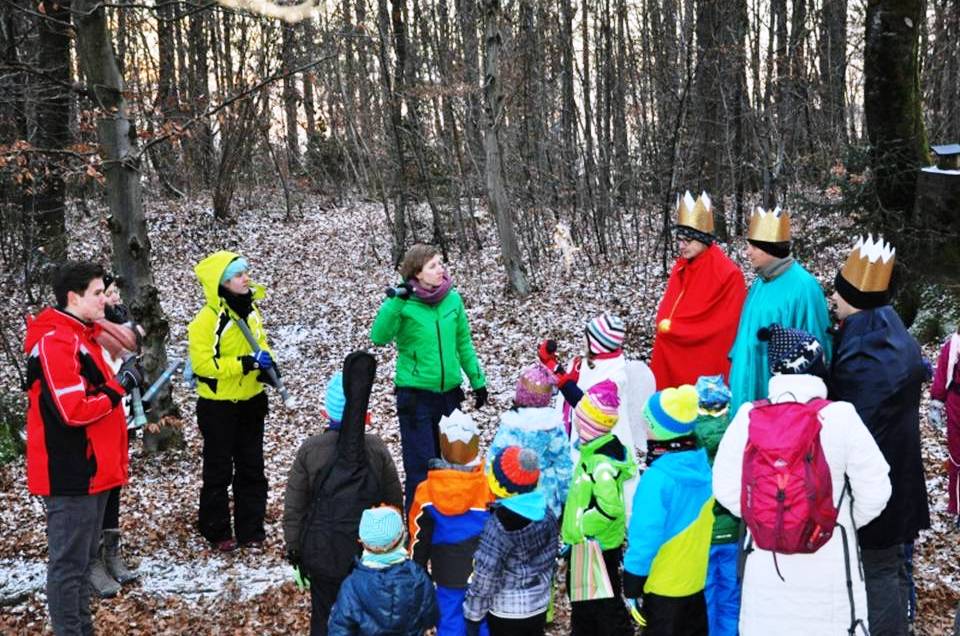
Feb 2, 2017 | Non categorizzato
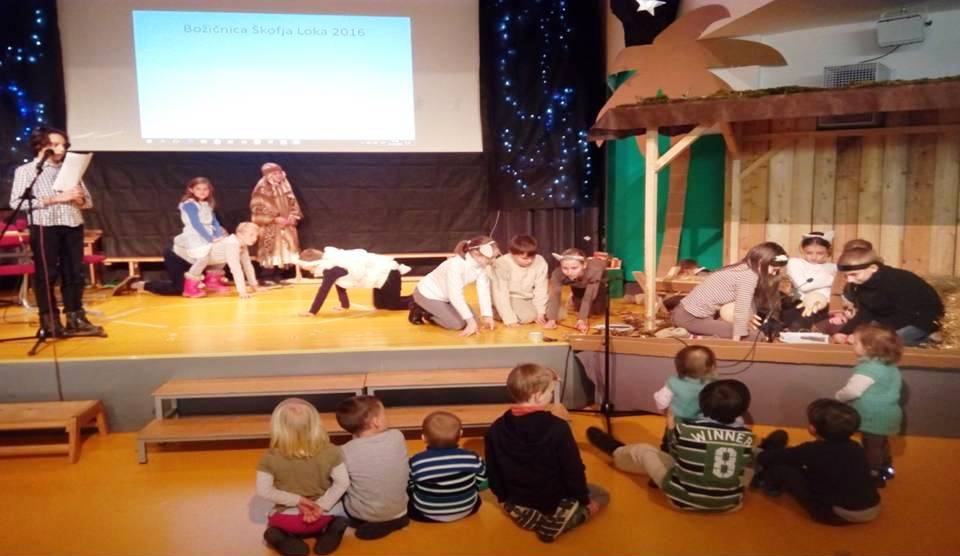 In Slovenia, the Christmas atmosphere is felt already in the first days of December. Many in the Focolare community have learned to make advent wreaths which they sell and then allocate the revenues to social purposes. The feast of St. Nicholas is on 6 December and he goes around with sacks full of gifts on this day. It is an occasion in which families in need are able to experience the fantasy of Divine Providence, through the collection and redistribution of all the surpluses of many families. In the exchange, some detach themselves from objects they are attached to sentimentally, which become gifts for the others, and everyone experiences the typical joy that arises from ”giving.” And while some members of the various communities deliver the proceeds of the wreaths to humanitarian actions in the territory, as they do every year, the Youth for a United World gather at the Arche (the Movement of Jean Vanier) for a unique sharing experience. In other districts, they visit the centre for single mums, bringing joy and warmth to all. The dates of these initiatives are first published on Facebook, extending the invitation to other youths to go out together to gather and distribute gifts.
In Slovenia, the Christmas atmosphere is felt already in the first days of December. Many in the Focolare community have learned to make advent wreaths which they sell and then allocate the revenues to social purposes. The feast of St. Nicholas is on 6 December and he goes around with sacks full of gifts on this day. It is an occasion in which families in need are able to experience the fantasy of Divine Providence, through the collection and redistribution of all the surpluses of many families. In the exchange, some detach themselves from objects they are attached to sentimentally, which become gifts for the others, and everyone experiences the typical joy that arises from ”giving.” And while some members of the various communities deliver the proceeds of the wreaths to humanitarian actions in the territory, as they do every year, the Youth for a United World gather at the Arche (the Movement of Jean Vanier) for a unique sharing experience. In other districts, they visit the centre for single mums, bringing joy and warmth to all. The dates of these initiatives are first published on Facebook, extending the invitation to other youths to go out together to gather and distribute gifts.  The smaller ones instead organise themselves in the streets to offer the little statues of Baby Jesus, that they have handcrafted themselves. It is not a sale, but an awareness campaign to bring the focus to the real protagonist of Christmas. But many leave offerings which they devolve to poor children. This is why they choose the big malls as the location for their campaign, as well as the homes for the aged, of relatives and next-door neighbours, and the midnight masses. In one of the towns, also the mayor went to visit. In a shopping centre, the Gen 4, and bigger kids (Kids for Unity) held a Christmas flashmob, giving a hand to the smaller ones who were thus able to distribute their 125 statuettes. In 18 Slovenian districts, there was also a fixed date for Christmas preparations. The entire community gathered together, with the participation of around 1,300 people, among whom was also a bishop. One of the communities wanted to pass the Epiphany together, and went to visit Baby Jesus in an old church on the hill. The group was accompanied along the trails in the woods by the Magi who also wanted to follow the star. Along the way they came across Herod who begged the Magi to return to him once they had found the Child. But suddenly an angel appeared to invite them to take another route home. This was exactly what the whole group did, choosing an alternative path. After this real-life staging, nobody would ever forget how Baby Jesus was saved from the anger of Herod. Of great significance were the Christmas stage plays held in the two Slovenian kindergartens, which drew inspiration from the educational games of unity: “Sun Ray” of Škofja Loka and “Jurček” in Grosuplje. The latter was held in the city’s Cultural Centre. Though many of those present declared to be agnostics, the intense atmosphere engaged them all. They followed the stage play of the Nativity of Jesus with great attention and in the end many joined in the children’s songs, and no longer wanted to leave.
The smaller ones instead organise themselves in the streets to offer the little statues of Baby Jesus, that they have handcrafted themselves. It is not a sale, but an awareness campaign to bring the focus to the real protagonist of Christmas. But many leave offerings which they devolve to poor children. This is why they choose the big malls as the location for their campaign, as well as the homes for the aged, of relatives and next-door neighbours, and the midnight masses. In one of the towns, also the mayor went to visit. In a shopping centre, the Gen 4, and bigger kids (Kids for Unity) held a Christmas flashmob, giving a hand to the smaller ones who were thus able to distribute their 125 statuettes. In 18 Slovenian districts, there was also a fixed date for Christmas preparations. The entire community gathered together, with the participation of around 1,300 people, among whom was also a bishop. One of the communities wanted to pass the Epiphany together, and went to visit Baby Jesus in an old church on the hill. The group was accompanied along the trails in the woods by the Magi who also wanted to follow the star. Along the way they came across Herod who begged the Magi to return to him once they had found the Child. But suddenly an angel appeared to invite them to take another route home. This was exactly what the whole group did, choosing an alternative path. After this real-life staging, nobody would ever forget how Baby Jesus was saved from the anger of Herod. Of great significance were the Christmas stage plays held in the two Slovenian kindergartens, which drew inspiration from the educational games of unity: “Sun Ray” of Škofja Loka and “Jurček” in Grosuplje. The latter was held in the city’s Cultural Centre. Though many of those present declared to be agnostics, the intense atmosphere engaged them all. They followed the stage play of the Nativity of Jesus with great attention and in the end many joined in the children’s songs, and no longer wanted to leave.
Feb 1, 2017 | Non categorizzato
Theme of the Meeting of Bishops, Friends of the Focolare Movement: «If the world knew Him …» Jesus abandoned on the cross: fundament of the spirituality of communion key to a “culture of encounter” For info: segves@focolare.org – and tel.. 06 947 98150
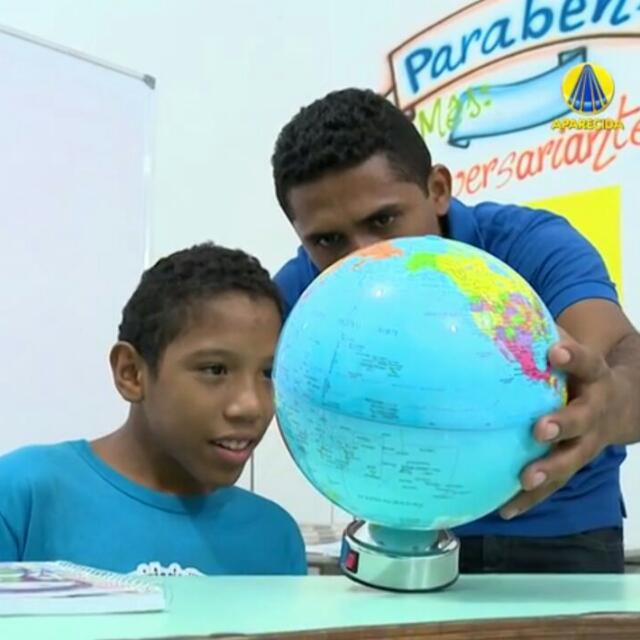
Feb 1, 2017 | Non categorizzato
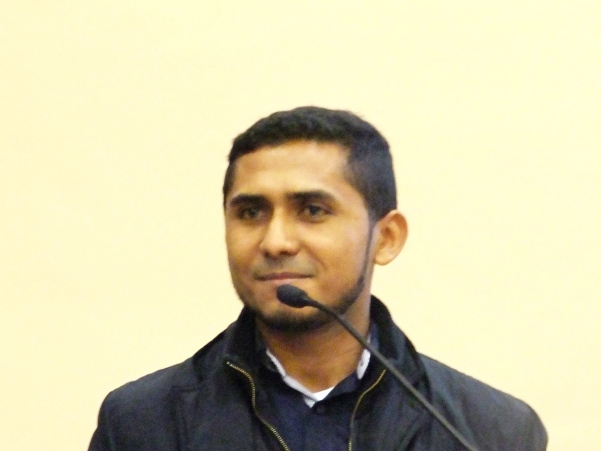 Brazil is a land of contradictions, the emblem of joy, hospitality, folklore, music, pristine nature, beaches, luxorious forests and metropolises oon the one hand. But on the other, like many countries in the world, Brazil is a land of contrasts, criminality and social inequality. Drug traffiking in the city represents a real wound on society that inevitably leads to armed conflicts. In addition, the murder rate among women is high, prostitution, lack of health care, child labour, low level of education, and the spread of slave labour generates high levels of inenquality as in the favellas and in the outlying districts of big cities. Health care and education are not garunteed and young people can’t look forward to an education and a job. Few escape the clutches of cime, thanks mostly to a few public policies and the work of social aid organizations such as parishes and Christian church groups that are really the only ones who have the fate of the poor at heart. Even in my own city with its 800,000 citizens, children between the ages of 13 and 17 have been mudered because of their involvement with drugs. My desire to love my neighbor, to give myself especially to the people that have been rejected by society, led me to be involved for five years, in the spirit of the Focolare, with a social project years in the diocese of Teresina: “The New Youth Community Centre.”
Brazil is a land of contradictions, the emblem of joy, hospitality, folklore, music, pristine nature, beaches, luxorious forests and metropolises oon the one hand. But on the other, like many countries in the world, Brazil is a land of contrasts, criminality and social inequality. Drug traffiking in the city represents a real wound on society that inevitably leads to armed conflicts. In addition, the murder rate among women is high, prostitution, lack of health care, child labour, low level of education, and the spread of slave labour generates high levels of inenquality as in the favellas and in the outlying districts of big cities. Health care and education are not garunteed and young people can’t look forward to an education and a job. Few escape the clutches of cime, thanks mostly to a few public policies and the work of social aid organizations such as parishes and Christian church groups that are really the only ones who have the fate of the poor at heart. Even in my own city with its 800,000 citizens, children between the ages of 13 and 17 have been mudered because of their involvement with drugs. My desire to love my neighbor, to give myself especially to the people that have been rejected by society, led me to be involved for five years, in the spirit of the Focolare, with a social project years in the diocese of Teresina: “The New Youth Community Centre.”  The project, which is geared towards at-risk children and teenagers, tries to provide alternative opportunities. Eighty children and teenagers (betweeen the ages of 5 and 17) attend music, dance and theatre classes. They receive tutoring and are provided with hot meals, since they often don’t find food in their homes. Their lives change when they come into contact with people who welcome and care for them. I also tried to be involved, listening to many young people who have shared their suffering with me. One boy told me about his drug problem and asked me to help him out of the tunnel. Another told me how he steals in order to get money. We often involve the professionals who work there, such as psychologists and social workers. Now many of the children are grown, they study and have found honest work. Others continue to arrive in search of an opportunity at a better life, of being loved and cared for. One of them who had been abandoned by his father, called me “Dad” and so I took on this role One boy had suffered various forms of violence and neglect. We found a way to channel his energy, by introducing him to judo, and that changed him for the better. He became a source of pride for all of us who had helped him. But one day he didn’t show up at the centre. We learned that he had become involved in some ugly ways and, one day, as he sat in front of his house was murdered. He had just turned 15. It was a big suffering for all of us, also for me because of the friendship we had built. Many other teenagers suffer the same fate. The project foresees also moments of training for educators and young people, according to the Chiara Lubich‘s spirituality, with monthly meetings of the Word of Life. What I got out of this experience is that continuity is required for recovering these boys, working in synchrony with the State, public institutions of education and health, with civil society, and with the church. To win this challenge we need to create networks and dialogue at every level: personal, group, community, all the way to the highest levels of society. But it all begins with me, moving beyond myself and going out to encounter the many peripheries. We’ve already begun.
The project, which is geared towards at-risk children and teenagers, tries to provide alternative opportunities. Eighty children and teenagers (betweeen the ages of 5 and 17) attend music, dance and theatre classes. They receive tutoring and are provided with hot meals, since they often don’t find food in their homes. Their lives change when they come into contact with people who welcome and care for them. I also tried to be involved, listening to many young people who have shared their suffering with me. One boy told me about his drug problem and asked me to help him out of the tunnel. Another told me how he steals in order to get money. We often involve the professionals who work there, such as psychologists and social workers. Now many of the children are grown, they study and have found honest work. Others continue to arrive in search of an opportunity at a better life, of being loved and cared for. One of them who had been abandoned by his father, called me “Dad” and so I took on this role One boy had suffered various forms of violence and neglect. We found a way to channel his energy, by introducing him to judo, and that changed him for the better. He became a source of pride for all of us who had helped him. But one day he didn’t show up at the centre. We learned that he had become involved in some ugly ways and, one day, as he sat in front of his house was murdered. He had just turned 15. It was a big suffering for all of us, also for me because of the friendship we had built. Many other teenagers suffer the same fate. The project foresees also moments of training for educators and young people, according to the Chiara Lubich‘s spirituality, with monthly meetings of the Word of Life. What I got out of this experience is that continuity is required for recovering these boys, working in synchrony with the State, public institutions of education and health, with civil society, and with the church. To win this challenge we need to create networks and dialogue at every level: personal, group, community, all the way to the highest levels of society. But it all begins with me, moving beyond myself and going out to encounter the many peripheries. We’ve already begun.
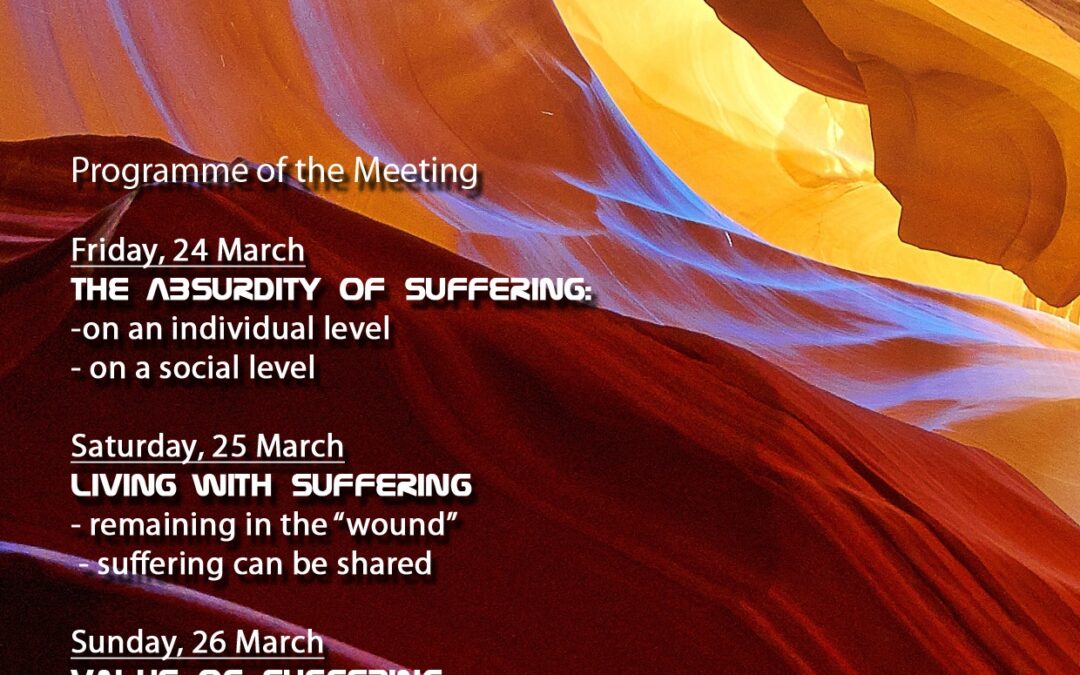
Jan 30, 2017 | Non categorizzato
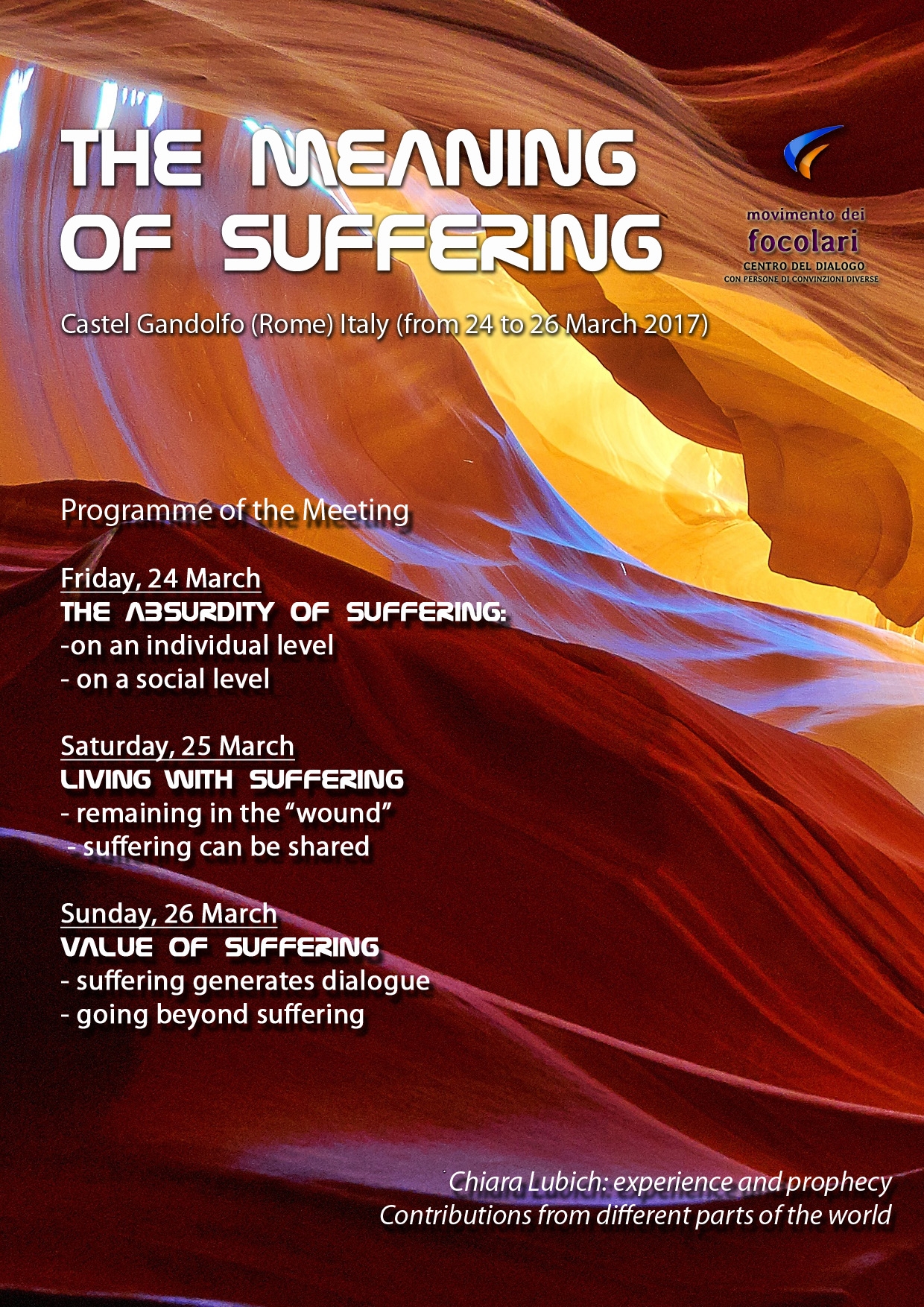 The program will focus on these themes: The absurdity of suffering on an individual and social level Living with suffering The value of suffering There will be input from various geographic regions and from various disciplines: psychology, medicine, philosophy, art, through personal experiences given by people of different age-groups. Bookings can be made through the Centre for Dialogue with Persons of no Religious Affiliation Focolare Movement, Via Frascati 306, 00040 Rocca di Papa (Rome), Italy Email: centrodialogo@focolare.org Tel: +39 06 94798-343
The program will focus on these themes: The absurdity of suffering on an individual and social level Living with suffering The value of suffering There will be input from various geographic regions and from various disciplines: psychology, medicine, philosophy, art, through personal experiences given by people of different age-groups. Bookings can be made through the Centre for Dialogue with Persons of no Religious Affiliation Focolare Movement, Via Frascati 306, 00040 Rocca di Papa (Rome), Italy Email: centrodialogo@focolare.org Tel: +39 06 94798-343
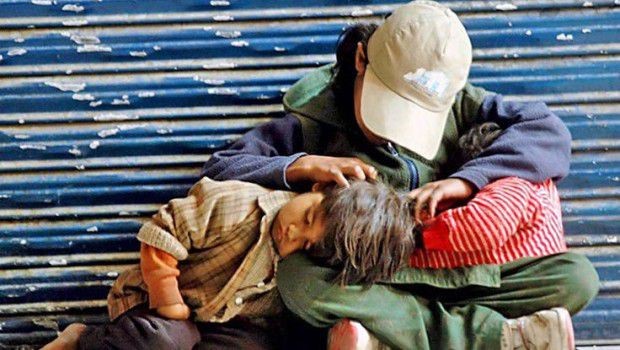
Jan 30, 2017 | Non categorizzato
Eight people own as much as the poorest half of the world’s population. This is what Oxfam Report 2017 says. Runaway inequality is condemning hundreds of millions of people to poverty and highlighting the iniquity of the current economic system. In this complex situation, the Economy of Communion may be considered as a prophetic sign. It originated in May 1991, in Brazil as a reaction to the scandalous situation of the favelas that surround the city of San Paolo. Chiara Lubich invited a first group of entrepreneurs to set up businesses that follow the market laws and produce profits “which would be freely put in common”. Its aim is to help the poor, create jobs and promote the culture of giving as an alternative to the culture of having.  Since then, 25 years have passed. And on Saturday, February 4, 2017, 1100 people involved in the Economy of Communion (EoC) will meet Pope Francis at Paul VI Hall. The majority of them are entrepreneurs, men and women, who chose communion as away of life, personally and also in the running of their businesses. They will be joined by students, scholars and professors, who, through research and academic activity, aim at laying a theoratical foundation to the inspiration economy/communion . These participants come from different countries and various backgrounds, and this shows that the EoC can establish itself in any geographical and cultural environment, rich and poor. Many participants will come from the continent of Asia: China, Korea, the Philippines, Hong Kong, India, Malaysia, Singapore, Thailand and Vietnam. Africa will be presented by participants from Burkina Faso, Burundi, Cameroon, Ivory Coast, Ethiopia, Uganda, Nigeria and the Democratic Republic of Congo. Entrepreneurs from North and South America will come from 11 different countries, namely, Argentina, Bolivia, Brazil, Canada, Chile, Cuba, Mexico, Panama, Paraguay, Uruguay and USA. European participants are many and they come from 20 different countries. Oceania will be present with Australia. Maria Voce, the president of the Focolare Movement together its General Council will also be present. These participants want, first of all, to thank Pope Francis for his teachings and actions that highlight the dignity of the poor and the excluded. At the same time, this assembly would like to present to the Pope some fruits of the EoC, that has been facing challenges and crises that afflict the world since its very start. Today, the EoC animates industrial parks in Europe and Latin America, generates a life of communion in more than eight hundred companies, helps several thousands of people in need and sees to the education of their children, develops a cultural reflection that contributes towards rethinking about economic practices such as reciprocity, gift, gratuity and the idea of market. New projects are also being carried out:
Since then, 25 years have passed. And on Saturday, February 4, 2017, 1100 people involved in the Economy of Communion (EoC) will meet Pope Francis at Paul VI Hall. The majority of them are entrepreneurs, men and women, who chose communion as away of life, personally and also in the running of their businesses. They will be joined by students, scholars and professors, who, through research and academic activity, aim at laying a theoratical foundation to the inspiration economy/communion . These participants come from different countries and various backgrounds, and this shows that the EoC can establish itself in any geographical and cultural environment, rich and poor. Many participants will come from the continent of Asia: China, Korea, the Philippines, Hong Kong, India, Malaysia, Singapore, Thailand and Vietnam. Africa will be presented by participants from Burkina Faso, Burundi, Cameroon, Ivory Coast, Ethiopia, Uganda, Nigeria and the Democratic Republic of Congo. Entrepreneurs from North and South America will come from 11 different countries, namely, Argentina, Bolivia, Brazil, Canada, Chile, Cuba, Mexico, Panama, Paraguay, Uruguay and USA. European participants are many and they come from 20 different countries. Oceania will be present with Australia. Maria Voce, the president of the Focolare Movement together its General Council will also be present. These participants want, first of all, to thank Pope Francis for his teachings and actions that highlight the dignity of the poor and the excluded. At the same time, this assembly would like to present to the Pope some fruits of the EoC, that has been facing challenges and crises that afflict the world since its very start. Today, the EoC animates industrial parks in Europe and Latin America, generates a life of communion in more than eight hundred companies, helps several thousands of people in need and sees to the education of their children, develops a cultural reflection that contributes towards rethinking about economic practices such as reciprocity, gift, gratuity and the idea of market. New projects are also being carried out:
- an international network (Economy of Communion Incubating International Network – EOC-IIN) with hubs in industrial parks (and also in other places) to support young entrepreneurs. These hubs are already functioning in Cameroon, Portugal, Croatia, Mexico and Brazil. 100 young people living in vulnerable situations are being trained through a successfully run partnership in which social and civil economy organizations are involved. Workshops are currently taking place in Portugal and Mexico to train youth in an entrepreneurship “of communion”. Collaboration with academic institutions is also present as, e.g. with the University of Puebla (Mexico) for the development of projects for an indigenous community.
- An Observatory on Poverty that gathers information about the best practices in the struggle against poverty and develops an approach inspired by the values of communion and reciprocity.
These and other topics will be dealt with during the three working conferences to be held from 1-5 February at the Mariapolis Centre of Castelgandolfo (Rome). Tracks and projects for 2018-2020 will be defined. “If we decide to look at the world with the poor and the discarded” says Luigino Bruni, economist and international coordinator of the Economy of Communion, “we cannot stay on the pedestal; we have to come down and be with the victims, we have to fight for them, fight with them. In return, we will get new eyes, we will see things others do not see; sometimes we see horrible things; other times we see things of infinite beauty. The EoC has been doing this for 25 years. If it wants to survive, it must keep on doing it every day, better and more”. Press release Edc online
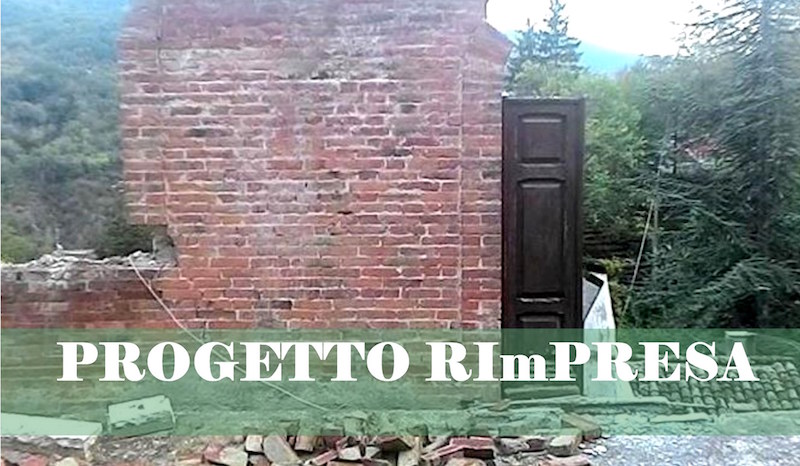
Jan 30, 2017 | Non categorizzato
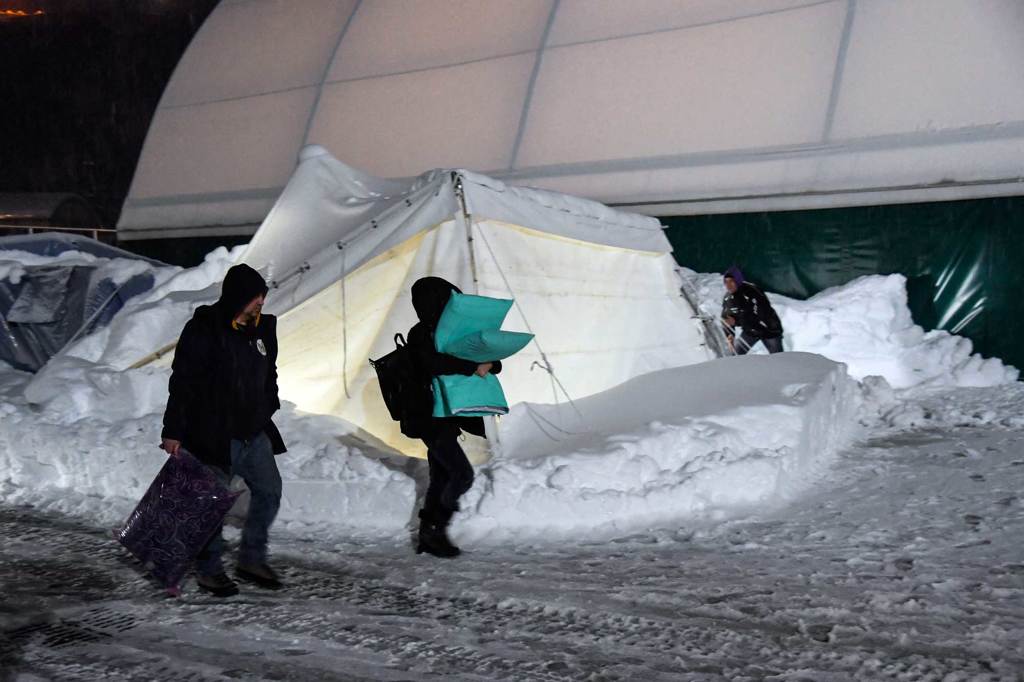 “It’s like being in a war. There are police, civil protection agencies, the Red Cross, and so on. Last night we had supper with a family of six, whose sons are boys scouts with our son. Their house is damaged and their sleeping under the canopy. Our family has grown, but also our hearts. From a tank of gas for those who were without energy to shovelling out a neighbour after the snowfall, we are having an experience of brotherhood. Up until ysterday we were among the ones asking for help. Then the lights came on and we turned out attention towards those who are in need. At the end of our lives we won’t be asked whether we were believers, but whether we were credible!” These are the reports coming to us from our friends that were hit by the latest earthquake which, since last August 24th has been shaking Italy, which is now covered in a thick blanket of snow. The earthquakes have been followed by other earthquakes that have caused avalanches, landslides and loss of life. That was the case for the fire fighters who raced to the hotel that was buried in snow, or the civil volunteers who are here from alll over Italy. The RImPresa Project is also focusing on a particular aspect of the seemingly endless emergency, that is, the support network that for several months has been providing logistical support along the ancient Salaria way, to many small rural centres whose economies are based mainly on agriculture raising livestock.
“It’s like being in a war. There are police, civil protection agencies, the Red Cross, and so on. Last night we had supper with a family of six, whose sons are boys scouts with our son. Their house is damaged and their sleeping under the canopy. Our family has grown, but also our hearts. From a tank of gas for those who were without energy to shovelling out a neighbour after the snowfall, we are having an experience of brotherhood. Up until ysterday we were among the ones asking for help. Then the lights came on and we turned out attention towards those who are in need. At the end of our lives we won’t be asked whether we were believers, but whether we were credible!” These are the reports coming to us from our friends that were hit by the latest earthquake which, since last August 24th has been shaking Italy, which is now covered in a thick blanket of snow. The earthquakes have been followed by other earthquakes that have caused avalanches, landslides and loss of life. That was the case for the fire fighters who raced to the hotel that was buried in snow, or the civil volunteers who are here from alll over Italy. The RImPresa Project is also focusing on a particular aspect of the seemingly endless emergency, that is, the support network that for several months has been providing logistical support along the ancient Salaria way, to many small rural centres whose economies are based mainly on agriculture raising livestock.  The RImPRESA project, which is promoted by the AMU, the AIPEC Business Owners Association, AFN Onlus, Planetary Embrace, B&F Foundation and the Focolare Movement is now in full operation. There are suppliers, raw material businesses, machinery and provisional infrastructure companies, 4 (GAS) purchasing groups from other Italian cities who are all working to create a user and consumption base outside the areas affected by the earthquake. The eighty families involved so far will soon be able to buy the products from the companies through an IT platform that will send their order. The products will be delivered once a week. The intent of GAS – far from providing welfare – is to encourage a reciprocity and involvement by all the participants. The project includes the creation of a “Reciprocity Fund” from which the selected families will receive a grant for the restart of their production activities. They in turn will agree help support businesses, once the condition of their own businesses allow it. For more information: www.amu-it.eu See: Earthquake in Italy: three hours under the rubble “Toulouse for Italy” Concert Christmas among earthquake victims in Centra Italy
The RImPRESA project, which is promoted by the AMU, the AIPEC Business Owners Association, AFN Onlus, Planetary Embrace, B&F Foundation and the Focolare Movement is now in full operation. There are suppliers, raw material businesses, machinery and provisional infrastructure companies, 4 (GAS) purchasing groups from other Italian cities who are all working to create a user and consumption base outside the areas affected by the earthquake. The eighty families involved so far will soon be able to buy the products from the companies through an IT platform that will send their order. The products will be delivered once a week. The intent of GAS – far from providing welfare – is to encourage a reciprocity and involvement by all the participants. The project includes the creation of a “Reciprocity Fund” from which the selected families will receive a grant for the restart of their production activities. They in turn will agree help support businesses, once the condition of their own businesses allow it. For more information: www.amu-it.eu See: Earthquake in Italy: three hours under the rubble “Toulouse for Italy” Concert Christmas among earthquake victims in Centra Italy
Jan 28, 2017 | Non categorizzato, Word of
The word ‘heart’ makes us think of affections, feelings and passions. However, for the bible writers it meant much more. Together with the spirit, the heart is the centre both of life and of the person; it is the place where decisions are made, the place of our inner life, our spiritual life. A heart of flesh is docile to the word of God and allows itself to be guided by the word, giving rise to “peaceful thoughts” about others. Instead, a heart of stone is closed in on itself and is unable to listen or be merciful. Do we really need a new heart and a new spirit? It is enough to look around and see the violence, corruption and wars that are caused by hearts of stone which are not open to God’s plan for creation. If we look honestly within ourselves, we can see that we are often motivated by selfish wants. Does love truly guide our decisions? Are we guided by what is good for others? Seeing our impoverished humanity, God was moved to compassion. He knows us better than we know ourselves and he knows we need a new heart. He promised this to the Prophet Ezekiel, thinking not only of individuals but of all his people. God’s dream is to recreate one large family of peoples, as was his original intention, which is guided by the law of mutual love. History has often shown that while, on the one hand, we cannot fulfill God’s plan on our own, on the other He has never tired of getting involved, to the point of promising that he himself would give us a new heart and a new spirit. He kept his promise to the full when he sent his Son on earth and when he poured out his Spirit on the day of Pentecost. A community began – the first Christian community in Jerusalem – which was an icon of humankind living as “one heart and one soul”. All of us, you who are reading or listening to this commentary on the Word of Life and I who am writing it, are called to be part of this new humanity. Moreover, we are called to edify this new humanity around us, bringing it into the places where we live and work. What a great mission has been given to us and how great is God’s trust in us! Instead of feeling depressed at seeing how corrupt society seems to be; instead of resigning ourselves to evils that are bigger than us, and shutting it all out as if we were not concerned, let’s widen our hearts “according to the measure of the heart of Jesus. How much work that means! Yet this is the only thing necessary.” This is what Chiara Lubich asked us to do and she went on saying: “It means loving everyone we meet as God loves them. And since we live in time, we must love our neighbors one by one, without holding in our heart any left-over affection for the brother or sister met a moment before”. Let’s not trust in our own strength and abilities, which are inadequate, but let’s trust in God’s gift to us: “A new heart I will give you, and a new spirit I will put within you.” If we respond willingly to the call to love each person, if we allow ourselves to be guided by the voice of the Holy Spirit in us, we will become living cells of a new humanity, builders of a new world, in the great diversity of peoples and cultures. Fabio Ciardi This month we will be living this Word, which was chosen by an ecumenical group in Germany, together with brothers and sisters of various Churches, so as to let God’s promise accompany us during the whole of this year in which we are commemorating the 500th anniversary of the Reformation.
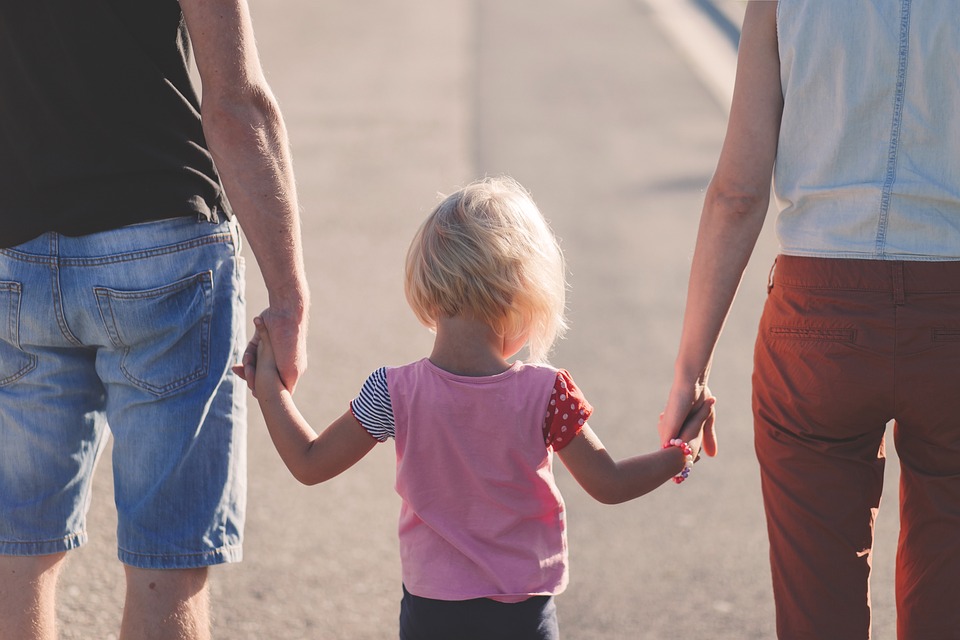
Jan 28, 2017 | Non categorizzato
 “The miracle of the house of Nazareth repeats itself in some way in every Christian home, if it ”generates” Christ among men. The Council called the family a “Domestic Church,” and Church stands for living together in love, and thus in God, a coexistence which has the Lord as its centre. Starting off from this awareness, the home – every Christian home – becomes a blossoming of new moral and physical life for society, and is also a heating system to vivify the environment. As the Council teaches us, “the physical and moral life of humanity, and even more so the real expansion of God’s Kingdom, depends on the fullness of health and spiritual life of the family.” So –Paul VI says– “through marriage and the family, God has wisely united two of the greatest human realities: the mission of transmitting life and mutual love, and the legitimacy of man and woman.” Never has a poet elevated conjugal love to such sublime heights. Here the religion of Christ is really expressed also as poetry, placing the family centrally – at the source – of sociality. There is life if there is love, the first condition of conjugal union. And if the spouses love one another, they are the «cooperators of the love of God the creator and his interpreters,» says the Council. If they know this, upon marrying each other they undertake to fulfill a mandate of regal priesthood, a great mystery as St. Paolo defined it. In loving one another they sanctify themselves and donate God who is love, and are his testimonials. If two spouses love one another, it is a sign for the people that they are really Christians and live God’s life. The old world got converted upon seeing how the Christians loved one another, starting from their homes. If they loved one another then their religion was true, and God was in them. In loving one another spouses create their happiness and build their sanctity. The home becomes a temple – Paradise. Love is the secret of the strength of families, and their concord is the solution of the trials of existence. Without love, the family and existence itself fail. So sanctity is seen to be the health of the spirit, which acts also on the physical, while it overflows like a pure wave of healing in all folds of society. So from a Christian home, the people of God ensue.”
“The miracle of the house of Nazareth repeats itself in some way in every Christian home, if it ”generates” Christ among men. The Council called the family a “Domestic Church,” and Church stands for living together in love, and thus in God, a coexistence which has the Lord as its centre. Starting off from this awareness, the home – every Christian home – becomes a blossoming of new moral and physical life for society, and is also a heating system to vivify the environment. As the Council teaches us, “the physical and moral life of humanity, and even more so the real expansion of God’s Kingdom, depends on the fullness of health and spiritual life of the family.” So –Paul VI says– “through marriage and the family, God has wisely united two of the greatest human realities: the mission of transmitting life and mutual love, and the legitimacy of man and woman.” Never has a poet elevated conjugal love to such sublime heights. Here the religion of Christ is really expressed also as poetry, placing the family centrally – at the source – of sociality. There is life if there is love, the first condition of conjugal union. And if the spouses love one another, they are the «cooperators of the love of God the creator and his interpreters,» says the Council. If they know this, upon marrying each other they undertake to fulfill a mandate of regal priesthood, a great mystery as St. Paolo defined it. In loving one another they sanctify themselves and donate God who is love, and are his testimonials. If two spouses love one another, it is a sign for the people that they are really Christians and live God’s life. The old world got converted upon seeing how the Christians loved one another, starting from their homes. If they loved one another then their religion was true, and God was in them. In loving one another spouses create their happiness and build their sanctity. The home becomes a temple – Paradise. Love is the secret of the strength of families, and their concord is the solution of the trials of existence. Without love, the family and existence itself fail. So sanctity is seen to be the health of the spirit, which acts also on the physical, while it overflows like a pure wave of healing in all folds of society. So from a Christian home, the people of God ensue.”
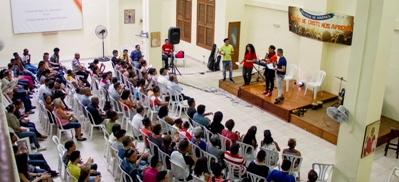
Jan 27, 2017 | Non categorizzato
The celeb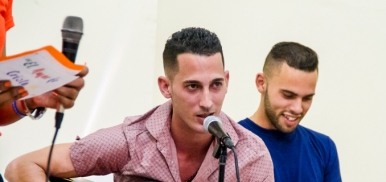 ration of the “Week of Prayer for Unity of Christians” at Havana was highlighted by a particular moment, the Ecumenical Youth Festival, at its third edition. Created with the aim of encouraging a more active participation of the youth in the ecumenical movement, the festival project began to take shape and became an annual meeting of young Christians of Havana. The “Week of Prayer” was enlivened by the youth sectors of the Focolare Movement, Community of Sant’Egidio and Council of Churches of Cuba. Inspired by this year’s “Christ’s love compels us” (2 Cor 5, 14-20), which was also the festival’s motto, the programme of dance, music, and drama staged in this edition saw the participation of about 150 youths of various communities of different Christian denominations. The meeting began on Sunday, 22 January, in the Headquarters of the Community of Sant’Egidio, in the historical centre of the Cuban capital. The representatives of the Cuban Council of Churches also took part in the event, along with Bishop Juan García, Archbishop of Havana, who in his brief greeting, encouraged the youths to see themselves as members of a sole body, a sole family.
ration of the “Week of Prayer for Unity of Christians” at Havana was highlighted by a particular moment, the Ecumenical Youth Festival, at its third edition. Created with the aim of encouraging a more active participation of the youth in the ecumenical movement, the festival project began to take shape and became an annual meeting of young Christians of Havana. The “Week of Prayer” was enlivened by the youth sectors of the Focolare Movement, Community of Sant’Egidio and Council of Churches of Cuba. Inspired by this year’s “Christ’s love compels us” (2 Cor 5, 14-20), which was also the festival’s motto, the programme of dance, music, and drama staged in this edition saw the participation of about 150 youths of various communities of different Christian denominations. The meeting began on Sunday, 22 January, in the Headquarters of the Community of Sant’Egidio, in the historical centre of the Cuban capital. The representatives of the Cuban Council of Churches also took part in the event, along with Bishop Juan García, Archbishop of Havana, who in his brief greeting, encouraged the youths to see themselves as members of a sole body, a sole family.  This year, the event was characterised by a family atmosphere which was tangible in all the various activities. It was not only a show where every church or community performed its piece of the festival. But it was an event accomplished by people who considered one another more and more as brothers, thanks to the relationship established during the years, between one festival and the other, through meetings, dinners, celebrations and mutual help. The group that led the festival was composed of Catholics, Baptists and Pentecostals; the choir was formed by youths of various churches, and accompanied the songs presented by a Catholic. The theatre piece was created by a Pentecostal youth and performed by a group of Catholic girls. «The desire and decision to live unity is already a reality,» one of the participants said. At the end of the programme, the idea that spontaneously came up was the decision “to hold the next festival in a public theatre.” This expressed the desire to testify before others, about the experience of unity concretely lived. From Havana, 22 January 2017
This year, the event was characterised by a family atmosphere which was tangible in all the various activities. It was not only a show where every church or community performed its piece of the festival. But it was an event accomplished by people who considered one another more and more as brothers, thanks to the relationship established during the years, between one festival and the other, through meetings, dinners, celebrations and mutual help. The group that led the festival was composed of Catholics, Baptists and Pentecostals; the choir was formed by youths of various churches, and accompanied the songs presented by a Catholic. The theatre piece was created by a Pentecostal youth and performed by a group of Catholic girls. «The desire and decision to live unity is already a reality,» one of the participants said. At the end of the programme, the idea that spontaneously came up was the decision “to hold the next festival in a public theatre.” This expressed the desire to testify before others, about the experience of unity concretely lived. From Havana, 22 January 2017
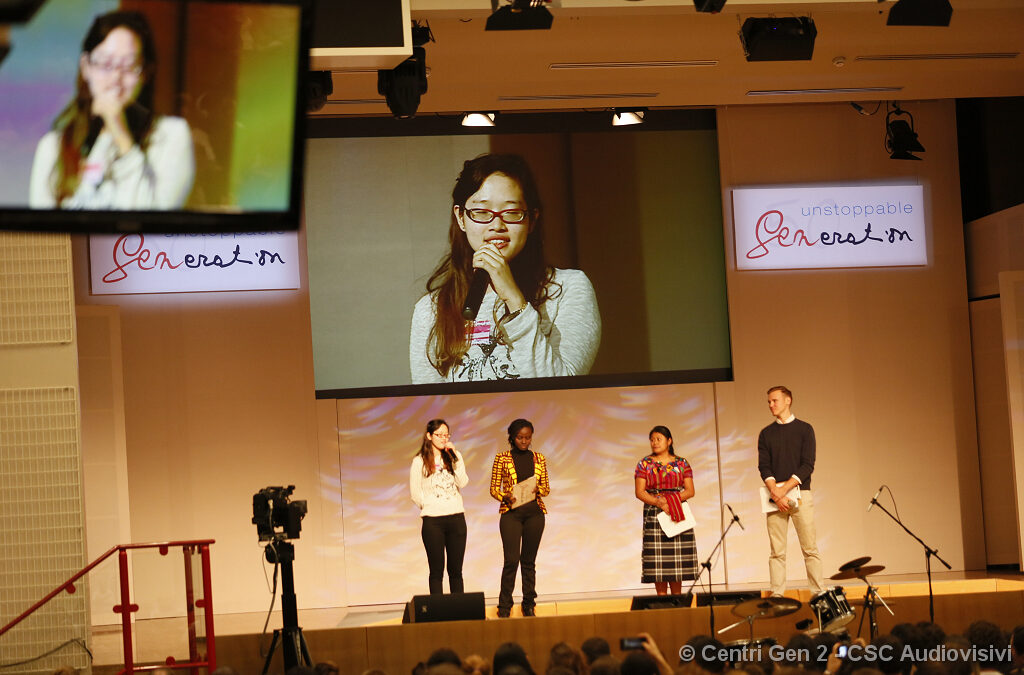
Jan 25, 2017 | Non categorizzato
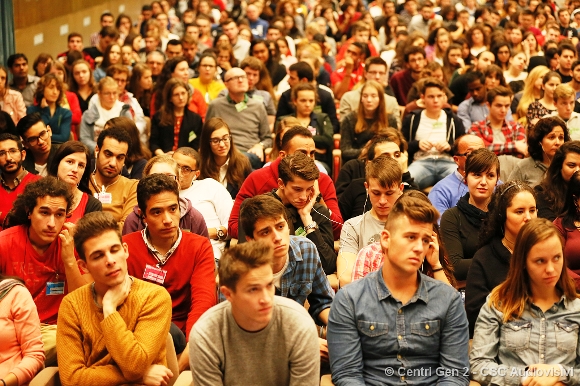 “I lost my father when I was six years old. He died during the war,” says Ivona from Croatia. “That was a hard time in my life that caused me to become closed in myself. In 2003 I met the Focolare Movement and I experienced an atmosphere of love and joy, and I found the strength to face everything and love life even when it was difficult. On New Year’s Eve, at the age of 13, had a fainting spell and ended up in hospital. While waiting for the results of the tests, I suddenly noticed a small rosary in my hand. When I think of it now, I believe that it may have been a sign from God because of what I would have to go through. I was diagnosed with a form of emotional epilepsy resulting from the trauma of my father’s death. I cried for two night. One evening as I was praying the rosary, I felt that I wasn’t alone, that Jesus understood my pain. I seemed to understand the meaning of Chiara Lubich’s words about the moment of Jesus’s abandonment on the cross: ‘What is His is mine and nothing else. Universal suffering is His and therefore mine . . . What hurts me is mine . . . Mine is the suffering of the soul beside me – that’s my Jesus.’ From that moment on my life went ahead in peace and joy, but mostly I was living it with Jesus. Through the illness, I experienced that Jesus Forsaken has illumined every darkness, as Chiara says, and accompanied every solitude. I accepted my illness and felt loved by Him.”
“I lost my father when I was six years old. He died during the war,” says Ivona from Croatia. “That was a hard time in my life that caused me to become closed in myself. In 2003 I met the Focolare Movement and I experienced an atmosphere of love and joy, and I found the strength to face everything and love life even when it was difficult. On New Year’s Eve, at the age of 13, had a fainting spell and ended up in hospital. While waiting for the results of the tests, I suddenly noticed a small rosary in my hand. When I think of it now, I believe that it may have been a sign from God because of what I would have to go through. I was diagnosed with a form of emotional epilepsy resulting from the trauma of my father’s death. I cried for two night. One evening as I was praying the rosary, I felt that I wasn’t alone, that Jesus understood my pain. I seemed to understand the meaning of Chiara Lubich’s words about the moment of Jesus’s abandonment on the cross: ‘What is His is mine and nothing else. Universal suffering is His and therefore mine . . . What hurts me is mine . . . Mine is the suffering of the soul beside me – that’s my Jesus.’ From that moment on my life went ahead in peace and joy, but mostly I was living it with Jesus. Through the illness, I experienced that Jesus Forsaken has illumined every darkness, as Chiara says, and accompanied every solitude. I accepted my illness and felt loved by Him.” 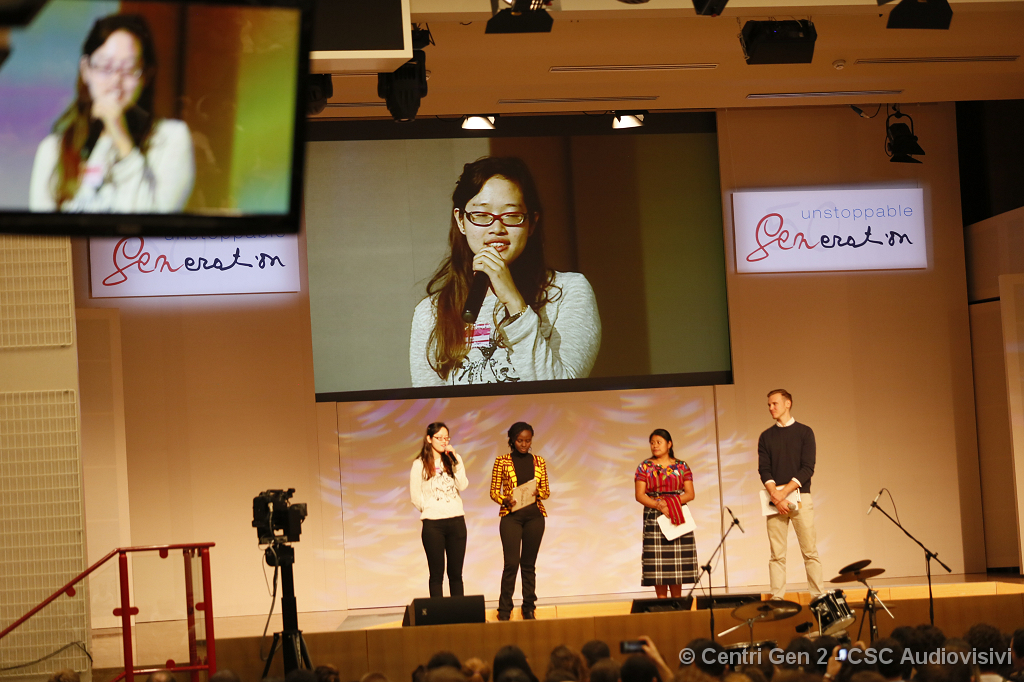 “I’m Zin from Myanmar and I’m a Buddhist Gen. I’ve been at the Gen School in Montet, Switzerland since September. Whenever I tell people that I’m a Buddhist, they all ask me what it’s like to live with the other Gen who are all Christians. It’s easy for me to accept that we follow different religions. It’s only when the other Gen pray or go to mass that I realize there’s a difference. In all the rest we’re the same – sisters living in the same house. We like to love one another in accordance with the way that each one of us understands Love: in Buddhism it’s mostly a matter of compassion, politeness and forgetting oneself. For Christians it’s ‘love of neighbhbour’, ‘love of enemy’ ‘mutual love’ ‘love for Jesus Forsaken’. While noting the diversity in our manner of expressing love, striving to ‘be love’ as our common goal leads us to experience unity.” “I’m Lilia Mayrleny from the Maya Kaqchikel ethnic community in Guatemala, originally from the Patzun people. I’m a Kaqchikel/Spanish bilingual early childhood teacher. Kazchikel is my native language. My country is multi-cultural and bi-lingual. It’s multi-cultural because it’s comprised of four different cultures: Maya, Garifuna, Xinca and Ladino; and it’s multi-lingual because we speak 22 Maya languages. I met the Focolare Movement at the Gen4 meetings when I was a child. I try to bring the ideal of unity into my daily life. I study at university thanks to my parents who also live the Focolare spirituality and support my studies. This is a great conquest, because not all women in my community are able to pursue their studies because of the sexist culture we live in. In Maya culture things like truth, the rule of law, love and respect are cherished. At times I felt very alone without any answers to my questions. But, by trying to live the Gospel I discovered that sorrows and pain, disapointments and doubts, weaknesses, unexpected surprises and all the trials of life, including deception are the many different guises of Jesus who suffered the abandonment on the cross. Whenever I manage to recognize and love him, the difficult situations are transfigured and peace blossoms in me.”
“I’m Zin from Myanmar and I’m a Buddhist Gen. I’ve been at the Gen School in Montet, Switzerland since September. Whenever I tell people that I’m a Buddhist, they all ask me what it’s like to live with the other Gen who are all Christians. It’s easy for me to accept that we follow different religions. It’s only when the other Gen pray or go to mass that I realize there’s a difference. In all the rest we’re the same – sisters living in the same house. We like to love one another in accordance with the way that each one of us understands Love: in Buddhism it’s mostly a matter of compassion, politeness and forgetting oneself. For Christians it’s ‘love of neighbhbour’, ‘love of enemy’ ‘mutual love’ ‘love for Jesus Forsaken’. While noting the diversity in our manner of expressing love, striving to ‘be love’ as our common goal leads us to experience unity.” “I’m Lilia Mayrleny from the Maya Kaqchikel ethnic community in Guatemala, originally from the Patzun people. I’m a Kaqchikel/Spanish bilingual early childhood teacher. Kazchikel is my native language. My country is multi-cultural and bi-lingual. It’s multi-cultural because it’s comprised of four different cultures: Maya, Garifuna, Xinca and Ladino; and it’s multi-lingual because we speak 22 Maya languages. I met the Focolare Movement at the Gen4 meetings when I was a child. I try to bring the ideal of unity into my daily life. I study at university thanks to my parents who also live the Focolare spirituality and support my studies. This is a great conquest, because not all women in my community are able to pursue their studies because of the sexist culture we live in. In Maya culture things like truth, the rule of law, love and respect are cherished. At times I felt very alone without any answers to my questions. But, by trying to live the Gospel I discovered that sorrows and pain, disapointments and doubts, weaknesses, unexpected surprises and all the trials of life, including deception are the many different guises of Jesus who suffered the abandonment on the cross. Whenever I manage to recognize and love him, the difficult situations are transfigured and peace blossoms in me.”
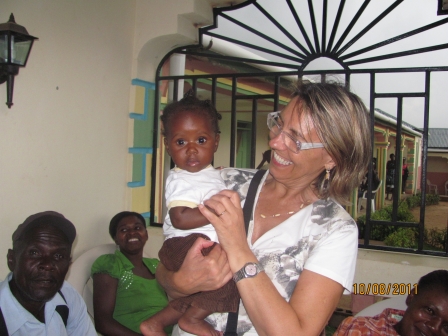
Jan 24, 2017 | Non categorizzato
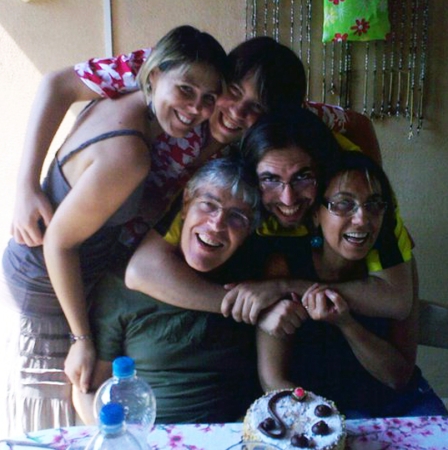 Fiorella: “Right from the start I found that Andrea was an atheist and very popular with the girls. I decided in my heart that it was better to let him go. But then in the disco I always found myself in his arms.” Andrea: “Fiorella was really one of the many. Before telling her – to my own great surprise – that I might actually love her, two years went by.” Fiorella: “I was aware that the relationship wasn’t going anywhere. There wasn’t dialogue and we didn’t make any plans. I had become Andrea’s shadow, without personanlity or dreams. Disappointed I decided to leave him. To evade him, I changed jobs and moved to another city, but I soon began to feel alone and full of sadness. One morning, nearly desperate, I found myself in the doorway of a small church, yelling out why to that God whom I had left for some time. When I job contract ended, I returned home to my relatives. A few days later, a friend whom I hadn’t seen in a while couldn’t wait to talk to me about God, and invited me to a several-day gathering with people who were trying to live the Gospel. As I stepped into the hall I was struck by a sign they had hung: “God is Love”. I wondered how God could love someone like me with my heavy make-up, heels size 12 and fiery red hair. But right from the first day I felt his presence, I knew that I had discovered what I was always looking for, and I ran to pour out all my miseries in the confessional with the intention of beginning to live the Gospel. After that first “Mariapolis” the Eucharist became the vital force of my life.” Andrea:”Fiorella was changed. Now she talked, but what’s worse – at least from my point of view back then – she talked about God. Trying to be tollerant, I decided not to dump her, but I was jealous of this God who was stealing her from me. I was struck by her serenity, her enjoyment of life, her renewed love for me that filled my heart. And what if she really loved me? Surprised at myself I even reached the point of asking her to marry me, even with the understanding of doing it in church. Afterwards, an accident at work left me immobile. The only diversion was visiting those families that Fiorella began to get together with. As soon as I could, I decided to visit one of them to find out the reason for this interest in me. We talked about everything, even the faith until three o’clock in the morning. I was fascinated. “These people are serious about it!” I said to myself, I want to live like them too. I want to be the first to love too.” One Saturday I found the sink filled with dishes. Fiorella was out at work. I closed the blinds so my neighbors couldn’t see me and began to wash the dishes to show her my love in a concrete way. I even tried to iron, although it took me two hours to press one shirt. And as I did all this I began to notice a certainty blossoming inside me: God exists, God is Love. With this new faith I suddenly felt the need to pray. I told Fiorella and suggested we do it together. With a bit of embarrassment and the lights turned off, each of us on our own side of the bed, that night we prayed together for the first time.”
Fiorella: “Right from the start I found that Andrea was an atheist and very popular with the girls. I decided in my heart that it was better to let him go. But then in the disco I always found myself in his arms.” Andrea: “Fiorella was really one of the many. Before telling her – to my own great surprise – that I might actually love her, two years went by.” Fiorella: “I was aware that the relationship wasn’t going anywhere. There wasn’t dialogue and we didn’t make any plans. I had become Andrea’s shadow, without personanlity or dreams. Disappointed I decided to leave him. To evade him, I changed jobs and moved to another city, but I soon began to feel alone and full of sadness. One morning, nearly desperate, I found myself in the doorway of a small church, yelling out why to that God whom I had left for some time. When I job contract ended, I returned home to my relatives. A few days later, a friend whom I hadn’t seen in a while couldn’t wait to talk to me about God, and invited me to a several-day gathering with people who were trying to live the Gospel. As I stepped into the hall I was struck by a sign they had hung: “God is Love”. I wondered how God could love someone like me with my heavy make-up, heels size 12 and fiery red hair. But right from the first day I felt his presence, I knew that I had discovered what I was always looking for, and I ran to pour out all my miseries in the confessional with the intention of beginning to live the Gospel. After that first “Mariapolis” the Eucharist became the vital force of my life.” Andrea:”Fiorella was changed. Now she talked, but what’s worse – at least from my point of view back then – she talked about God. Trying to be tollerant, I decided not to dump her, but I was jealous of this God who was stealing her from me. I was struck by her serenity, her enjoyment of life, her renewed love for me that filled my heart. And what if she really loved me? Surprised at myself I even reached the point of asking her to marry me, even with the understanding of doing it in church. Afterwards, an accident at work left me immobile. The only diversion was visiting those families that Fiorella began to get together with. As soon as I could, I decided to visit one of them to find out the reason for this interest in me. We talked about everything, even the faith until three o’clock in the morning. I was fascinated. “These people are serious about it!” I said to myself, I want to live like them too. I want to be the first to love too.” One Saturday I found the sink filled with dishes. Fiorella was out at work. I closed the blinds so my neighbors couldn’t see me and began to wash the dishes to show her my love in a concrete way. I even tried to iron, although it took me two hours to press one shirt. And as I did all this I began to notice a certainty blossoming inside me: God exists, God is Love. With this new faith I suddenly felt the need to pray. I told Fiorella and suggested we do it together. With a bit of embarrassment and the lights turned off, each of us on our own side of the bed, that night we prayed together for the first time.”  Fiorella: “After twelve years of milestones and setbacks new beginnings and many joys because of the new love that was growing between us, and with the birth of our two children, Maria Giovanna and Ivan, we received an invitation to move to Honduras to help support the nascent Focolare community. Jesus was asking our family to follow Him, giving up our house, our job, our relatives. A totally unknown world was awaiting us in Tegucigalpa with different customs, language and culture, along with the difficult life of the Honduran people who were knocking at our door each day. We entered so deeply into “making ourselves one” and being immersed in their lives in a deep experience of inculturation. The fruits of evangelization were many: vocations, marriages convalidated, families put together again, people coming back to God and the growth of brotherhood. After eight years we left behind a community that had been built piece by piece, based on concrete love that we tried to show and drew in our children into who, in the meantime, had become three. Andrea: “In fact, our on Juan Diego was born while we were in Honduras. We named him in honour of the Virgin of Guadalupe to whom we continue to entrust the so generous people that changed our life.”
Fiorella: “After twelve years of milestones and setbacks new beginnings and many joys because of the new love that was growing between us, and with the birth of our two children, Maria Giovanna and Ivan, we received an invitation to move to Honduras to help support the nascent Focolare community. Jesus was asking our family to follow Him, giving up our house, our job, our relatives. A totally unknown world was awaiting us in Tegucigalpa with different customs, language and culture, along with the difficult life of the Honduran people who were knocking at our door each day. We entered so deeply into “making ourselves one” and being immersed in their lives in a deep experience of inculturation. The fruits of evangelization were many: vocations, marriages convalidated, families put together again, people coming back to God and the growth of brotherhood. After eight years we left behind a community that had been built piece by piece, based on concrete love that we tried to show and drew in our children into who, in the meantime, had become three. Andrea: “In fact, our on Juan Diego was born while we were in Honduras. We named him in honour of the Virgin of Guadalupe to whom we continue to entrust the so generous people that changed our life.”
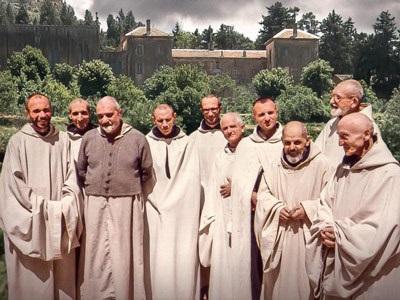
Jan 23, 2017 | Focolare Worldwide, Senza categoria
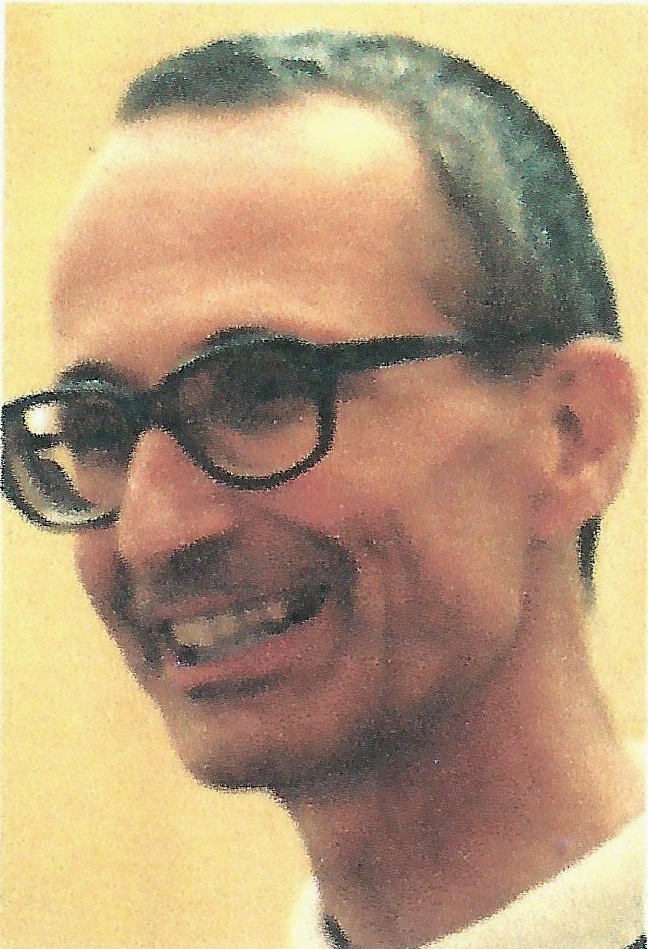 I came across a letter of Fr. Christian de Chergé a few days ago, on his 20th death anniversary. Christian was the Prior of the community of Trappist monks of the monastery of Nostra Signora dell’Atlas in Tibhirine (90 km from Algiers). In 1996, he and six other monks were kidnapped and then killed. On 1 August, Bishop Pierre Claverie, the Bishop of Orano was killed. That was really a “black decade,” as people called the civil war that exploded in the1990s. The monks were French and like the other “foreigners” were the direct targets of the “ mountain brothers,” name that referred to all those who had gone into hiding to take up their arms following the annulment of the 1992 elections. The Islamic Salvation Front, a political party that was dispersed and declared illegal, was about to win the elections. In my mind I often see their smiling faces, during those moments we lived together. We all took part in that particular vocation of the Church in that country, to which we felt we had been sent to testify to the Gospel, at the service of those people. It was a simple, poor Church, but its testimony shone in the hearts of many friends, mostly Muslims. Already then in Algiers, 99.99% of the population followed Islam. The Archbishop of Algiers, Paul Desfarges, said that, “The Church is for the people, a Church of Encounters.” But going back to the letter of 3 December 1994, it seemed to me like meeting Christian once again, or one of the monks in our focolare house in Tlemcen, where they used to spend a night, to then resume the journey towards the monastery they were about to found in Fèz, Morocco. Those were evenings of intense dialogue and joy of getting together, feeling like brothers and of sharing and understanding, in this mutual commitment toward the people that hosted us. Even if we had different callings, our hearts beat in unison.
I came across a letter of Fr. Christian de Chergé a few days ago, on his 20th death anniversary. Christian was the Prior of the community of Trappist monks of the monastery of Nostra Signora dell’Atlas in Tibhirine (90 km from Algiers). In 1996, he and six other monks were kidnapped and then killed. On 1 August, Bishop Pierre Claverie, the Bishop of Orano was killed. That was really a “black decade,” as people called the civil war that exploded in the1990s. The monks were French and like the other “foreigners” were the direct targets of the “ mountain brothers,” name that referred to all those who had gone into hiding to take up their arms following the annulment of the 1992 elections. The Islamic Salvation Front, a political party that was dispersed and declared illegal, was about to win the elections. In my mind I often see their smiling faces, during those moments we lived together. We all took part in that particular vocation of the Church in that country, to which we felt we had been sent to testify to the Gospel, at the service of those people. It was a simple, poor Church, but its testimony shone in the hearts of many friends, mostly Muslims. Already then in Algiers, 99.99% of the population followed Islam. The Archbishop of Algiers, Paul Desfarges, said that, “The Church is for the people, a Church of Encounters.” But going back to the letter of 3 December 1994, it seemed to me like meeting Christian once again, or one of the monks in our focolare house in Tlemcen, where they used to spend a night, to then resume the journey towards the monastery they were about to found in Fèz, Morocco. Those were evenings of intense dialogue and joy of getting together, feeling like brothers and of sharing and understanding, in this mutual commitment toward the people that hosted us. Even if we had different callings, our hearts beat in unison.  That atmosphere of danger surrounding us, encouraged us to go ahead. In fact, there was talk about a possible momentous departure of the members of the focolare of Tlemcen, which then did not occur. And Christian had written: «We all thought that you would stay longer to testify to a convivial offer, a boundless sharing of life, and a friendly openness that enables our hearts to vibrate in unison beyond the barriers of religious affiliations. You made the message of the Gospel your very own and you have deeply imprinted this message among us. And we rejoice with you for this greater humanity which your Charism has given to our Church. It was such a joy to meet at your “focolare” house. Many monks were able to make use of your hospitality when they passed through on their way to Fez. All of us still savour the thought of experiencing it all again! In these times we all need to be able to count on this “fire” kept alive in the common room. It will be a bit colder at Christmas if you will no longer be here… Our lives are in God’s hands… and our motives to remain, conform to those that have allowed us to live here. For you, as for us, the situation has not changed. THANKS once again to each of you and our fraternal communion today and for always. Christian». We had talked about the courage to remain… but for those who, like us had lived that harsh situation in person, I would rather speak of the courage to remain faithful to a calling and share it with a section of humanity, which we already felt an integral part of. It was a Fidelity of love. In the hearts of those who knew the monks, Bishop Claverie, or the other nuns and religious killed in those years in Algiers, they continue to speak to us of the Gospel lived and deep friendships with a people they had made their own. Giorgio Antoniazzi
That atmosphere of danger surrounding us, encouraged us to go ahead. In fact, there was talk about a possible momentous departure of the members of the focolare of Tlemcen, which then did not occur. And Christian had written: «We all thought that you would stay longer to testify to a convivial offer, a boundless sharing of life, and a friendly openness that enables our hearts to vibrate in unison beyond the barriers of religious affiliations. You made the message of the Gospel your very own and you have deeply imprinted this message among us. And we rejoice with you for this greater humanity which your Charism has given to our Church. It was such a joy to meet at your “focolare” house. Many monks were able to make use of your hospitality when they passed through on their way to Fez. All of us still savour the thought of experiencing it all again! In these times we all need to be able to count on this “fire” kept alive in the common room. It will be a bit colder at Christmas if you will no longer be here… Our lives are in God’s hands… and our motives to remain, conform to those that have allowed us to live here. For you, as for us, the situation has not changed. THANKS once again to each of you and our fraternal communion today and for always. Christian». We had talked about the courage to remain… but for those who, like us had lived that harsh situation in person, I would rather speak of the courage to remain faithful to a calling and share it with a section of humanity, which we already felt an integral part of. It was a Fidelity of love. In the hearts of those who knew the monks, Bishop Claverie, or the other nuns and religious killed in those years in Algiers, they continue to speak to us of the Gospel lived and deep friendships with a people they had made their own. Giorgio Antoniazzi

Jan 22, 2017 | Non categorizzato
 Chiara Lubich visited Germany in 1998, from 1st November to 13 December, spending time at Aachen, Münster, Augsburg and then in Berlin at the invitation of the Evangelical Church community. In her address, part of which is published below. We present several excerpts from her speech given on November 19th at the the Berlin Memorial Church, in which she indicates the law of love as the royal road to Christian unity and dialogue with all believers. “The plain fact is that if we Christians now, at the dawn of the third millennium, take a good look back at our 2000 years of history and particularly at the last millennium, we cannot fail to be saddened by what we see: a painful succession of misunderstandings, arguments and conflicts. These have caused many rips and tears in the “seamless robe of Christ”, which is His Church. And whose fault is this? Without doubt, countless historical, cultural, geo-political, social factors have played their part …. But could it also be due to a weakening among Christians of their characteristic unifying bond of love? I think so. In fact, when we try to address the painful situation we find ourselves in, we must keep in mind the guiding principle of our common faith: God Love who calls us too to love. In these our times it is God Love who, in some way, must return once more to reveal Himself also to the Churches we are part of. It’s true that we can’t really know how to love others unless we have experienced being deeply loved ourselves, unless all Christians are convinced of how much God loves us. He loves us as individual Christians and also as Church. He loves the Church in so far as it has been faithful to God’s plan for it, but also – and herein lies the wonder of God’s mercy – He loves the Church even when it has not corresponded to that plan and has allowed divisions to occur, as long as now it is seeking for full communion with the other Churches. This is the consoling conviction that led John Paul II, trusting in the One who can draw good from what is bad, to reflect: “Could it not be that the divisions have also been a way which has led and is leading the Church to discover the many treasures contained in the Gospel of Christ and in the redemption he brought about? Perhaps such a wealth would not have come to light otherwise.” So, belief in God who is Love, also for the Church. But if God loves us, we cannot remain inert in the face of such divine benevolence. As true sons and daughters, we must respond to His love with love, individually and as Church. Perhaps we can say that the Churches over the centuries may have hardened somewhat within themselves against the relentless tide of indifference, of misunderstanding, if not of actual hatred between them. So now we need a supplement of love in each one; we would need, in fact, a whole tidal wave of love to invade all Christianity. Love towards the other Churches is what we’re talking about here, together with mutual love among the Churches: a love that enables each one to be a gift for the others, so that it is possible to hope in a Church of the future which is one, in which one alone is the truth, expressed in many ways, observed from different perspectives, made even more beautiful by the variety of interpretations. It’s not that any of the Churches would have to “die” (as some may think), rather each one will have to be “reborn” in unity. And to live in this Church of the future, in full communion, will be such a wonderful, miraculous reality, that it cannot fail to be noticed by the whole world.” More Chiara Lubic Center
Chiara Lubich visited Germany in 1998, from 1st November to 13 December, spending time at Aachen, Münster, Augsburg and then in Berlin at the invitation of the Evangelical Church community. In her address, part of which is published below. We present several excerpts from her speech given on November 19th at the the Berlin Memorial Church, in which she indicates the law of love as the royal road to Christian unity and dialogue with all believers. “The plain fact is that if we Christians now, at the dawn of the third millennium, take a good look back at our 2000 years of history and particularly at the last millennium, we cannot fail to be saddened by what we see: a painful succession of misunderstandings, arguments and conflicts. These have caused many rips and tears in the “seamless robe of Christ”, which is His Church. And whose fault is this? Without doubt, countless historical, cultural, geo-political, social factors have played their part …. But could it also be due to a weakening among Christians of their characteristic unifying bond of love? I think so. In fact, when we try to address the painful situation we find ourselves in, we must keep in mind the guiding principle of our common faith: God Love who calls us too to love. In these our times it is God Love who, in some way, must return once more to reveal Himself also to the Churches we are part of. It’s true that we can’t really know how to love others unless we have experienced being deeply loved ourselves, unless all Christians are convinced of how much God loves us. He loves us as individual Christians and also as Church. He loves the Church in so far as it has been faithful to God’s plan for it, but also – and herein lies the wonder of God’s mercy – He loves the Church even when it has not corresponded to that plan and has allowed divisions to occur, as long as now it is seeking for full communion with the other Churches. This is the consoling conviction that led John Paul II, trusting in the One who can draw good from what is bad, to reflect: “Could it not be that the divisions have also been a way which has led and is leading the Church to discover the many treasures contained in the Gospel of Christ and in the redemption he brought about? Perhaps such a wealth would not have come to light otherwise.” So, belief in God who is Love, also for the Church. But if God loves us, we cannot remain inert in the face of such divine benevolence. As true sons and daughters, we must respond to His love with love, individually and as Church. Perhaps we can say that the Churches over the centuries may have hardened somewhat within themselves against the relentless tide of indifference, of misunderstanding, if not of actual hatred between them. So now we need a supplement of love in each one; we would need, in fact, a whole tidal wave of love to invade all Christianity. Love towards the other Churches is what we’re talking about here, together with mutual love among the Churches: a love that enables each one to be a gift for the others, so that it is possible to hope in a Church of the future which is one, in which one alone is the truth, expressed in many ways, observed from different perspectives, made even more beautiful by the variety of interpretations. It’s not that any of the Churches would have to “die” (as some may think), rather each one will have to be “reborn” in unity. And to live in this Church of the future, in full communion, will be such a wonderful, miraculous reality, that it cannot fail to be noticed by the whole world.” More Chiara Lubic Center
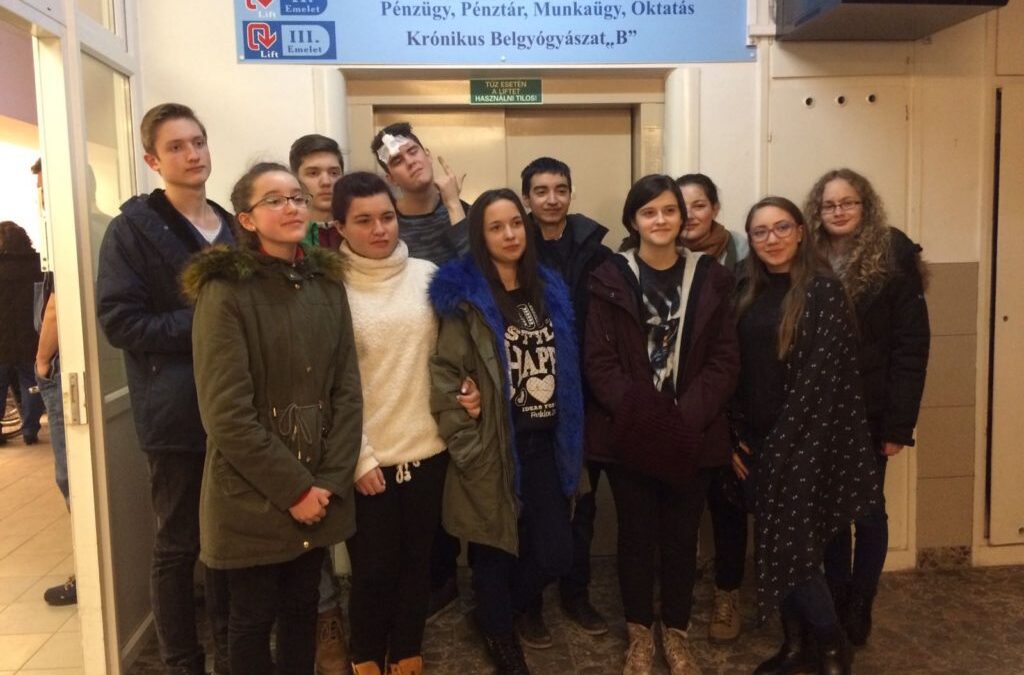
Jan 21, 2017 | Non categorizzato
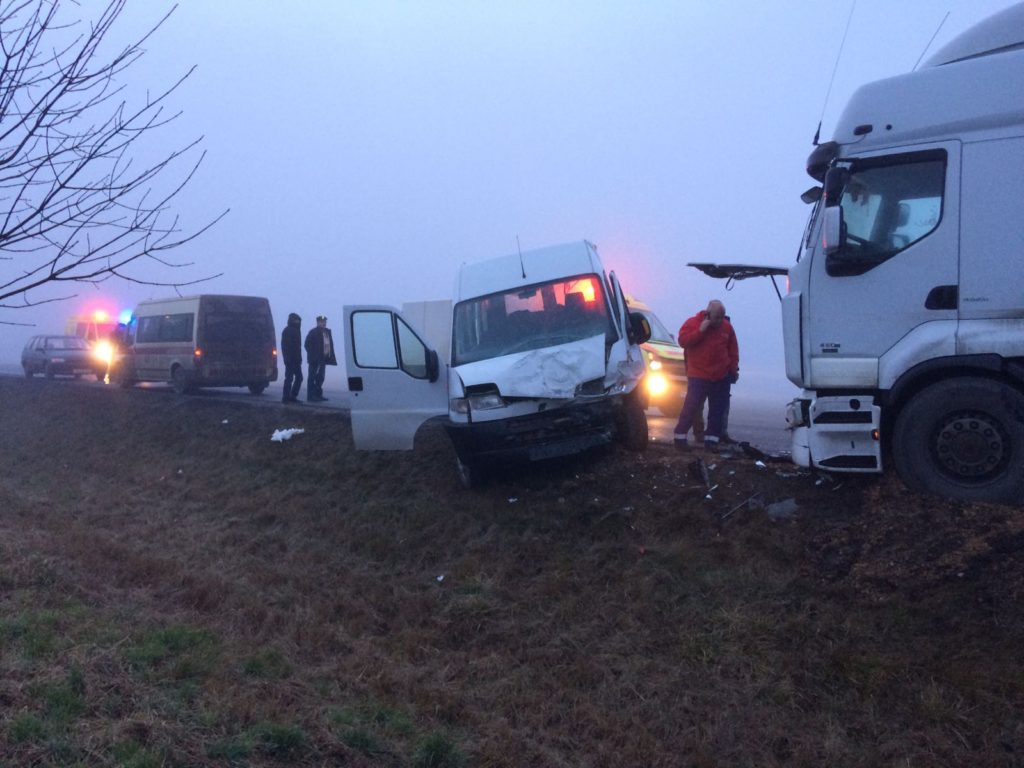 Accompanied by some of their assistants, thirteen Gen 3 were on their way to Focolare town in Krizevci, north Croatia. There was an atmosphere of serenity and great expectation during the trip. The theme of their congress would be challenging and demanding: Jesus Forsaken. The topic of suffering and pain is key to knowing how to live in a world of young people where so many seek well-being and false happiness. It was a long drive through Hungary. Towards evening some of the boys dozed off. Suddenly, the sound of horns and, in the midst of thick fog, a large truck just before the frightening crash. Teia, Adelin, Delia, Eve, Bea, Iulian and the other boys were still alive, but their shock was great. “The first car stopped just after the accident,” recounts one of the assistants. “It was an emergency vehicle. They had just finished their shift and were on their way back to the base. How could we not see God’s love in that? The police were excellent: they welcomed us in the largest room they had at police headquarters until another bus came to get us. They told us we were lucky to get out alive . . . then they brought us pizza and sweets.” Once we got to hospital, the boys were divided between wards. Bea: “At that moment we felt lost, we didn’t understand Hungarian, we were frightened and alone. We didn’t know what was happening and didn’t know how to answer the doctors’ questions. Some of us were comepletely isolated from the others, and alone like Jesus Forsaken. It was like meeting him and living him.” Eve: “Later on, people came and tranlsated for us. One focolarina from Romania was supposed to arrive in Hungary the previous day, but she had missed the bus. She was in a nearby city when she learned of the accident. The driver had proposed to the passengers not to make other stops and to take her directly to hospital to drop her off before helping us. She told us that understood why she had missed the bus the day before.”
Accompanied by some of their assistants, thirteen Gen 3 were on their way to Focolare town in Krizevci, north Croatia. There was an atmosphere of serenity and great expectation during the trip. The theme of their congress would be challenging and demanding: Jesus Forsaken. The topic of suffering and pain is key to knowing how to live in a world of young people where so many seek well-being and false happiness. It was a long drive through Hungary. Towards evening some of the boys dozed off. Suddenly, the sound of horns and, in the midst of thick fog, a large truck just before the frightening crash. Teia, Adelin, Delia, Eve, Bea, Iulian and the other boys were still alive, but their shock was great. “The first car stopped just after the accident,” recounts one of the assistants. “It was an emergency vehicle. They had just finished their shift and were on their way back to the base. How could we not see God’s love in that? The police were excellent: they welcomed us in the largest room they had at police headquarters until another bus came to get us. They told us we were lucky to get out alive . . . then they brought us pizza and sweets.” Once we got to hospital, the boys were divided between wards. Bea: “At that moment we felt lost, we didn’t understand Hungarian, we were frightened and alone. We didn’t know what was happening and didn’t know how to answer the doctors’ questions. Some of us were comepletely isolated from the others, and alone like Jesus Forsaken. It was like meeting him and living him.” Eve: “Later on, people came and tranlsated for us. One focolarina from Romania was supposed to arrive in Hungary the previous day, but she had missed the bus. She was in a nearby city when she learned of the accident. The driver had proposed to the passengers not to make other stops and to take her directly to hospital to drop her off before helping us. She told us that understood why she had missed the bus the day before.” 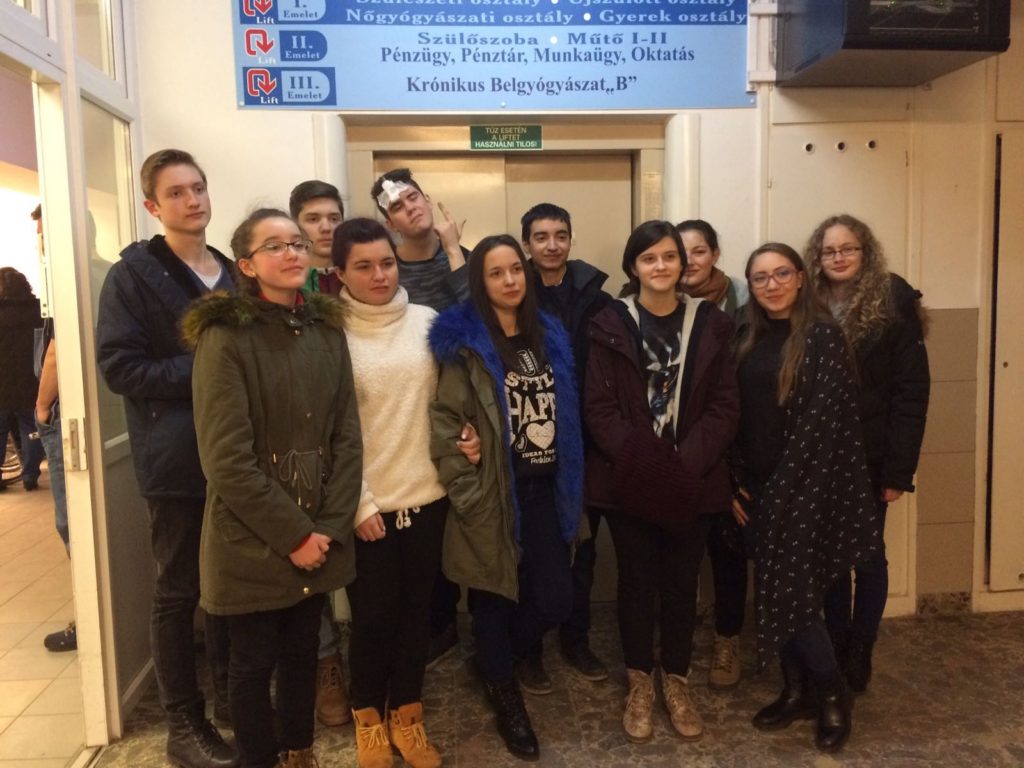 Rozi: “The doctors told us we had to stay in hospital for a few more examinations. I began to telelphone the boys’ parents. Many of them were 15 hours away from where we were. Moreover, the Gen3 were saying that they wanted to continue on to the congress. In the end we obtained permission to leave the hospital with the signature of their parents and without spending a cent.” Delia: “At that point we weren’t sure about continuing our journey, but we realized that such precious things always come with a cost.” Some days later seven boys arrived at Mariapolis Faro. The experience of fear and pain, but also of intense unity among them, showed that the theme of the congress had already become something real for them. Iulian recounts: “We all just knew that whatever happens to us in life, it’s worth it to abandon ourselves totallyto God. Jesus Forsaken unites us in an incredible way! We were allowed to live because God has a plan for us: a divine adventure awaits us.” Compiled by Chiara Favotti
Rozi: “The doctors told us we had to stay in hospital for a few more examinations. I began to telelphone the boys’ parents. Many of them were 15 hours away from where we were. Moreover, the Gen3 were saying that they wanted to continue on to the congress. In the end we obtained permission to leave the hospital with the signature of their parents and without spending a cent.” Delia: “At that point we weren’t sure about continuing our journey, but we realized that such precious things always come with a cost.” Some days later seven boys arrived at Mariapolis Faro. The experience of fear and pain, but also of intense unity among them, showed that the theme of the congress had already become something real for them. Iulian recounts: “We all just knew that whatever happens to us in life, it’s worth it to abandon ourselves totallyto God. Jesus Forsaken unites us in an incredible way! We were allowed to live because God has a plan for us: a divine adventure awaits us.” Compiled by Chiara Favotti

 The situation seemed absurd. I was taking the items I needed off the shelf at the supermarket, when I felt a trolley bumping into me, hitting me in the leg. I felt a stabbing pain but I managed not to cry out. I had a look around to see what was happening. A woman with a little boy in her arms was angrily staring at me, without a trace of regret or apology. There was certainly enough room for her to go by me without bumping into me but, between the cell phone and the screaming baby, the carriage and the box she was dropping, it was in some way understandable that such an accident could have happened. There and then I responded with words that weren’t exactly polite and let her go by. Only that things don’t always go as you would suppose they would: I turned into another aisle and we crossed paths again: “You again?” she said to me in a tone that was anything but friendly. “Oh, yeah, me again! I’m shopping just like you; maybe we’ll see each other again… Wouldn’t it be better to finish your telephone conversation and do one thing at a time?” At that point she really lost it – big time! She suddenly felt the right to launch comments and insults towards complete strangers like me, and so forth. No one was spared. Just to make things worse the little one began to shout, the cell phone fell to the ground and the box fell and emptied its contents all over the floor. It was too much for the woman who ended up sitting on the floor in tears. Without hesitation I began to gather her things and calm the little boy, by trying to distract him with a set of keys I had in my pocket. In the end the little one began to laugh, and the lady calmed down. Naturally, shoppers, sale clerks and all kinds of other people drew near to see what all the chaos was about, but finding that things had calmed down, they walked away and left us alone. Who knows what they were thinking! The fact is that I helped the woman to stand up and I asked her if she still had to buy many things. She answered by showing me a shopping list she was holding in her hand. I asked her to wait there while I went to buy the things she was still missing. Of course, I did have to change some items two or three times before finding the right brand but, in the end, I did it. Once all the items on the shopping list were in the carriage, the woman looked at me with her big eyes and spoke timidly: “Thank you, and forgive me for acting the way I did before. I don’t know which way to turn. My husband lost his job and we don’t know how we’re going to make it to the end of the month. It feels like the world is falling down around us. So I’ve become angry and aggressive.” I obviously didn’t have an immediate solution, but it came to me spontaneously to tell her: “Look, I don’t have an answer, but what I can do is pray for you and your husband, asking that he can find a job.” She looked at me a bit surprised and answered: “I’m not able to believe in God, but, anyway… thank you!” In the days that followed I prayed frequently and intensely for that family. One morning, I met the woman again at the supermarket. She saw me from afar and came up to me: “Imagine, against all odds, my husband was able to get an interview with a company and, yes, they hired him! It’s not the ideal position, but it’s permanent with a reasonable salary. Could it be because of your promise to pray for us? When my husband told me I immediately thought of you, of your prayers. Thank you so much! Could it be that God does exist?” “I firmly believe so and hope that one day you’ll get to meet him!” I told her. We said goodbye and each of us went her own way. A sudden gratitude began to fill my heart and a prayer to God that one day she would get to meet him too. From: Kerber, Urs. La vida se hace camino, (Buenos Aires, Ciudad Nueva, 2016), 16-17.
The situation seemed absurd. I was taking the items I needed off the shelf at the supermarket, when I felt a trolley bumping into me, hitting me in the leg. I felt a stabbing pain but I managed not to cry out. I had a look around to see what was happening. A woman with a little boy in her arms was angrily staring at me, without a trace of regret or apology. There was certainly enough room for her to go by me without bumping into me but, between the cell phone and the screaming baby, the carriage and the box she was dropping, it was in some way understandable that such an accident could have happened. There and then I responded with words that weren’t exactly polite and let her go by. Only that things don’t always go as you would suppose they would: I turned into another aisle and we crossed paths again: “You again?” she said to me in a tone that was anything but friendly. “Oh, yeah, me again! I’m shopping just like you; maybe we’ll see each other again… Wouldn’t it be better to finish your telephone conversation and do one thing at a time?” At that point she really lost it – big time! She suddenly felt the right to launch comments and insults towards complete strangers like me, and so forth. No one was spared. Just to make things worse the little one began to shout, the cell phone fell to the ground and the box fell and emptied its contents all over the floor. It was too much for the woman who ended up sitting on the floor in tears. Without hesitation I began to gather her things and calm the little boy, by trying to distract him with a set of keys I had in my pocket. In the end the little one began to laugh, and the lady calmed down. Naturally, shoppers, sale clerks and all kinds of other people drew near to see what all the chaos was about, but finding that things had calmed down, they walked away and left us alone. Who knows what they were thinking! The fact is that I helped the woman to stand up and I asked her if she still had to buy many things. She answered by showing me a shopping list she was holding in her hand. I asked her to wait there while I went to buy the things she was still missing. Of course, I did have to change some items two or three times before finding the right brand but, in the end, I did it. Once all the items on the shopping list were in the carriage, the woman looked at me with her big eyes and spoke timidly: “Thank you, and forgive me for acting the way I did before. I don’t know which way to turn. My husband lost his job and we don’t know how we’re going to make it to the end of the month. It feels like the world is falling down around us. So I’ve become angry and aggressive.” I obviously didn’t have an immediate solution, but it came to me spontaneously to tell her: “Look, I don’t have an answer, but what I can do is pray for you and your husband, asking that he can find a job.” She looked at me a bit surprised and answered: “I’m not able to believe in God, but, anyway… thank you!” In the days that followed I prayed frequently and intensely for that family. One morning, I met the woman again at the supermarket. She saw me from afar and came up to me: “Imagine, against all odds, my husband was able to get an interview with a company and, yes, they hired him! It’s not the ideal position, but it’s permanent with a reasonable salary. Could it be because of your promise to pray for us? When my husband told me I immediately thought of you, of your prayers. Thank you so much! Could it be that God does exist?” “I firmly believe so and hope that one day you’ll get to meet him!” I told her. We said goodbye and each of us went her own way. A sudden gratitude began to fill my heart and a prayer to God that one day she would get to meet him too. From: Kerber, Urs. La vida se hace camino, (Buenos Aires, Ciudad Nueva, 2016), 16-17.


 Immersed in this metropolis, the
Immersed in this metropolis, the 

 Federico: An Italian and Uruguayan: what are the chances? Yet we happened to meet, seven years ago, at a Latin American center in Rome. I was there to give a hand running things, she to speak her language a bit. Our eyes met and we started to build a home together. Economic constraints, however, pushed us to leave the big city for my parents’ small village, especially because one of our greatest wishes was about to come true: our son was on the way. There was much happiness, but the stress of the birth and the rapid life changes didn’t give us any time to breathe. Laura: As if that were not enough, my mother, who was taking care of my invalid father and my little brother, became seriously ill. I needed to immediately go to
Federico: An Italian and Uruguayan: what are the chances? Yet we happened to meet, seven years ago, at a Latin American center in Rome. I was there to give a hand running things, she to speak her language a bit. Our eyes met and we started to build a home together. Economic constraints, however, pushed us to leave the big city for my parents’ small village, especially because one of our greatest wishes was about to come true: our son was on the way. There was much happiness, but the stress of the birth and the rapid life changes didn’t give us any time to breathe. Laura: As if that were not enough, my mother, who was taking care of my invalid father and my little brother, became seriously ill. I needed to immediately go to 

 How important was it for you to meet
How important was it for you to meet 

 Last January, a
Last January, a  Sikhs and members of the Focolare recently took part together in an interreligious conference. Bhai Sahib Ji presented a project for promoting forgiveness and reconciliation. The event was an opportunity to strengthen friendships between members of different religions and beliefs, who now continue to stay in contact.
Sikhs and members of the Focolare recently took part together in an interreligious conference. Bhai Sahib Ji presented a project for promoting forgiveness and reconciliation. The event was an opportunity to strengthen friendships between members of different religions and beliefs, who now continue to stay in contact. 


 For three days, the school completely changed. Moments of reflection and going in depth were joined with tangible experiences. Divided into groups, students of different ages lived side by side with teachers and those attending, sharing the various moments of the day: cooking, washing dishes, tidying up the meeting hall, cleaning toilets and the school playground. For some it was their first time; they had never done anything like it. Even the school’s principal washed dishes! A large book was prepared for the students to capture their comments. It tells of three days of true living. The retreat changed their lives, they say. “The unity we lived during those days struck us from the very first moment that you set foot in our school.” It was a unity that the words of
For three days, the school completely changed. Moments of reflection and going in depth were joined with tangible experiences. Divided into groups, students of different ages lived side by side with teachers and those attending, sharing the various moments of the day: cooking, washing dishes, tidying up the meeting hall, cleaning toilets and the school playground. For some it was their first time; they had never done anything like it. Even the school’s principal washed dishes! A large book was prepared for the students to capture their comments. It tells of three days of true living. The retreat changed their lives, they say. “The unity we lived during those days struck us from the very first moment that you set foot in our school.” It was a unity that the words of 



 “We find ourselves here in countries of the United Arab Emirates due to work,” Claudia says. “Our workplaces are often strongly competitive, and it is difficult to integrate because there is little time for relationships that are simple and authentic. “The Catholic Church in Dubai is young, lively, joyous and not overly complicated. More than 2,000 faithful participate in and focus on daily mass – mostly from the Philippines, Pakistan and India. “Our local Focolare community is also made up mostly of migrants, and we try to give witness to the Gospel in the circles we move through, bringing love and unity around us. There are many who know about and live the
“We find ourselves here in countries of the United Arab Emirates due to work,” Claudia says. “Our workplaces are often strongly competitive, and it is difficult to integrate because there is little time for relationships that are simple and authentic. “The Catholic Church in Dubai is young, lively, joyous and not overly complicated. More than 2,000 faithful participate in and focus on daily mass – mostly from the Philippines, Pakistan and India. “Our local Focolare community is also made up mostly of migrants, and we try to give witness to the Gospel in the circles we move through, bringing love and unity around us. There are many who know about and live the 

 Ugandan business woman Rita Najjingo was among the 1,200 business owners and researchers of economy who were welcomed by Pope Francis on February 4, twenty five years from the start of the
Ugandan business woman Rita Najjingo was among the 1,200 business owners and researchers of economy who were welcomed by Pope Francis on February 4, twenty five years from the start of the 






















 Excited but secure in their performance, they gave the best of themselves in the choreographies, songs, dances and theatre in a way that drew in the audience. Above all, they lived an experience that was unique unto itself, an experience that doesn’t conceive of “walls” and that lifted up the differences and diversity, showing how marginalization can be overcome. “The day after had a sense of nostalgia, but now it was different: It had the sense of a challenge! Good Start to all off us, small warriors on the outskirts!” wrote a teacher on her Facebook page, who helped promote the event. That’s the dream of those who interact with these young people every day, standing against marginalization and uneasiness with creativity and positive stimulation, helping others to not remain closed in their own everyday environments, promoting an inclusive environment at school that embraces all the sides of a person.
Excited but secure in their performance, they gave the best of themselves in the choreographies, songs, dances and theatre in a way that drew in the audience. Above all, they lived an experience that was unique unto itself, an experience that doesn’t conceive of “walls” and that lifted up the differences and diversity, showing how marginalization can be overcome. “The day after had a sense of nostalgia, but now it was different: It had the sense of a challenge! Good Start to all off us, small warriors on the outskirts!” wrote a teacher on her Facebook page, who helped promote the event. That’s the dream of those who interact with these young people every day, standing against marginalization and uneasiness with creativity and positive stimulation, helping others to not remain closed in their own everyday environments, promoting an inclusive environment at school that embraces all the sides of a person.




 In his message to the extremely attentive gathering, Pope Francis expressed hope and recommendations on three main points. The first concerns money. “It is very important that at the centre of the economy of communion there be the communion of your profits. The Economy of Communion is also the communion of profits, an expression of the communion of life”. “Money”, he said “becomes an idol when it becomes the aim (…). It was Jesus who defined money as a ‘master’: ‘No man can serve two masters”. And he continued: “Thus, one understands the ethical and spiritual value of your choice to pool profits. The best and most practical way to avoid making an idol of money is to share it with others, above all with the poor (…). When you share and donate your profits, you are performing an act of lofty spirituality, saying to money through your deeds: you are not God, you are not lord, you are not master!” The second concerns poverty. “The principal ethical dilemma of this capitalism is the creation of discarded people, then trying to hide them or make sure they are no longer seen (…). Aircraft pollute the atmosphere, but, with a small part of the cost of the ticket, they will plant trees to compensate for the damage created. Gambling companies finance campaigns to care for the pathological gamblers that they create. And the day that the weapons industry finances hospitals to care for the children mutilated by their bombs, the system will have reached its pinnacle. This is hypocrisy!”. Faced with this abominable situation “the Economy of Communion, if it wants to be faithful to its charism, must not only care for victims, but build a system where there are ever fewer victims, where, possibly, there may no longer be any. As long as the economy still produces one victim and there is still a single discarded person, communion has not yet been realized; the celebration of universal fraternity is not full”.
In his message to the extremely attentive gathering, Pope Francis expressed hope and recommendations on three main points. The first concerns money. “It is very important that at the centre of the economy of communion there be the communion of your profits. The Economy of Communion is also the communion of profits, an expression of the communion of life”. “Money”, he said “becomes an idol when it becomes the aim (…). It was Jesus who defined money as a ‘master’: ‘No man can serve two masters”. And he continued: “Thus, one understands the ethical and spiritual value of your choice to pool profits. The best and most practical way to avoid making an idol of money is to share it with others, above all with the poor (…). When you share and donate your profits, you are performing an act of lofty spirituality, saying to money through your deeds: you are not God, you are not lord, you are not master!” The second concerns poverty. “The principal ethical dilemma of this capitalism is the creation of discarded people, then trying to hide them or make sure they are no longer seen (…). Aircraft pollute the atmosphere, but, with a small part of the cost of the ticket, they will plant trees to compensate for the damage created. Gambling companies finance campaigns to care for the pathological gamblers that they create. And the day that the weapons industry finances hospitals to care for the children mutilated by their bombs, the system will have reached its pinnacle. This is hypocrisy!”. Faced with this abominable situation “the Economy of Communion, if it wants to be faithful to its charism, must not only care for victims, but build a system where there are ever fewer victims, where, possibly, there may no longer be any. As long as the economy still produces one victim and there is still a single discarded person, communion has not yet been realized; the celebration of universal fraternity is not full”.  The third point concerns the future. «These 25 years of your history say that communion and business can exist and grow together” , an experience limited to a small number of businesses when compared to the world’s great capital, “but the changes in the order of the spirit and therefore of life are not linked to big numbers. The small flock, the lamp, a coin, a lamb, a pearl, salt, leaven: these are the images of the Kingdom we encounter in the Gospels (…). It is not necessary to be in a large group to change our life: suffice it that the sale and the leaven do not deteriorate (…). Salt does not do its job by increasing in quantity – instead too much salt makes the meal salty – but by saving its ‘spirit’, its quality”. While recalling the time when there were no refrigerators and the mother dough was shared to make bread, the Pope encouraged the Economy of Communion entrepreneurs “not to lose the active ingredient, the ‘enzyme’ of communion”, by living “reciprocity”. “Communion is not only the sharing but also the multiplying goods, the creation of new bread, of new goods, of new Good with a capital ‘G’”. He invited those present to: “Give it to everyone, firstly to the poor and the young (…). Capitalism knows philanthropy, not communion”. At the end of his speech Pope Francis said: “You already do these things. But you can share more profits in order to combat idolatry, change structures in order to prevent the creation of victims ‘ and discarded people; give more of your leaven so as to leaven the bread of many. May the ‘no’ to an economy that kills, become a ‘yes’ to an economy that lets live, because it shares, includes the poor, uses profits to create communion». «I hope you continue on your path, with courage, humilty, and joy…, continue to be the seed, salt and leaven of another economy: the economy of the Kingdom, where the rich know how to share their wealth, and the poor are called “blessed”. This new awareness makes one look ahead with joy and a renewed commitment.
The third point concerns the future. «These 25 years of your history say that communion and business can exist and grow together” , an experience limited to a small number of businesses when compared to the world’s great capital, “but the changes in the order of the spirit and therefore of life are not linked to big numbers. The small flock, the lamp, a coin, a lamb, a pearl, salt, leaven: these are the images of the Kingdom we encounter in the Gospels (…). It is not necessary to be in a large group to change our life: suffice it that the sale and the leaven do not deteriorate (…). Salt does not do its job by increasing in quantity – instead too much salt makes the meal salty – but by saving its ‘spirit’, its quality”. While recalling the time when there were no refrigerators and the mother dough was shared to make bread, the Pope encouraged the Economy of Communion entrepreneurs “not to lose the active ingredient, the ‘enzyme’ of communion”, by living “reciprocity”. “Communion is not only the sharing but also the multiplying goods, the creation of new bread, of new goods, of new Good with a capital ‘G’”. He invited those present to: “Give it to everyone, firstly to the poor and the young (…). Capitalism knows philanthropy, not communion”. At the end of his speech Pope Francis said: “You already do these things. But you can share more profits in order to combat idolatry, change structures in order to prevent the creation of victims ‘ and discarded people; give more of your leaven so as to leaven the bread of many. May the ‘no’ to an economy that kills, become a ‘yes’ to an economy that lets live, because it shares, includes the poor, uses profits to create communion». «I hope you continue on your path, with courage, humilty, and joy…, continue to be the seed, salt and leaven of another economy: the economy of the Kingdom, where the rich know how to share their wealth, and the poor are called “blessed”. This new awareness makes one look ahead with joy and a renewed commitment. 







 The program will focus on these themes: The absurdity of suffering on an individual and social level Living with suffering The value of suffering There will be input from various geographic regions and from various disciplines: psychology, medicine, philosophy, art, through personal experiences given by people of different age-groups. Bookings can be made through the Centre for Dialogue with Persons of no Religious Affiliation Focolare Movement, Via Frascati 306, 00040 Rocca di Papa (Rome), Italy Email:
The program will focus on these themes: The absurdity of suffering on an individual and social level Living with suffering The value of suffering There will be input from various geographic regions and from various disciplines: psychology, medicine, philosophy, art, through personal experiences given by people of different age-groups. Bookings can be made through the Centre for Dialogue with Persons of no Religious Affiliation Focolare Movement, Via Frascati 306, 00040 Rocca di Papa (Rome), Italy Email: 




 ration of the “Week of Prayer for Unity of Christians” at Havana was highlighted by a particular moment, the Ecumenical Youth Festival, at its third edition. Created with the aim of encouraging a more active participation of the youth in the ecumenical movement, the festival project began to take shape and became an annual meeting of young Christians of Havana. The “Week of Prayer” was enlivened by the youth sectors of the
ration of the “Week of Prayer for Unity of Christians” at Havana was highlighted by a particular moment, the Ecumenical Youth Festival, at its third edition. Created with the aim of encouraging a more active participation of the youth in the ecumenical movement, the festival project began to take shape and became an annual meeting of young Christians of Havana. The “Week of Prayer” was enlivened by the youth sectors of the 









